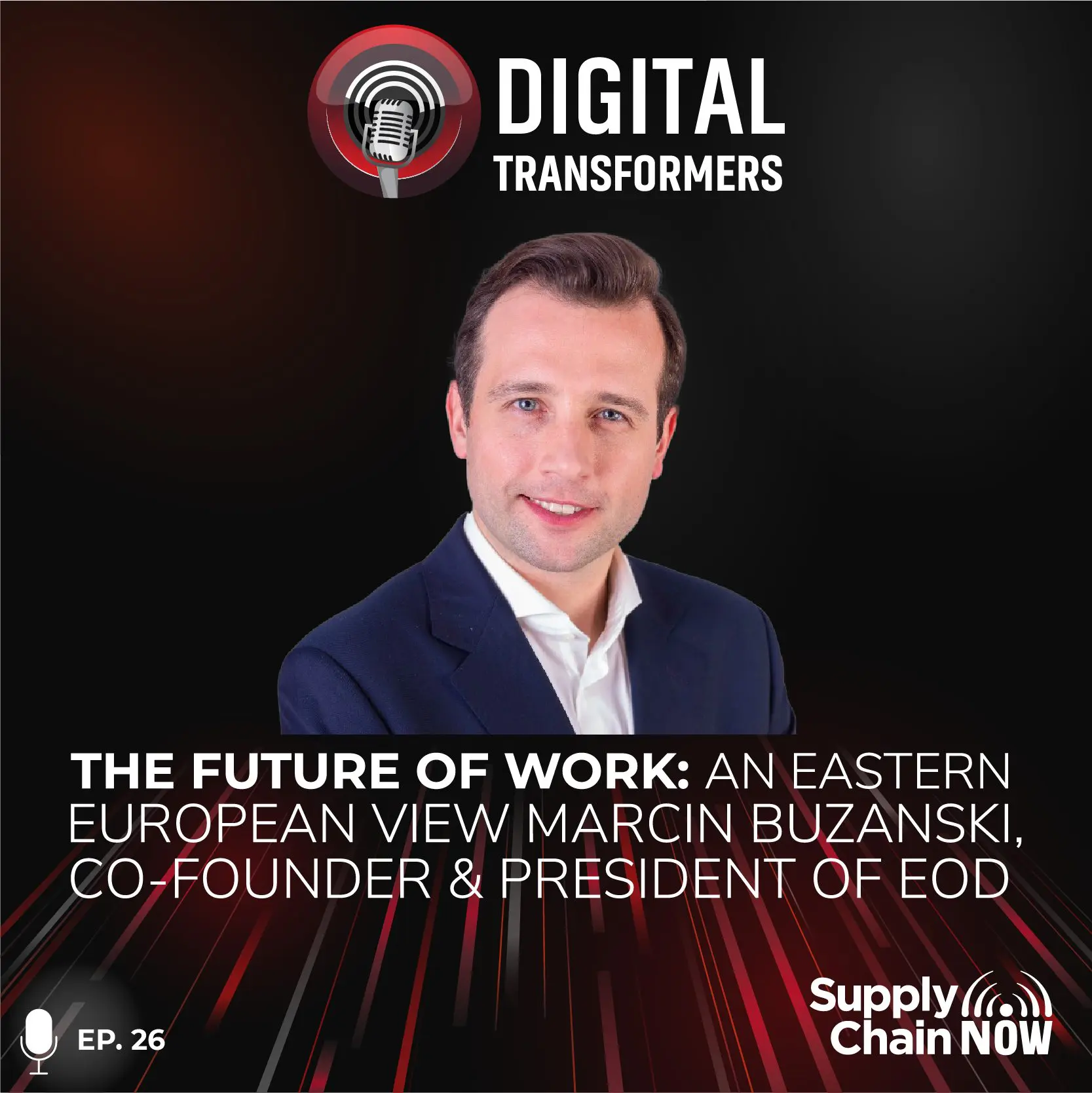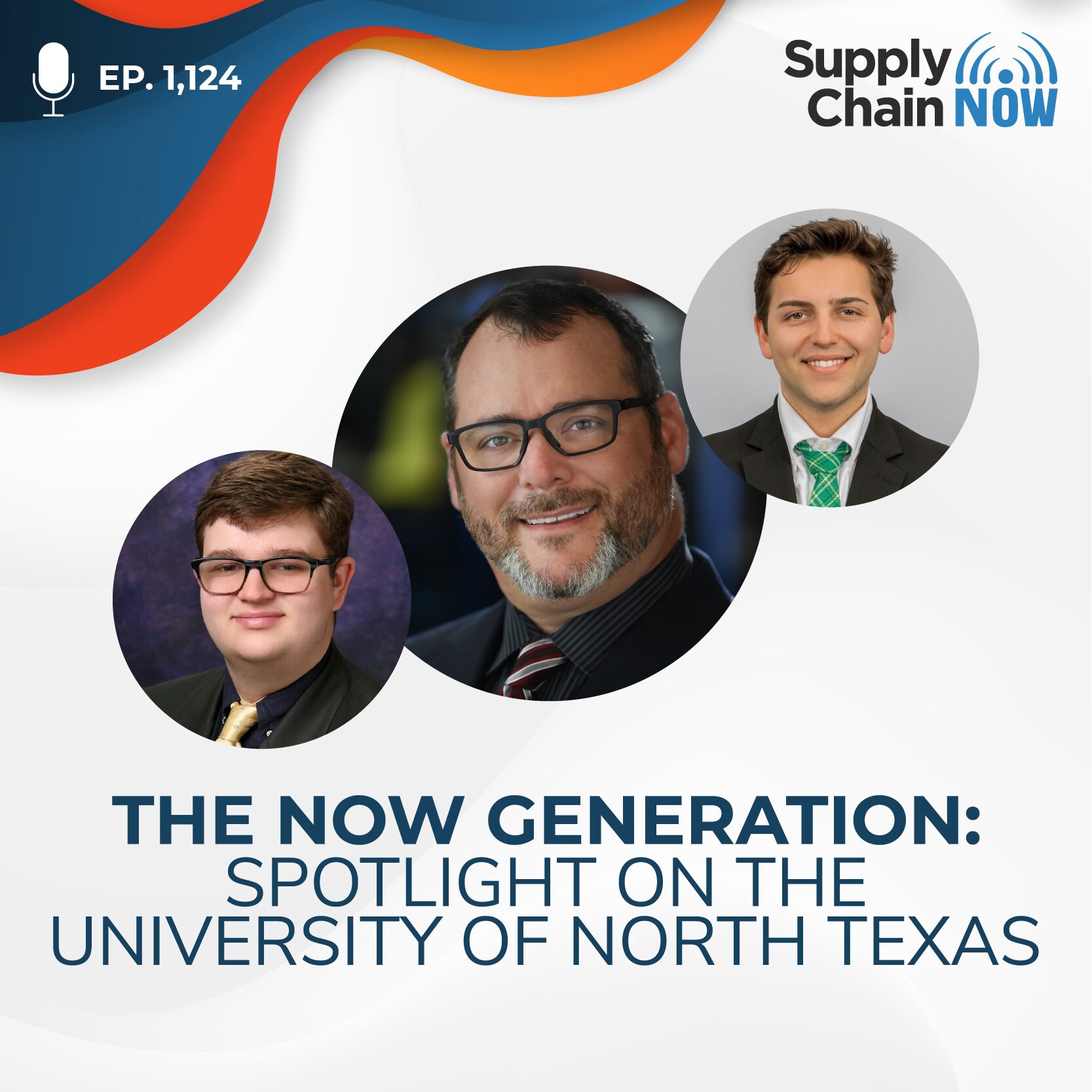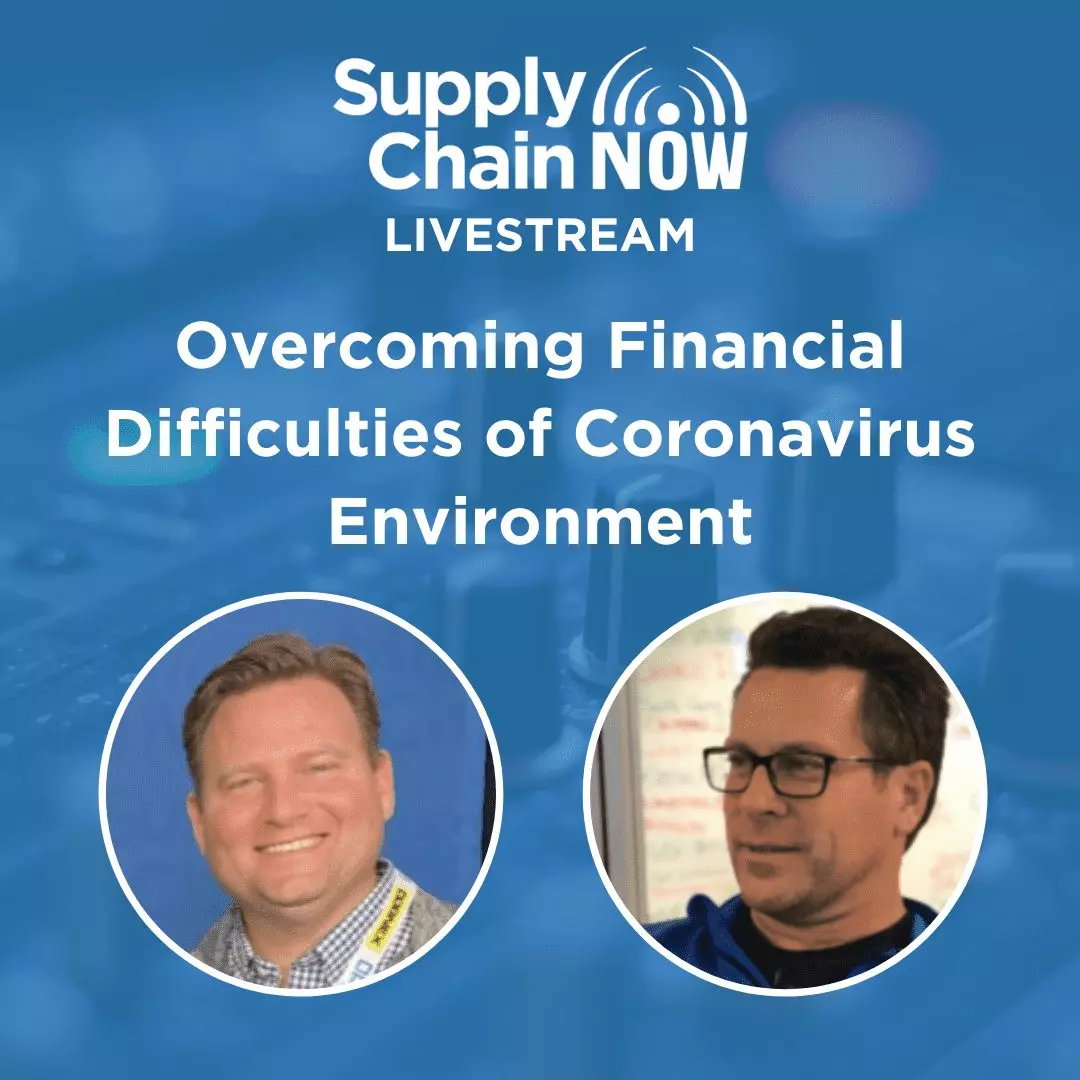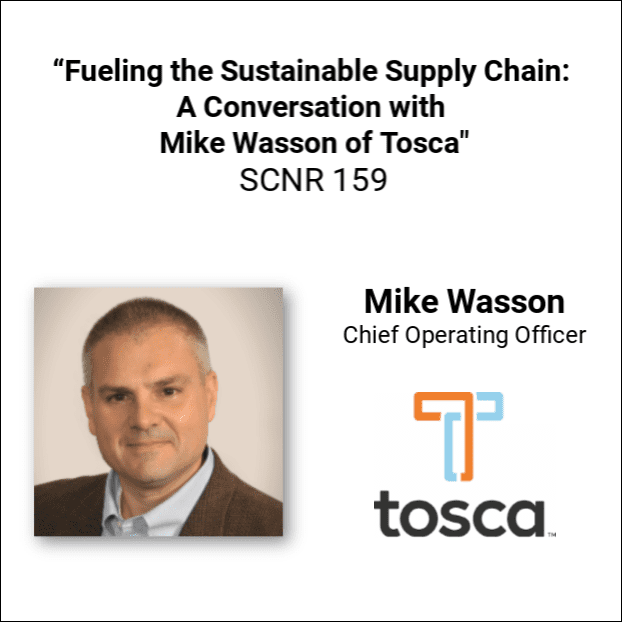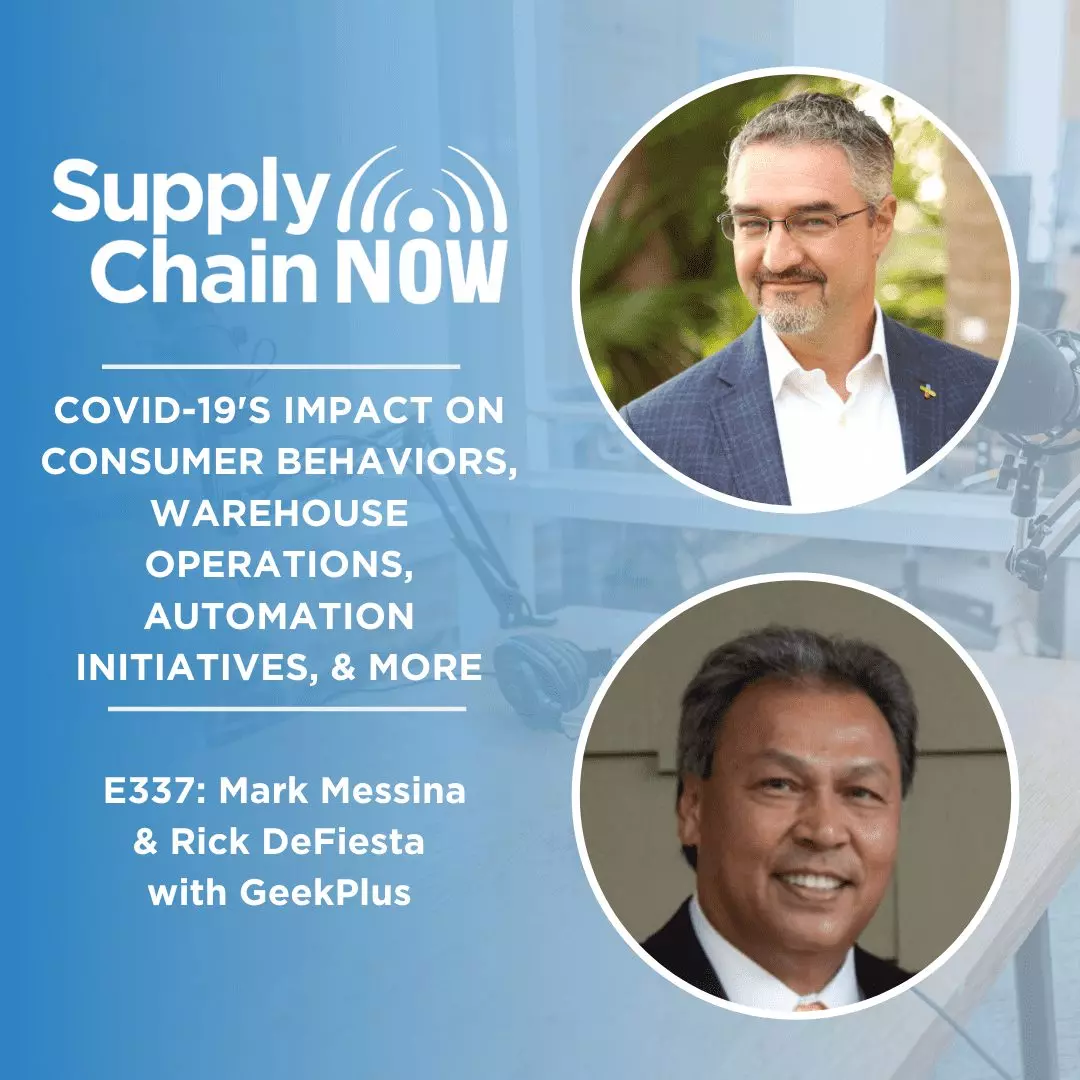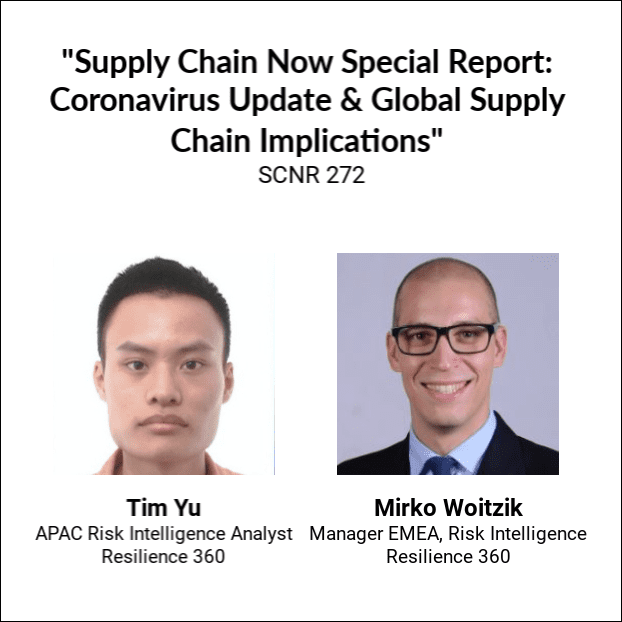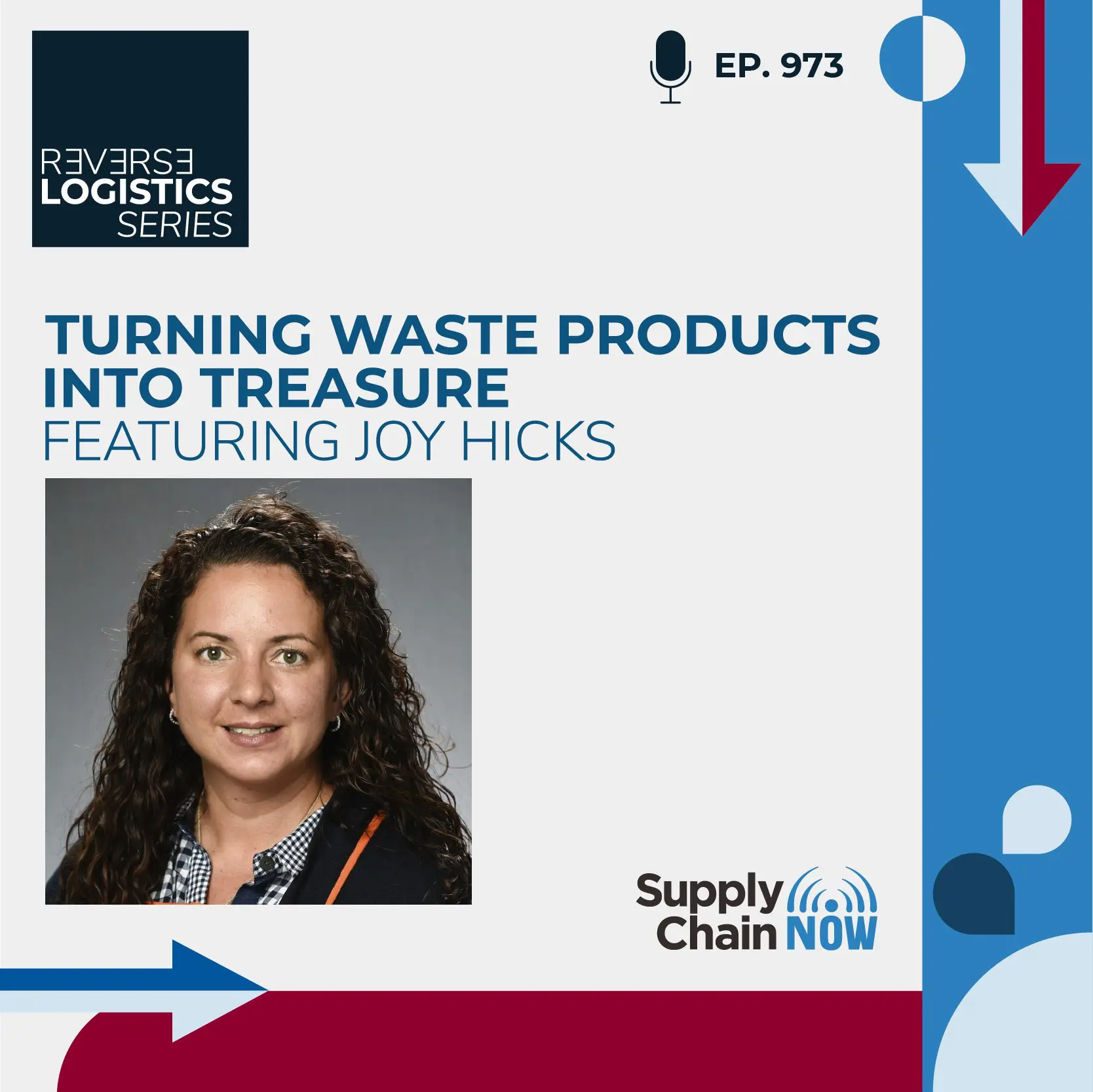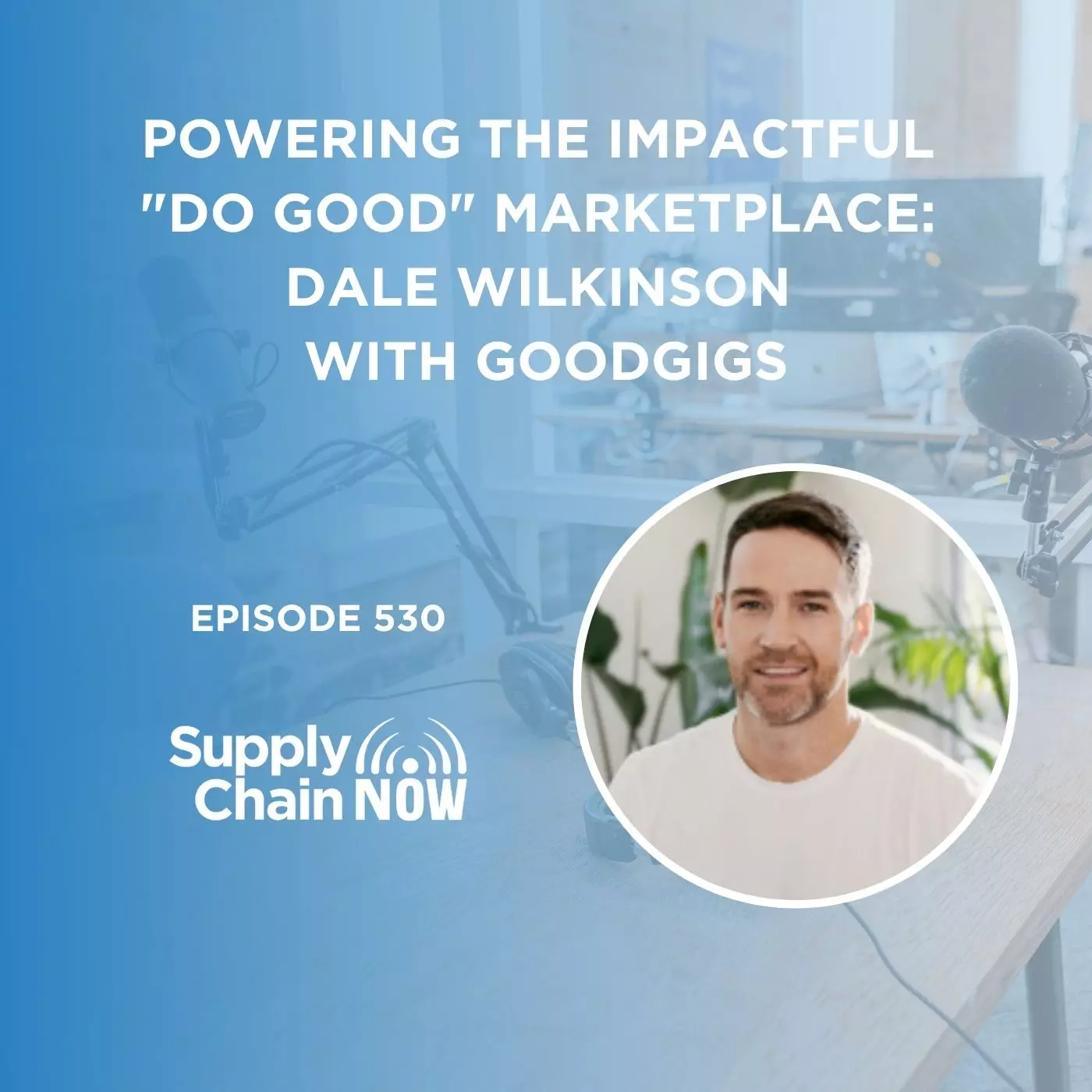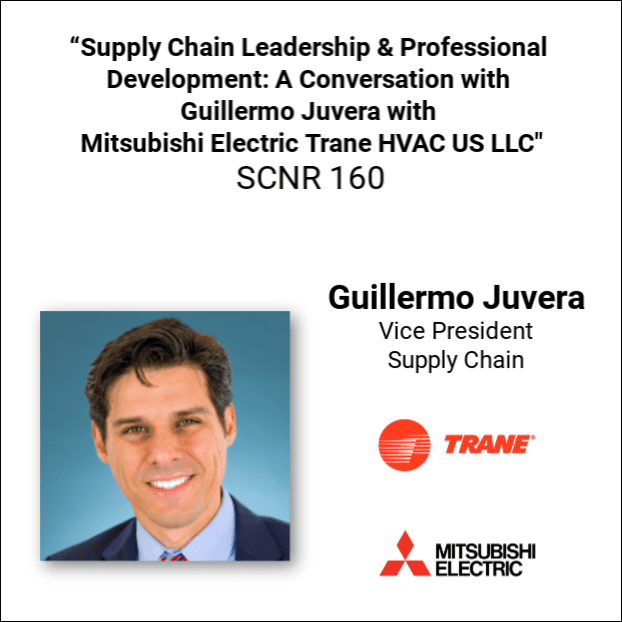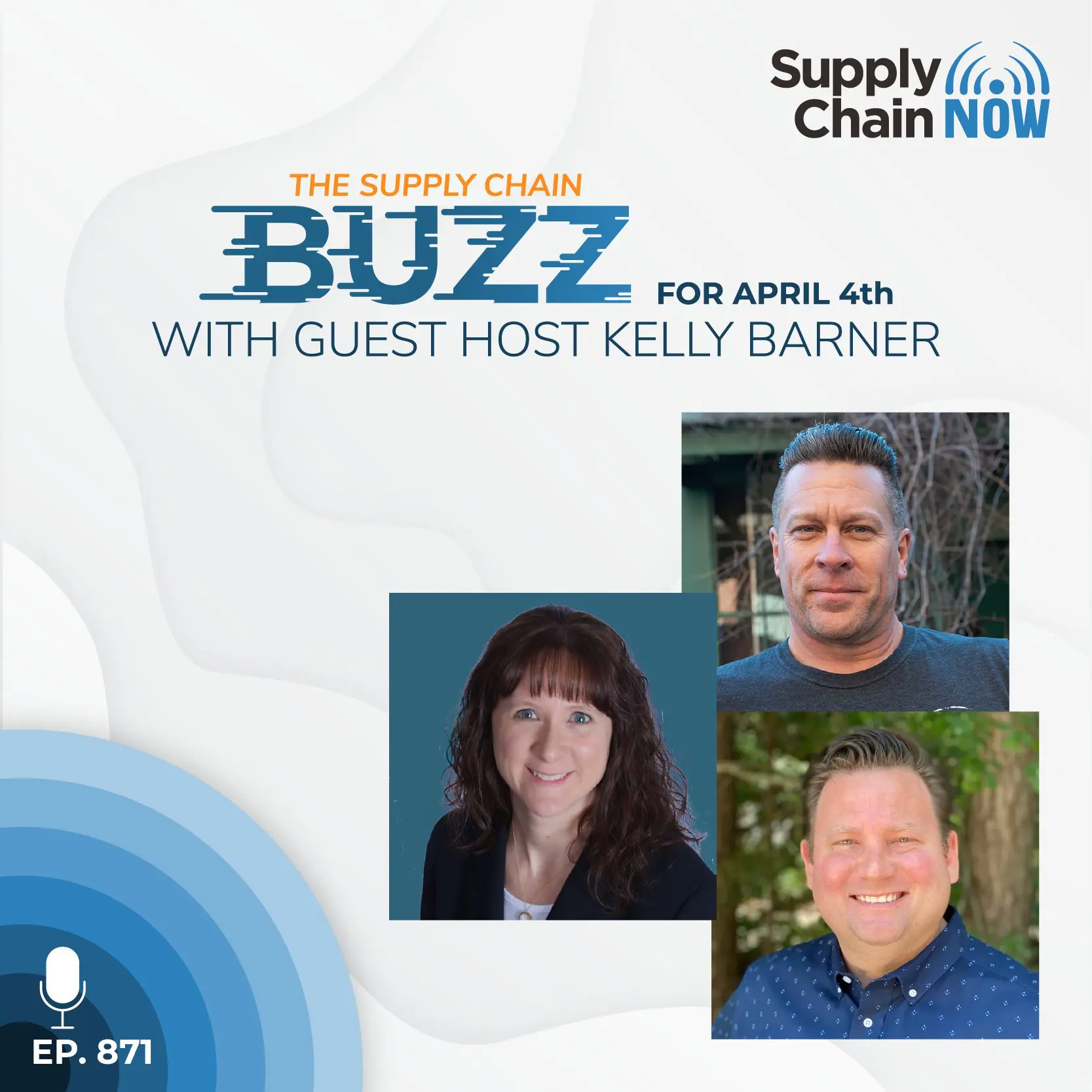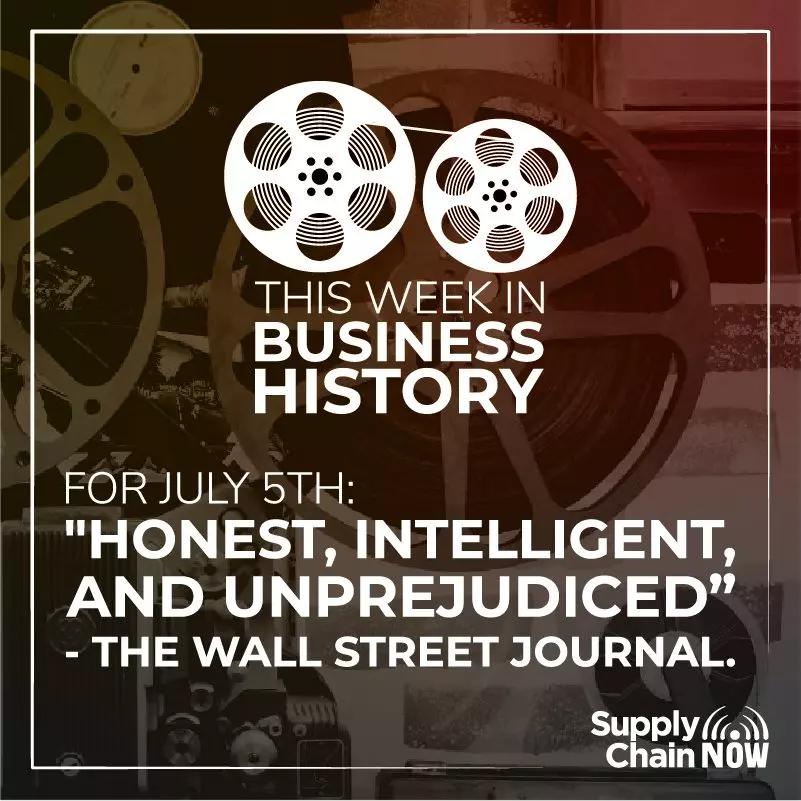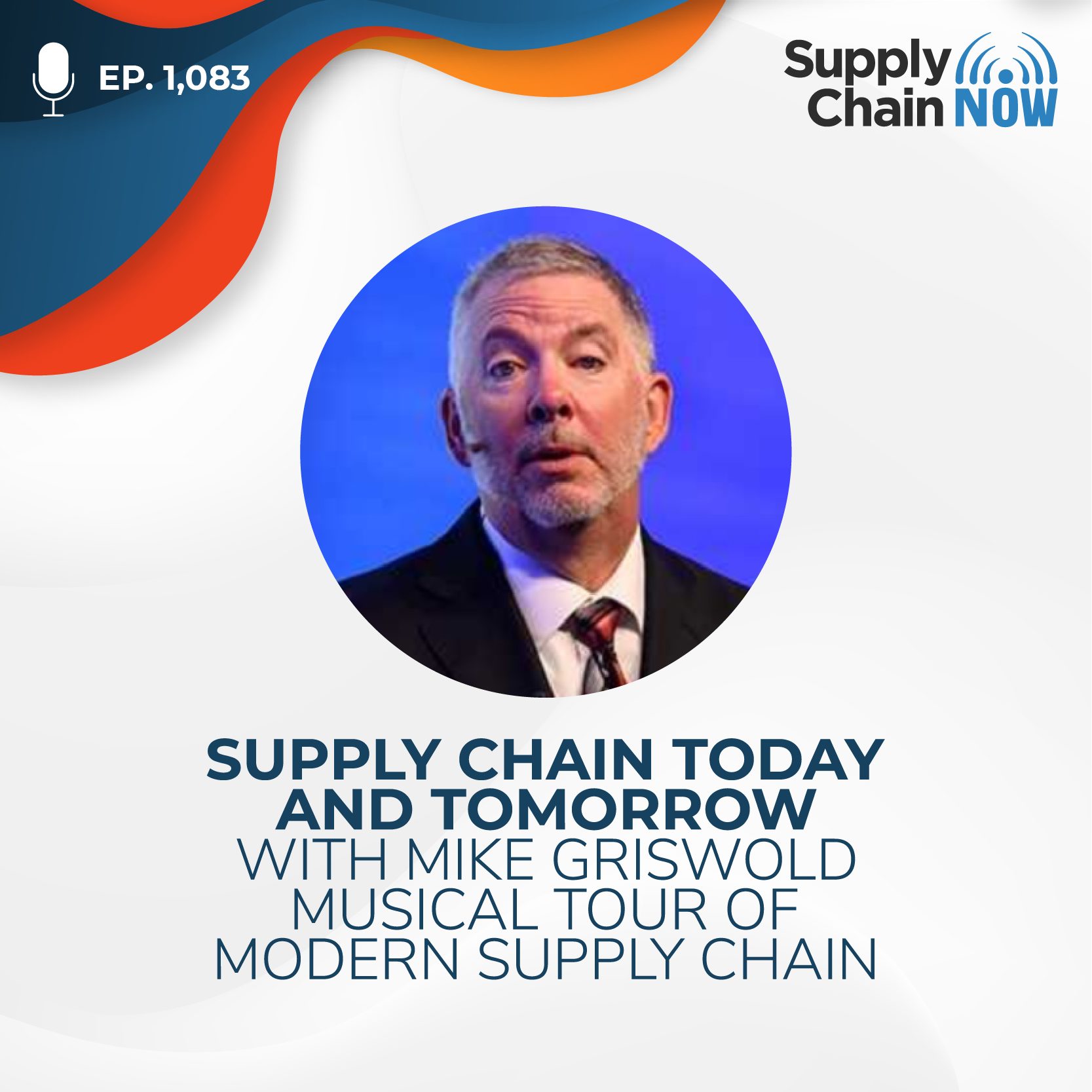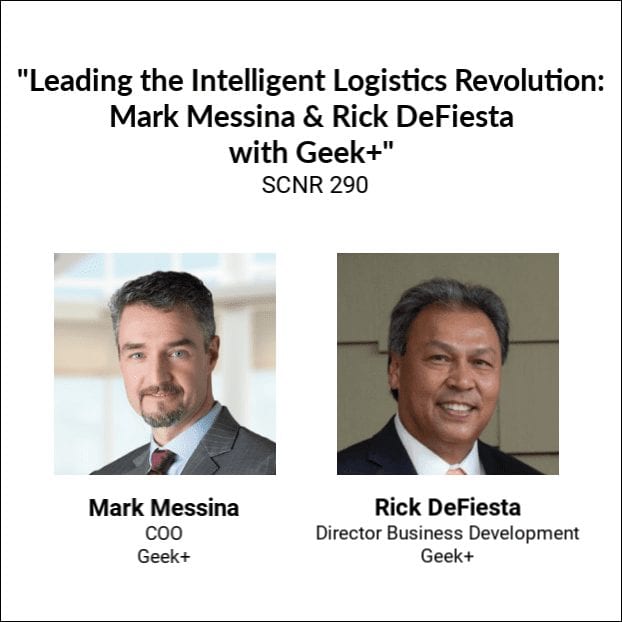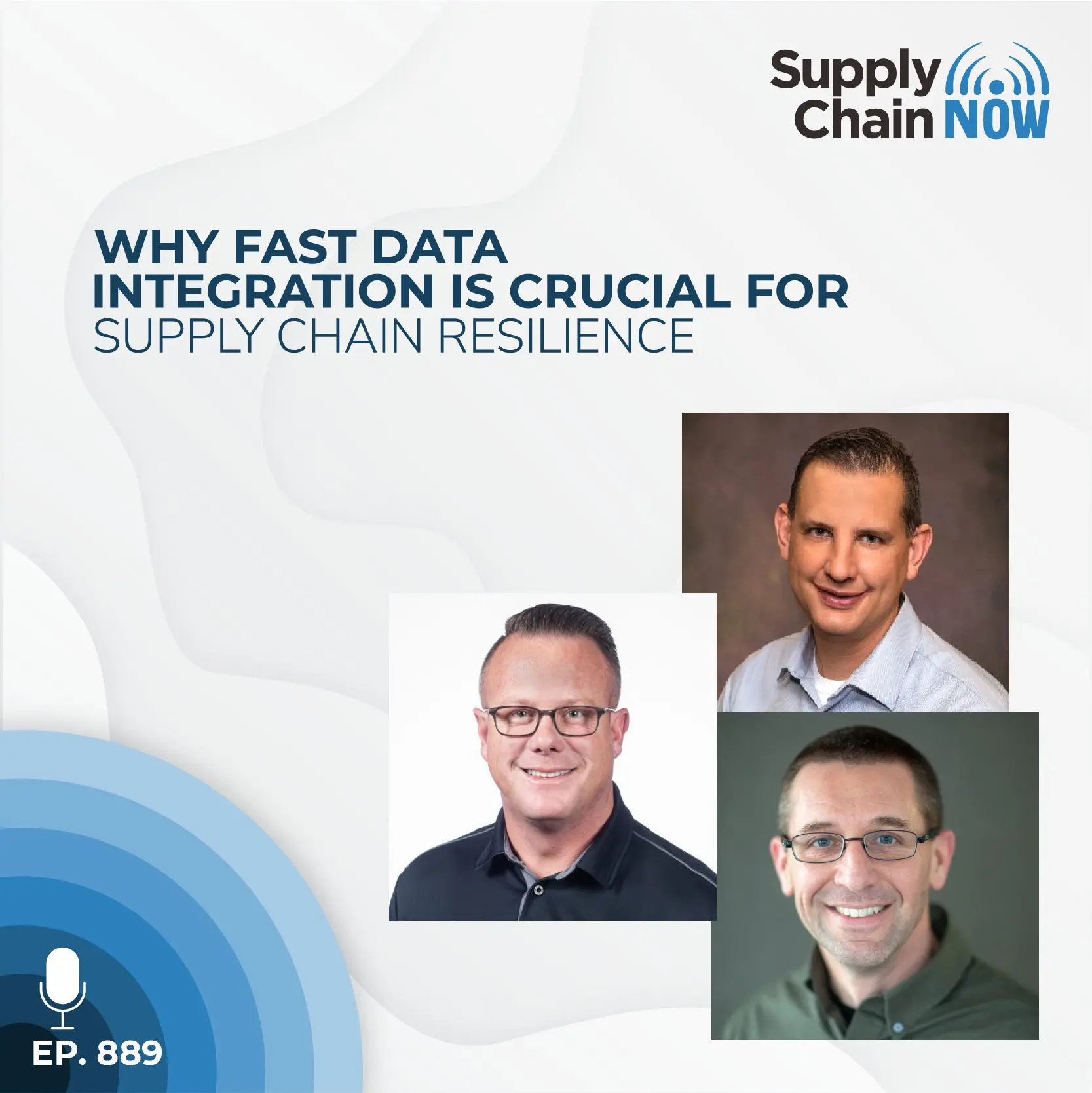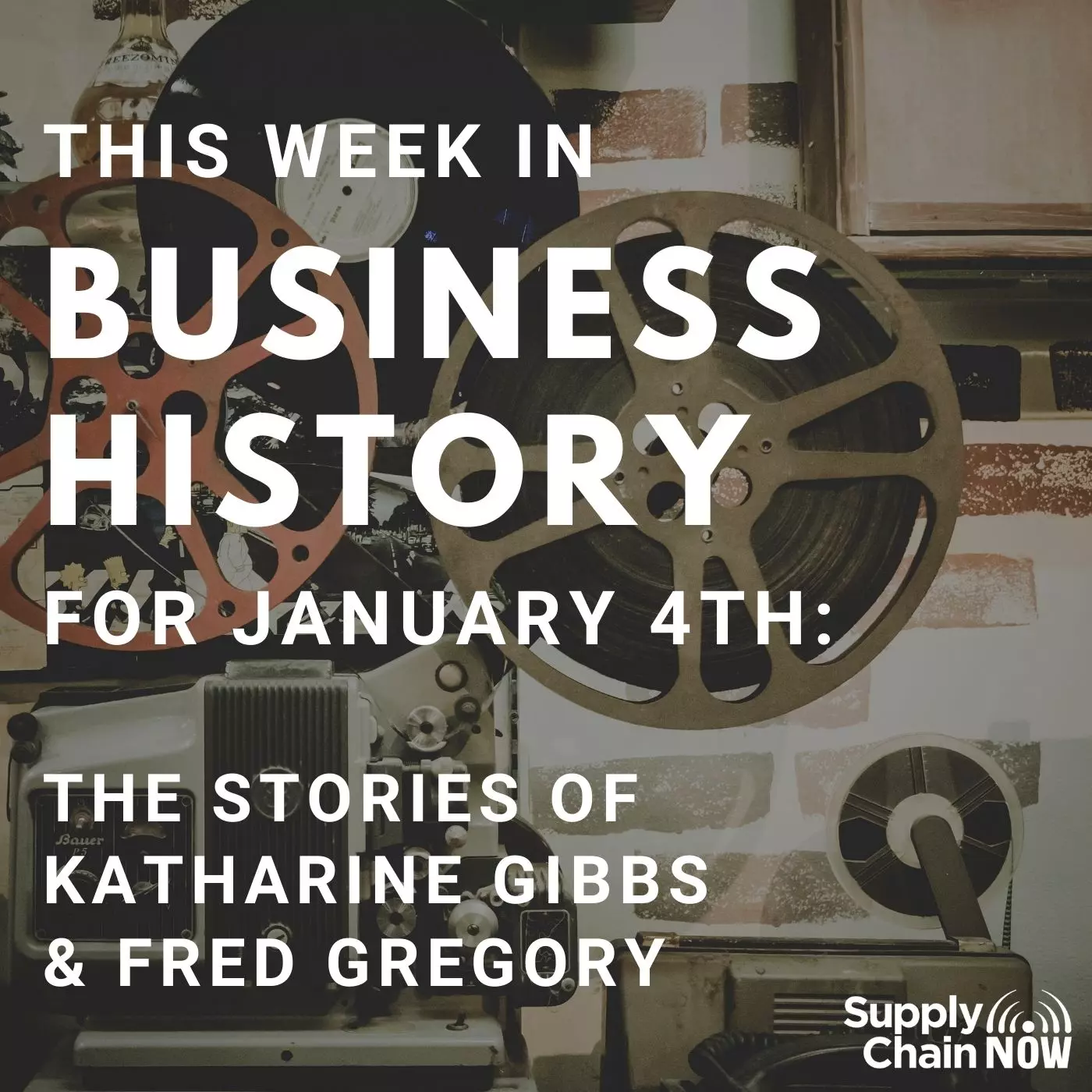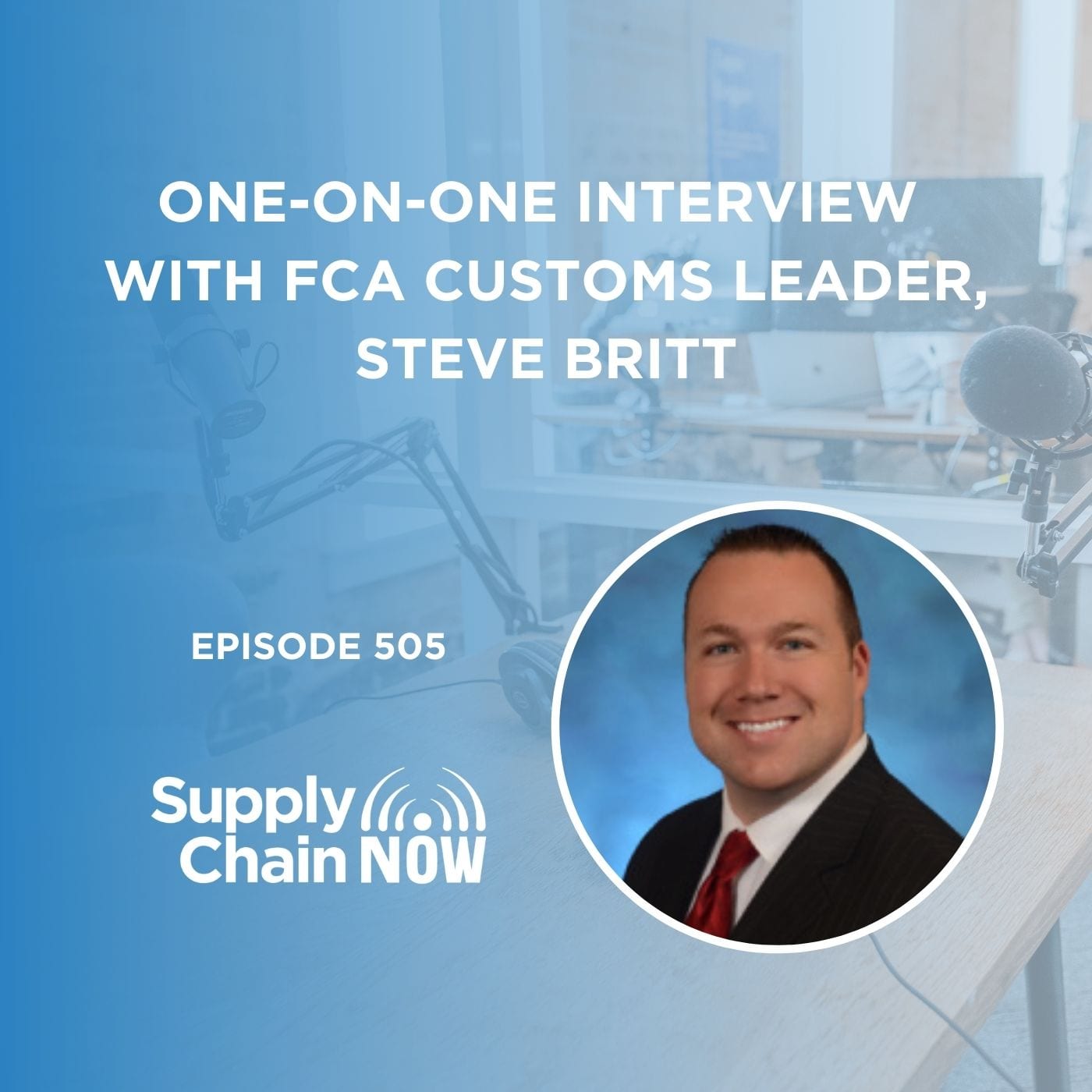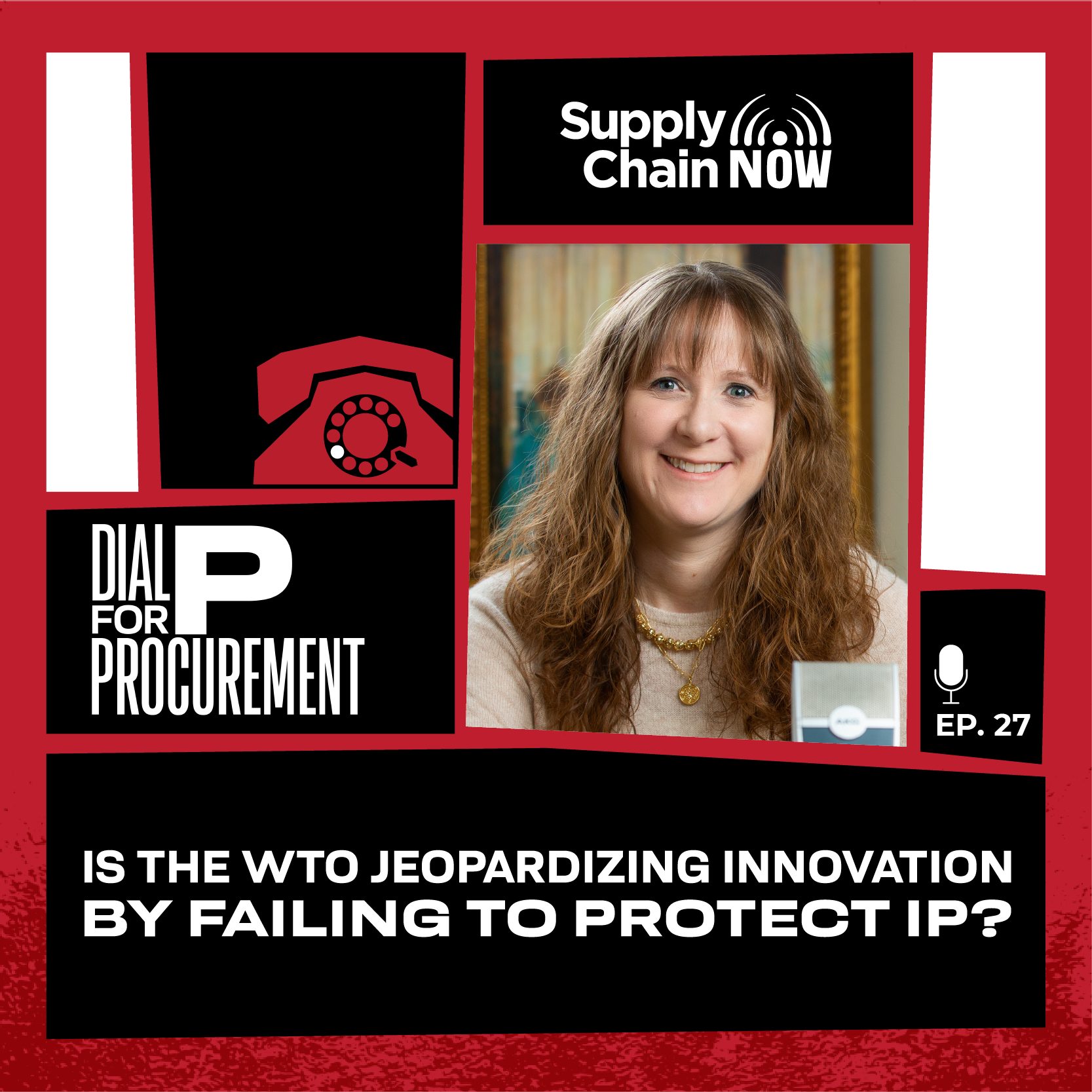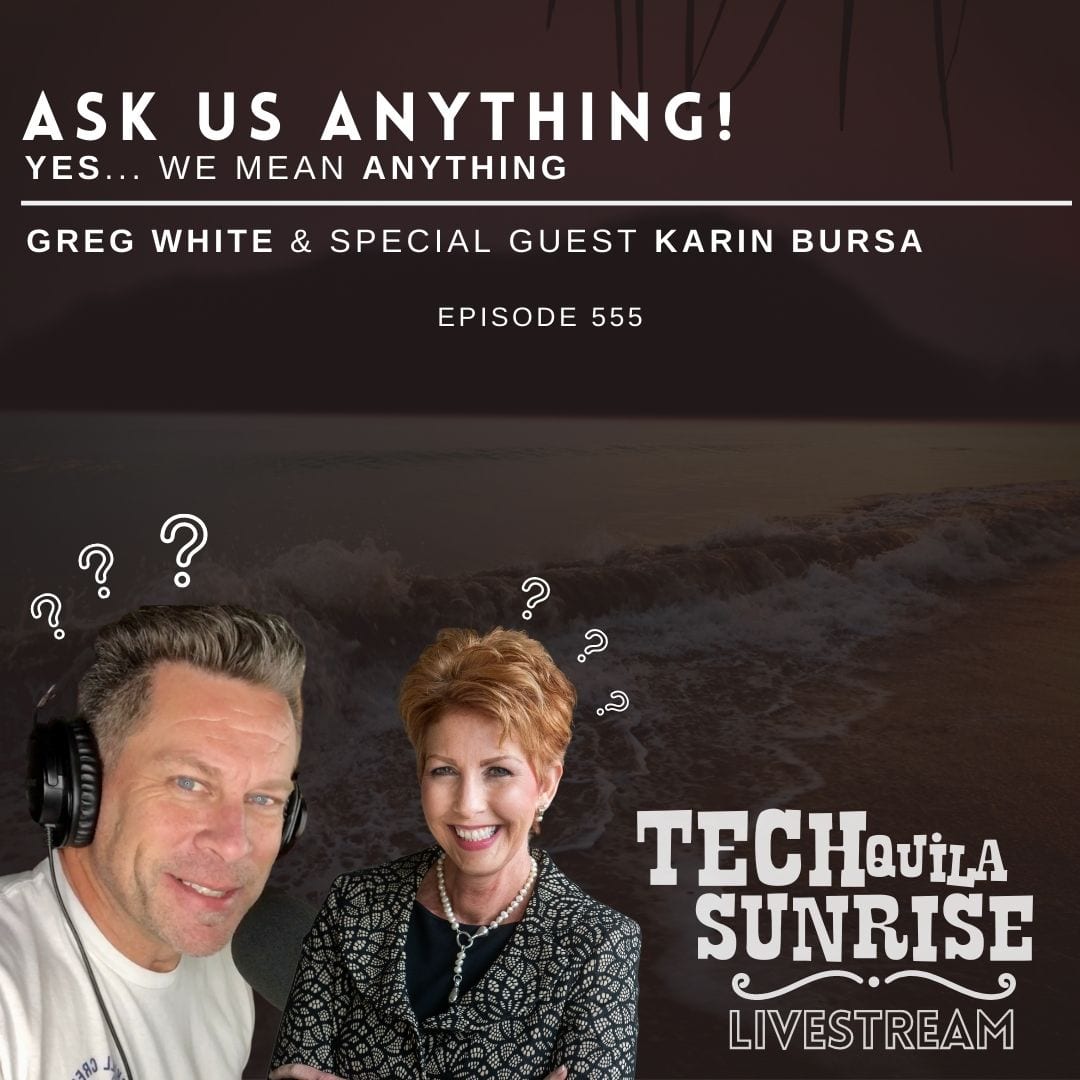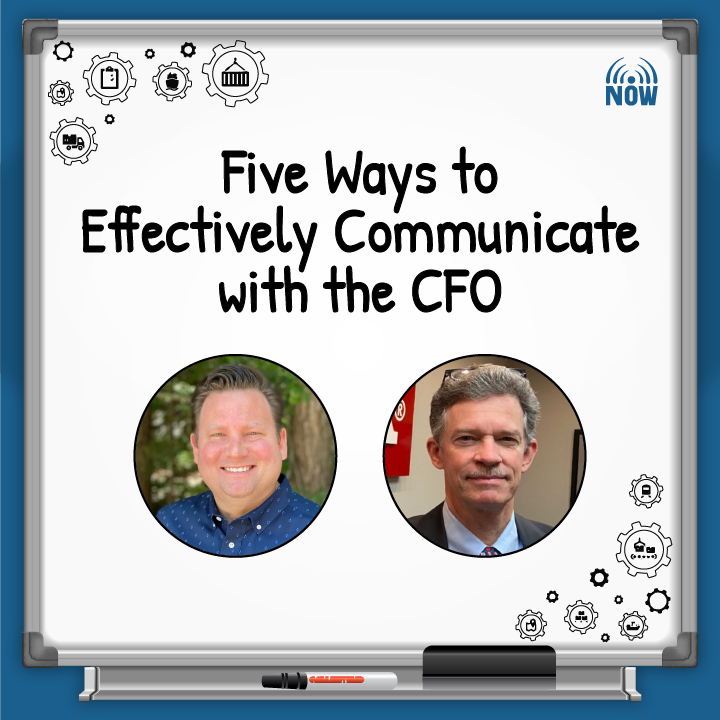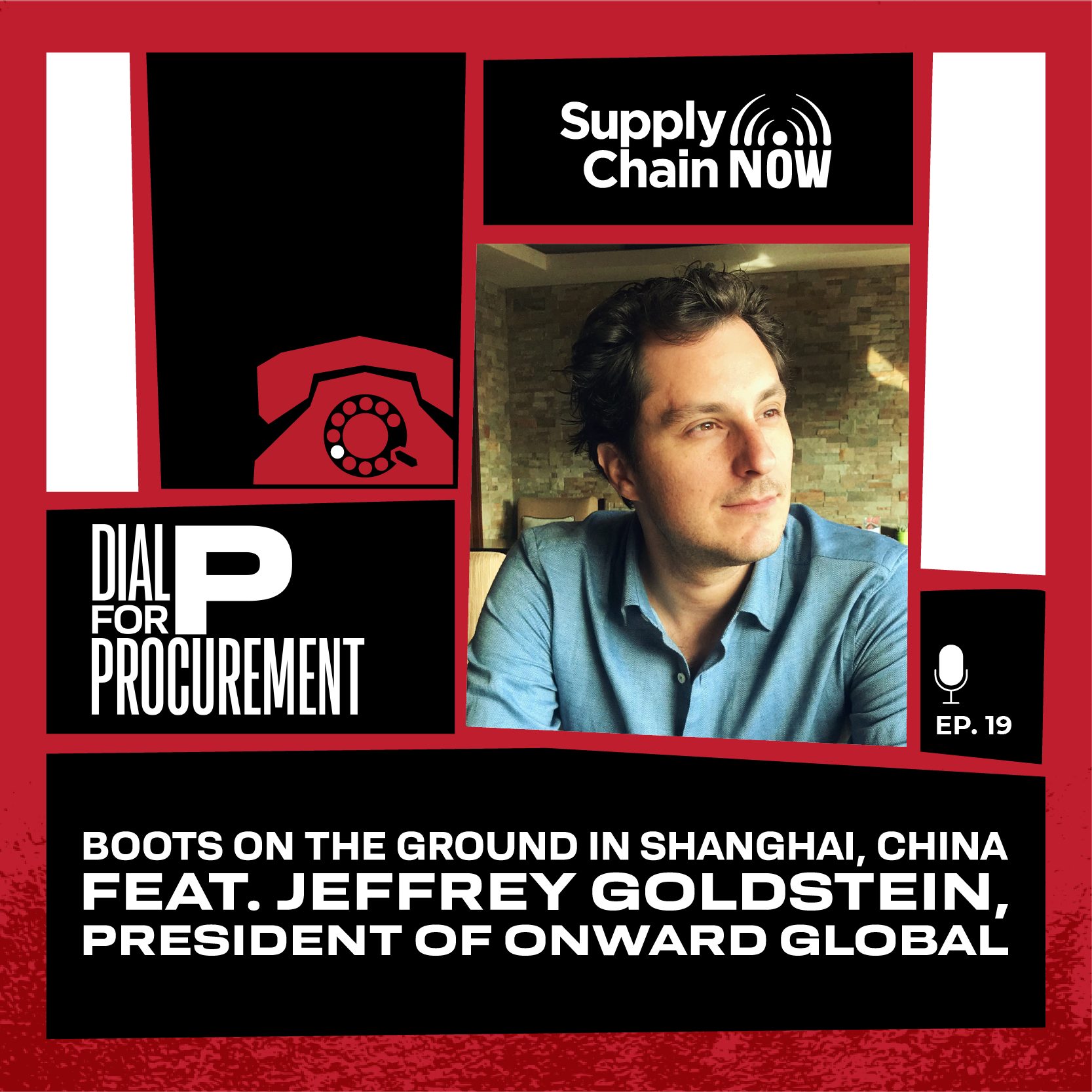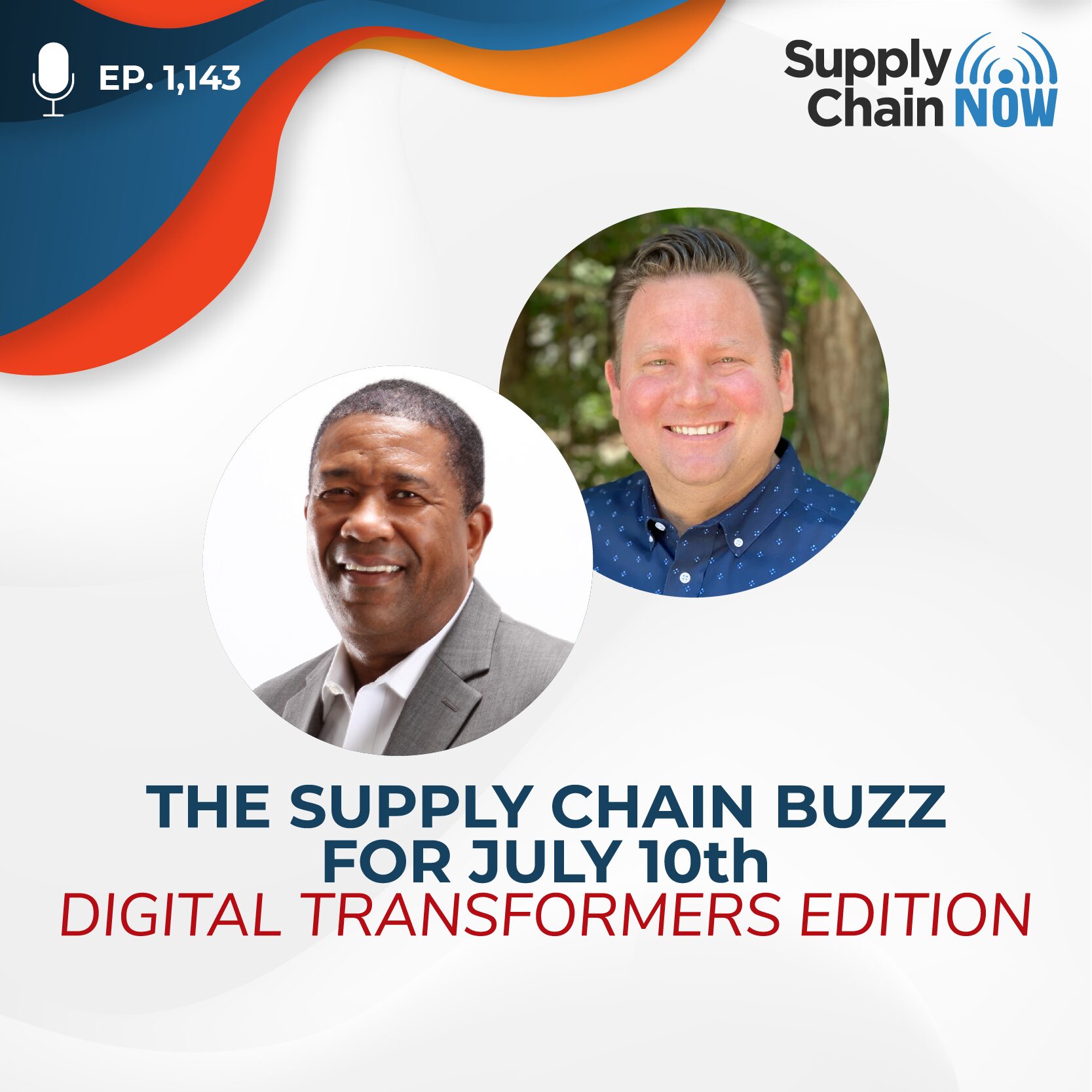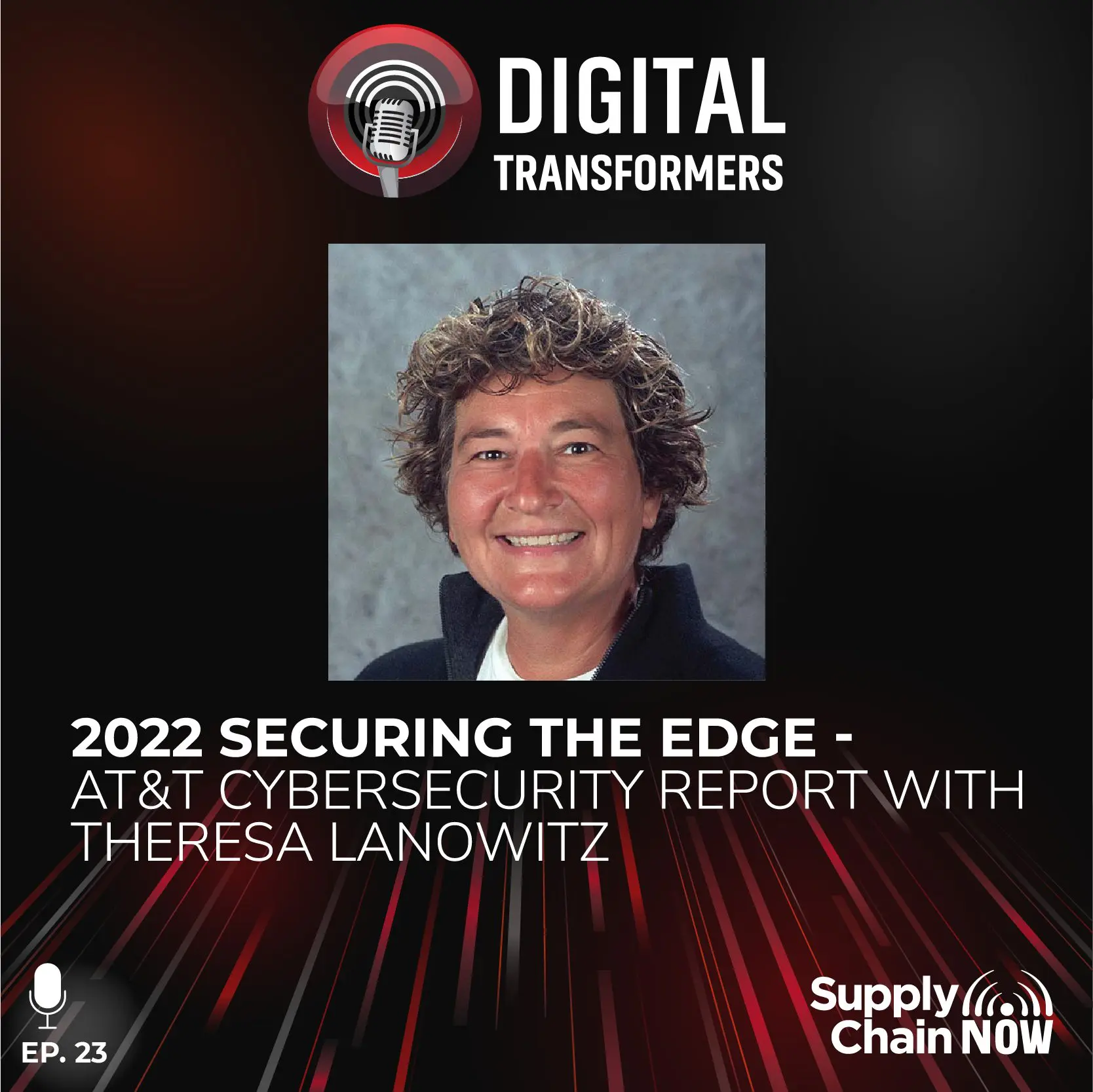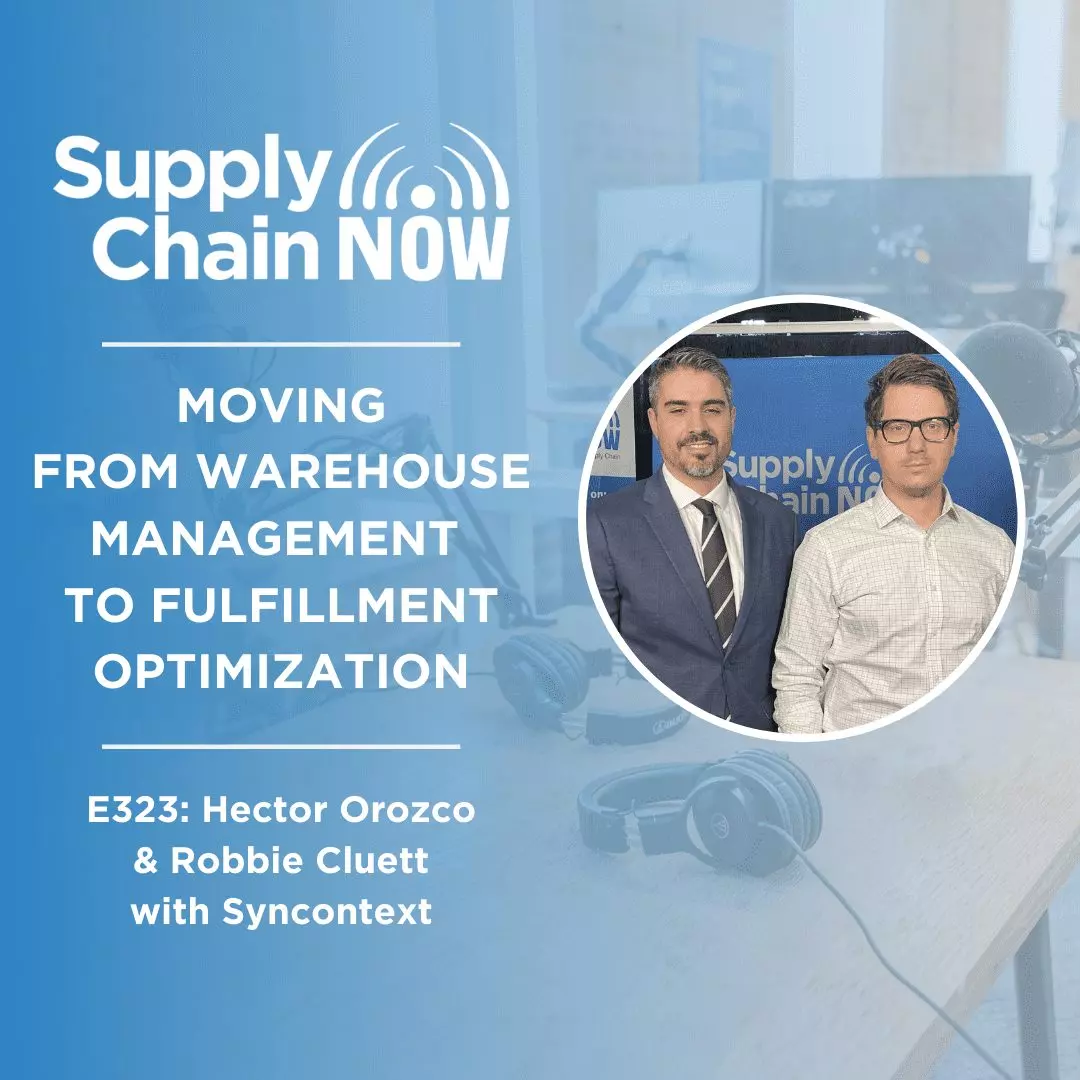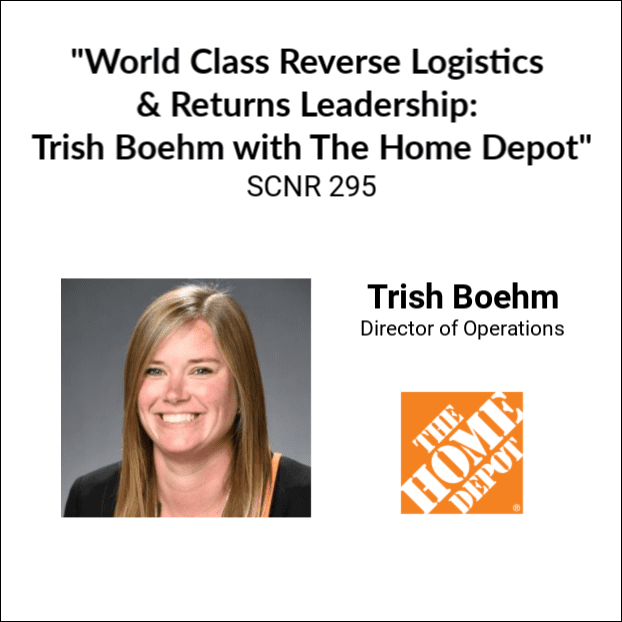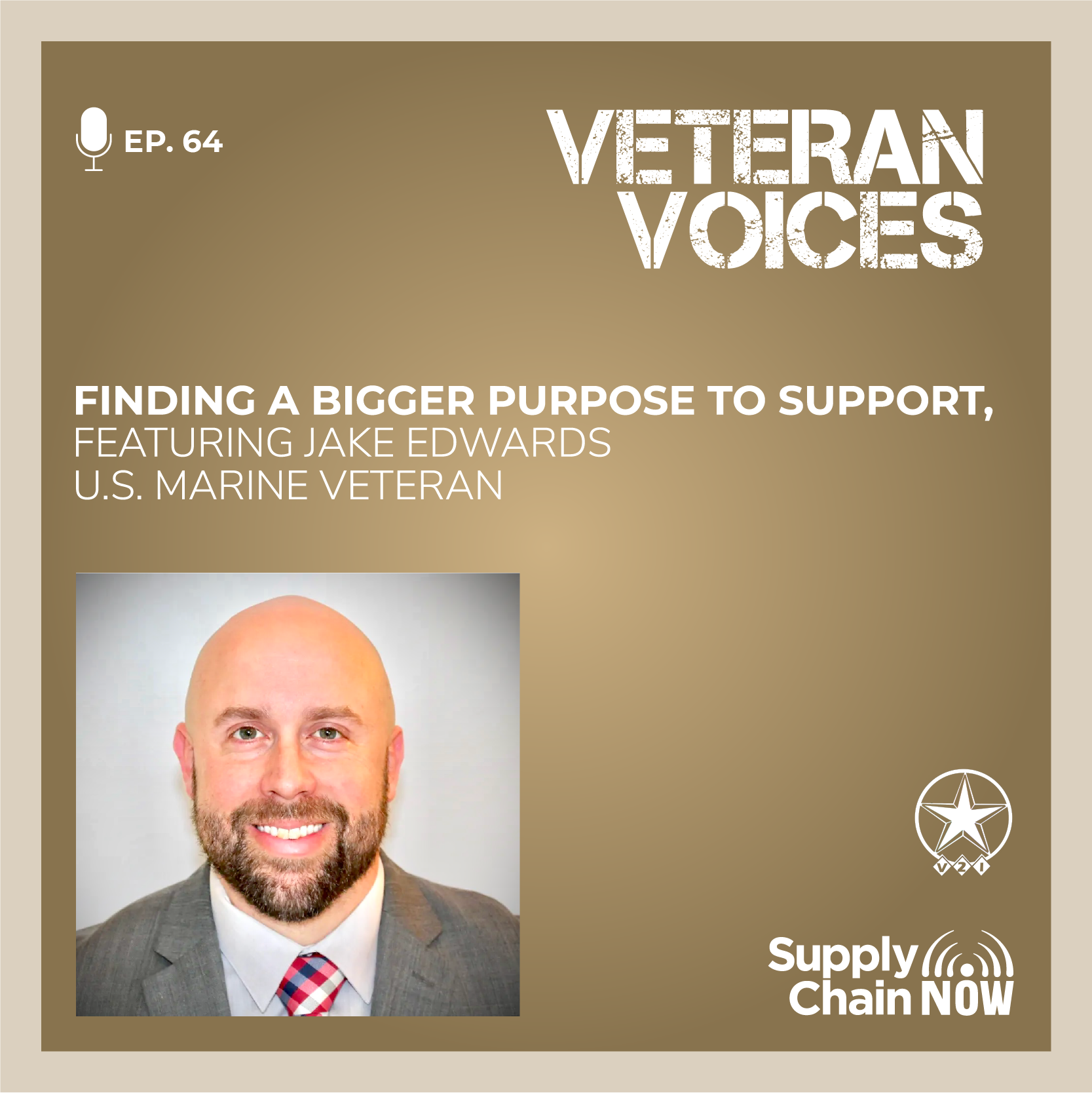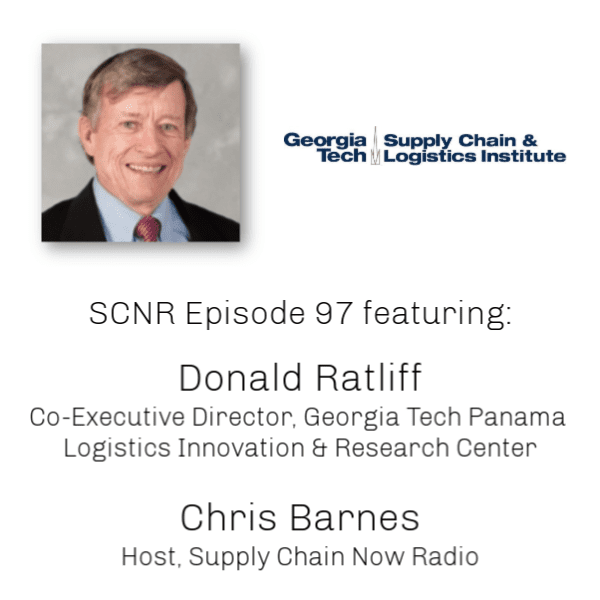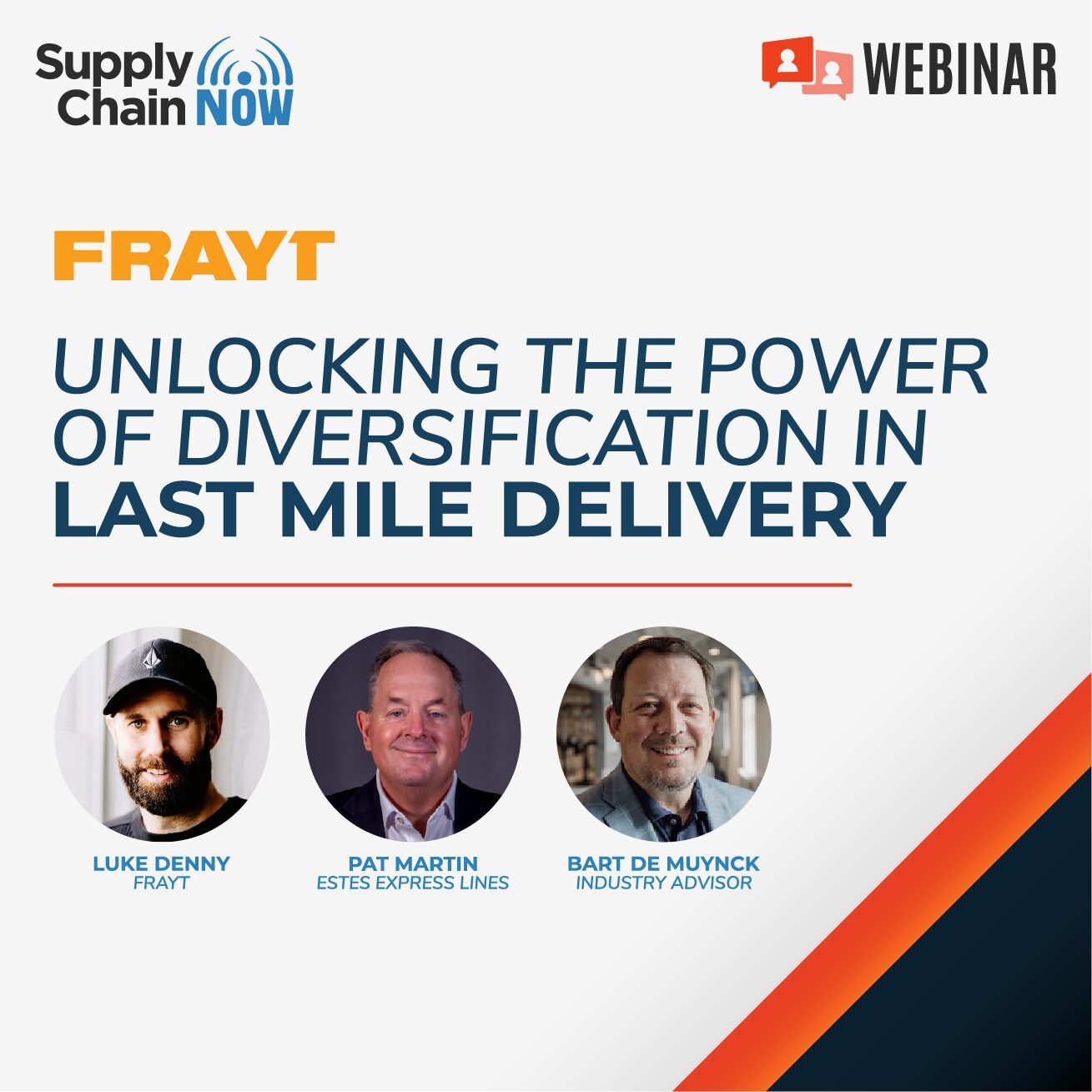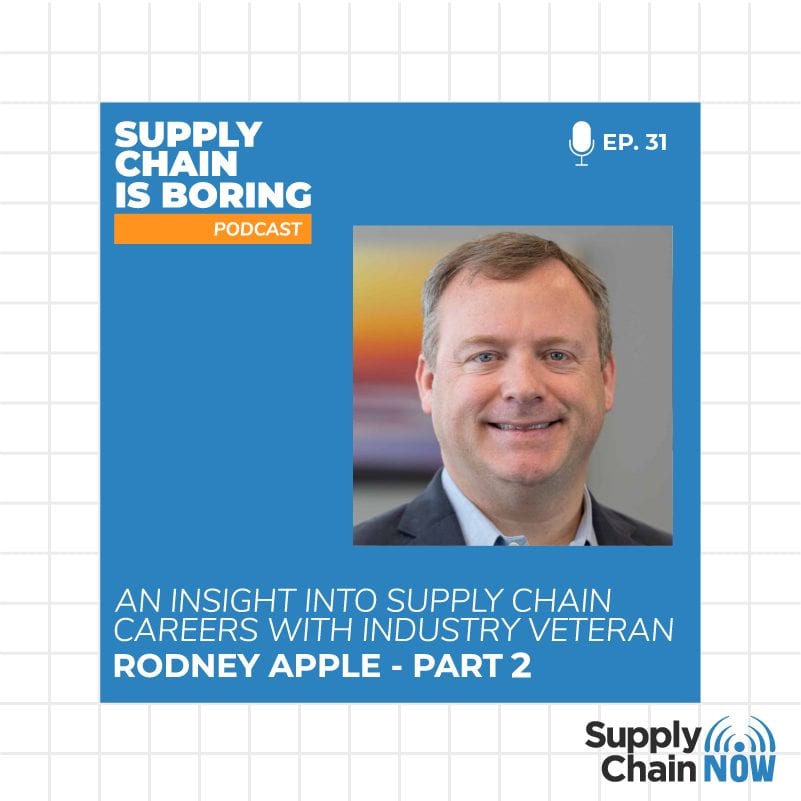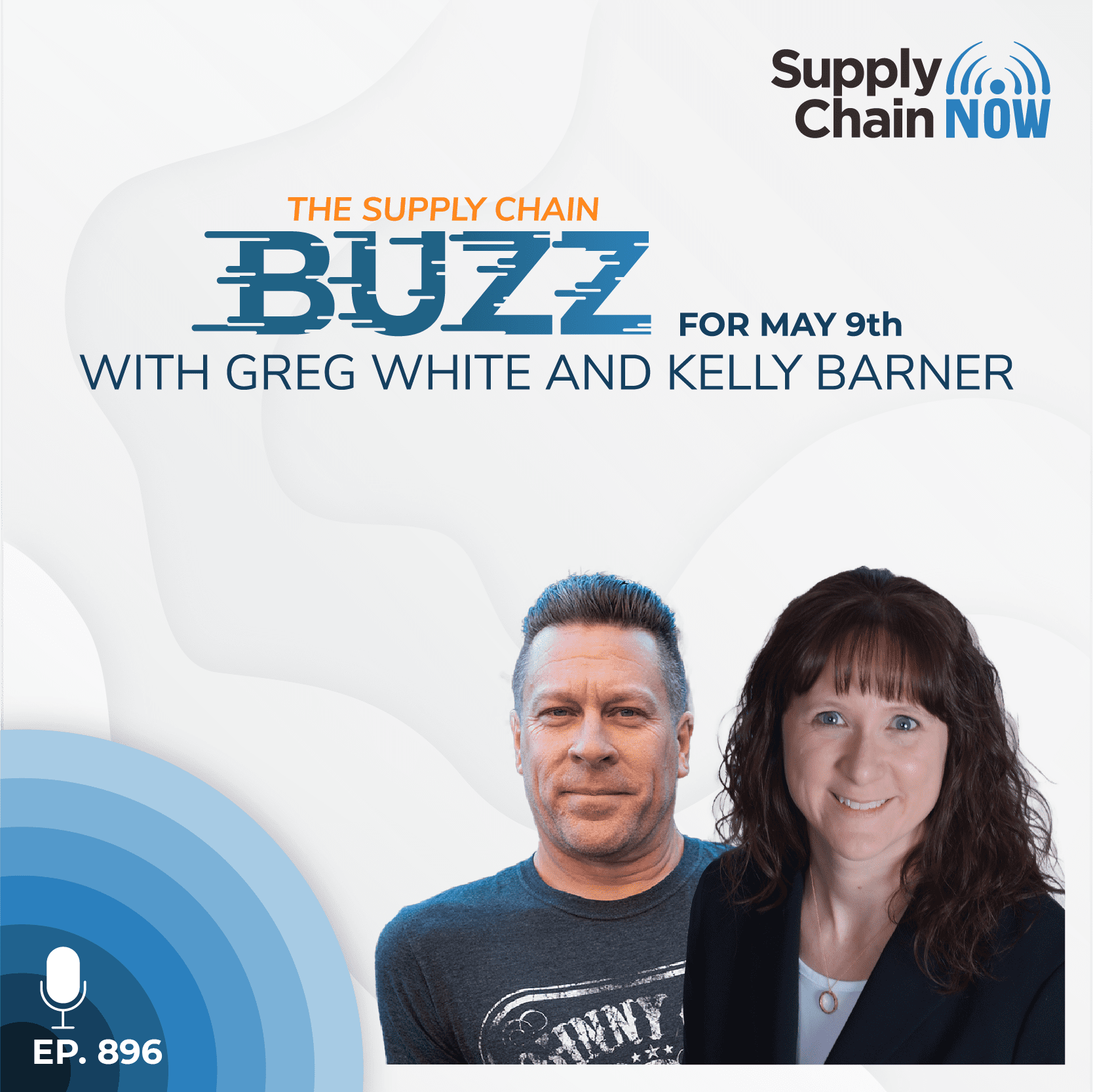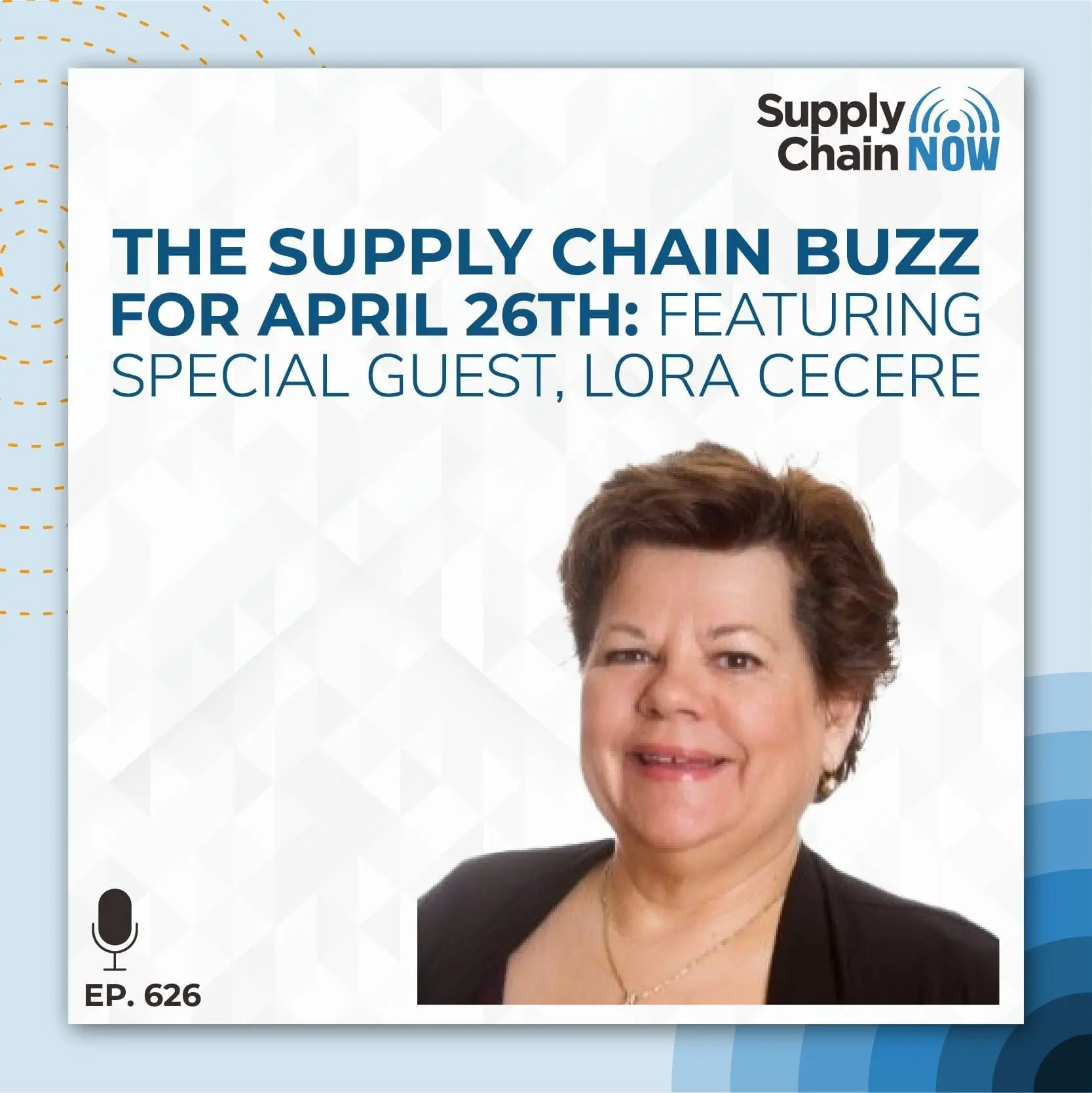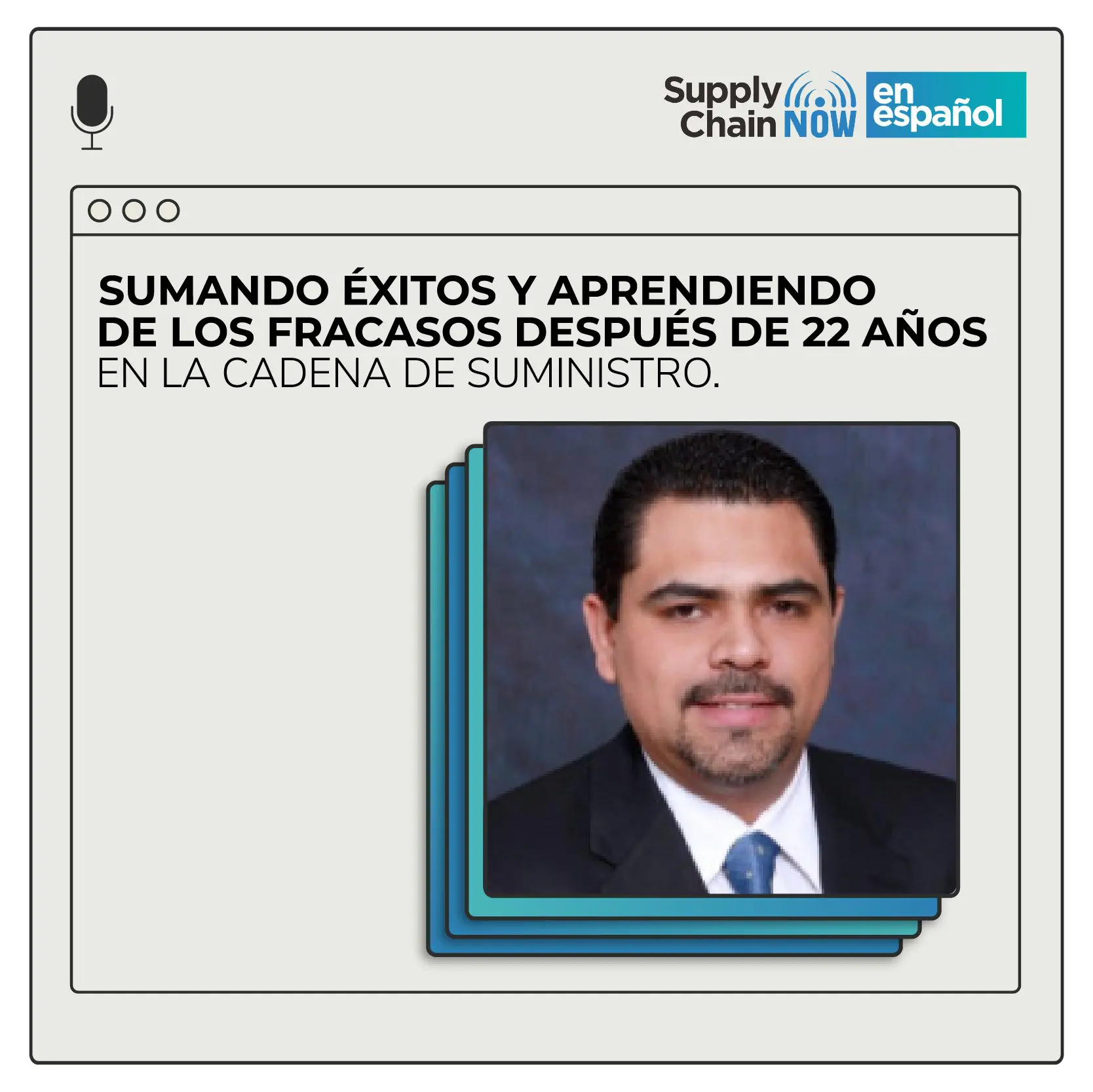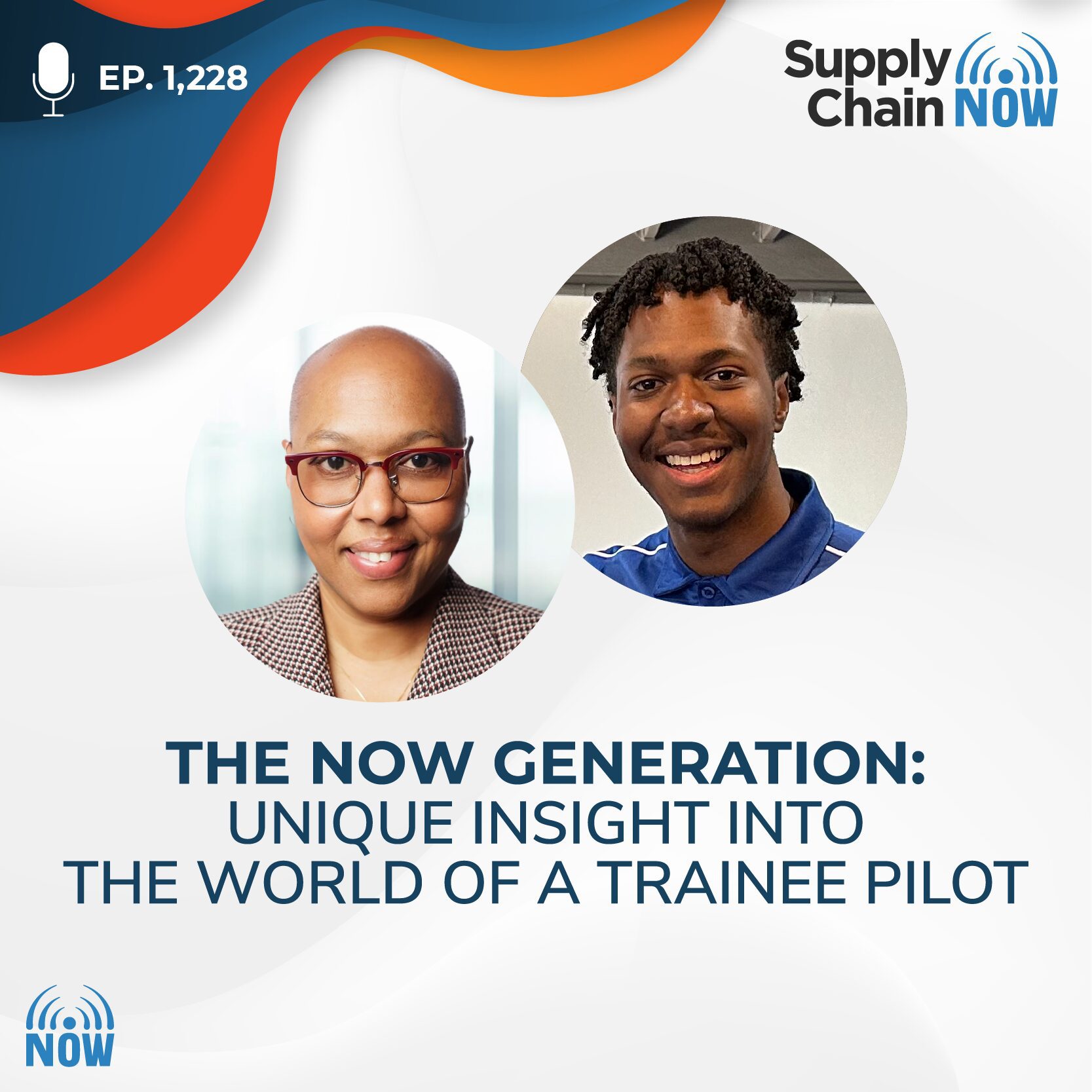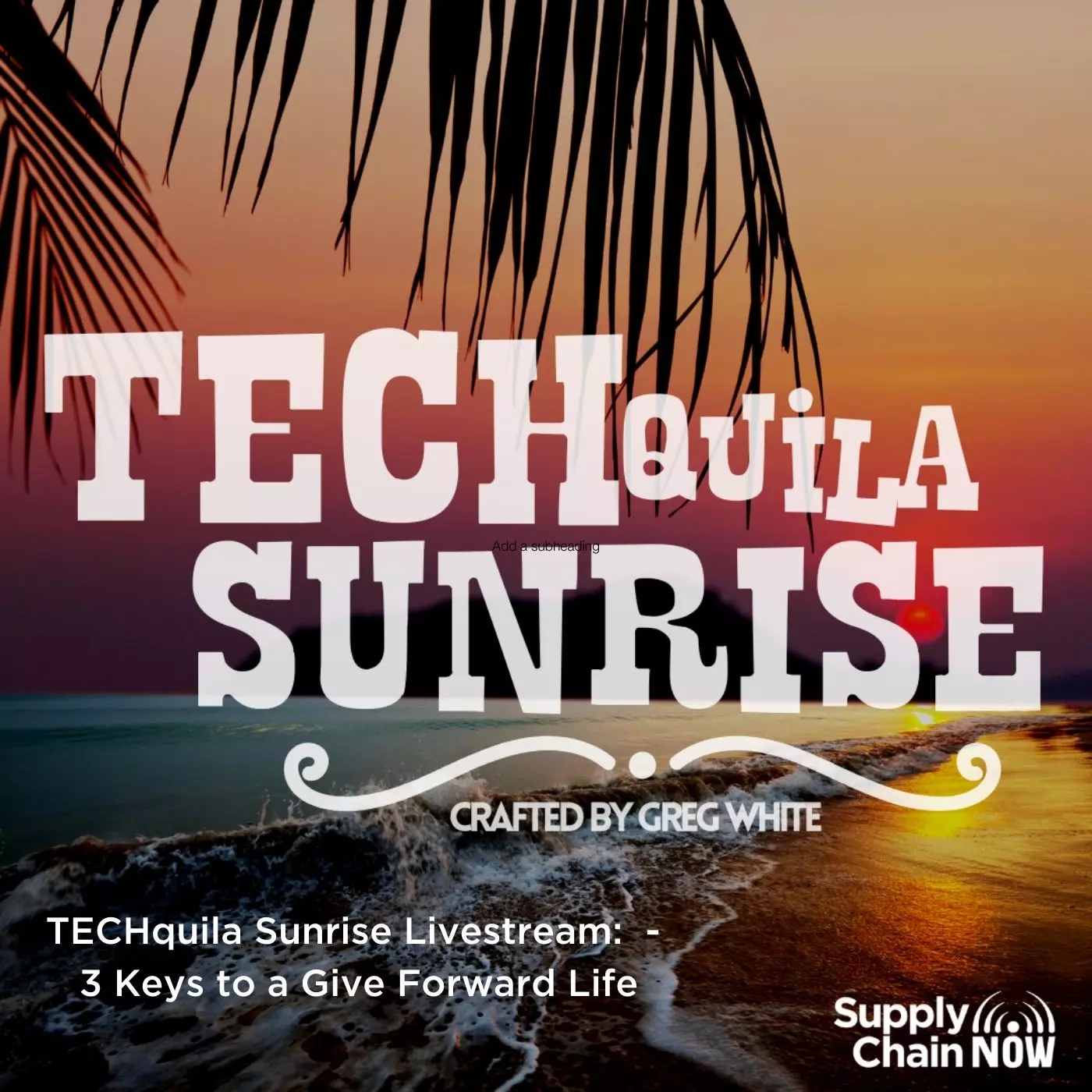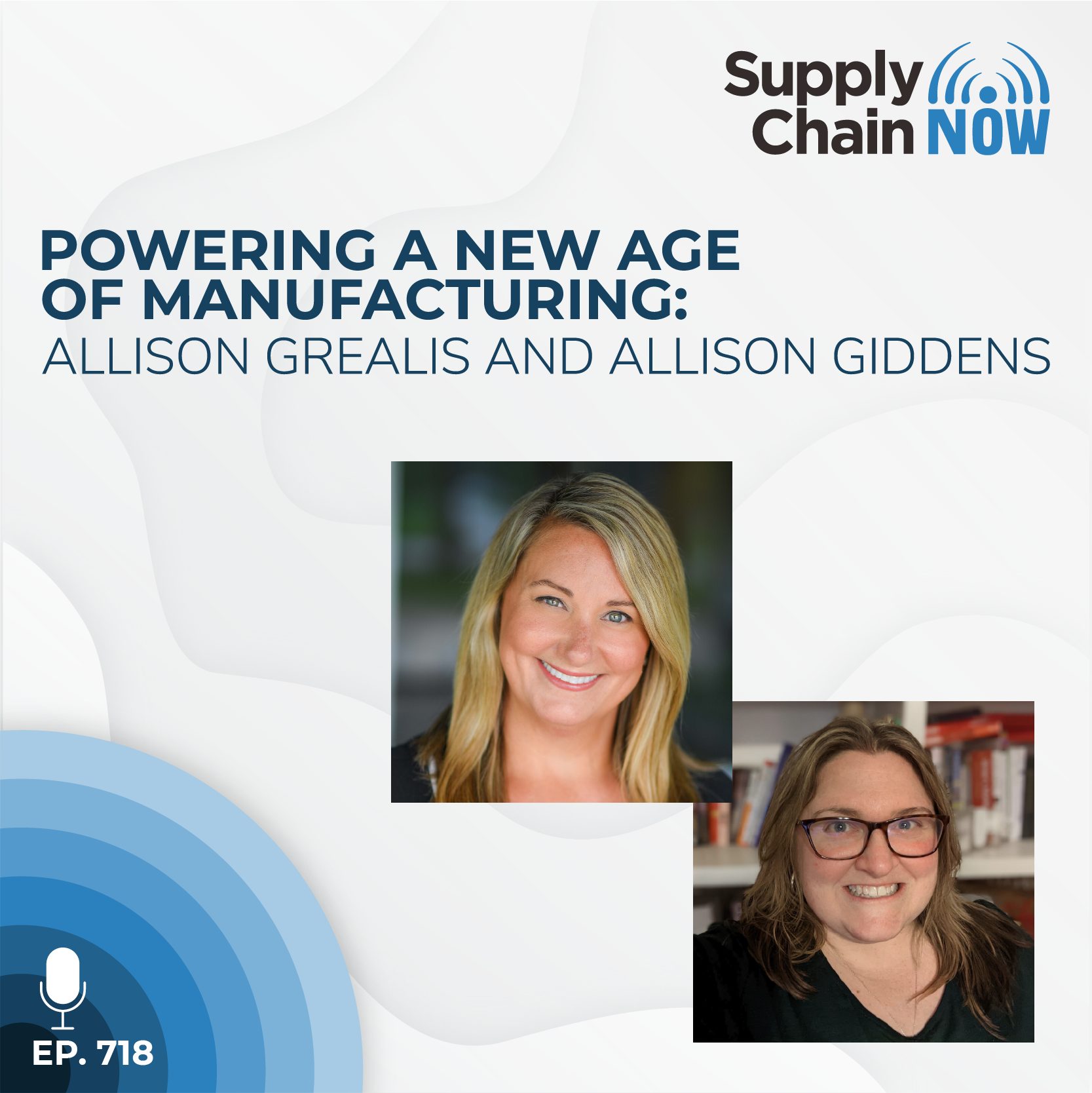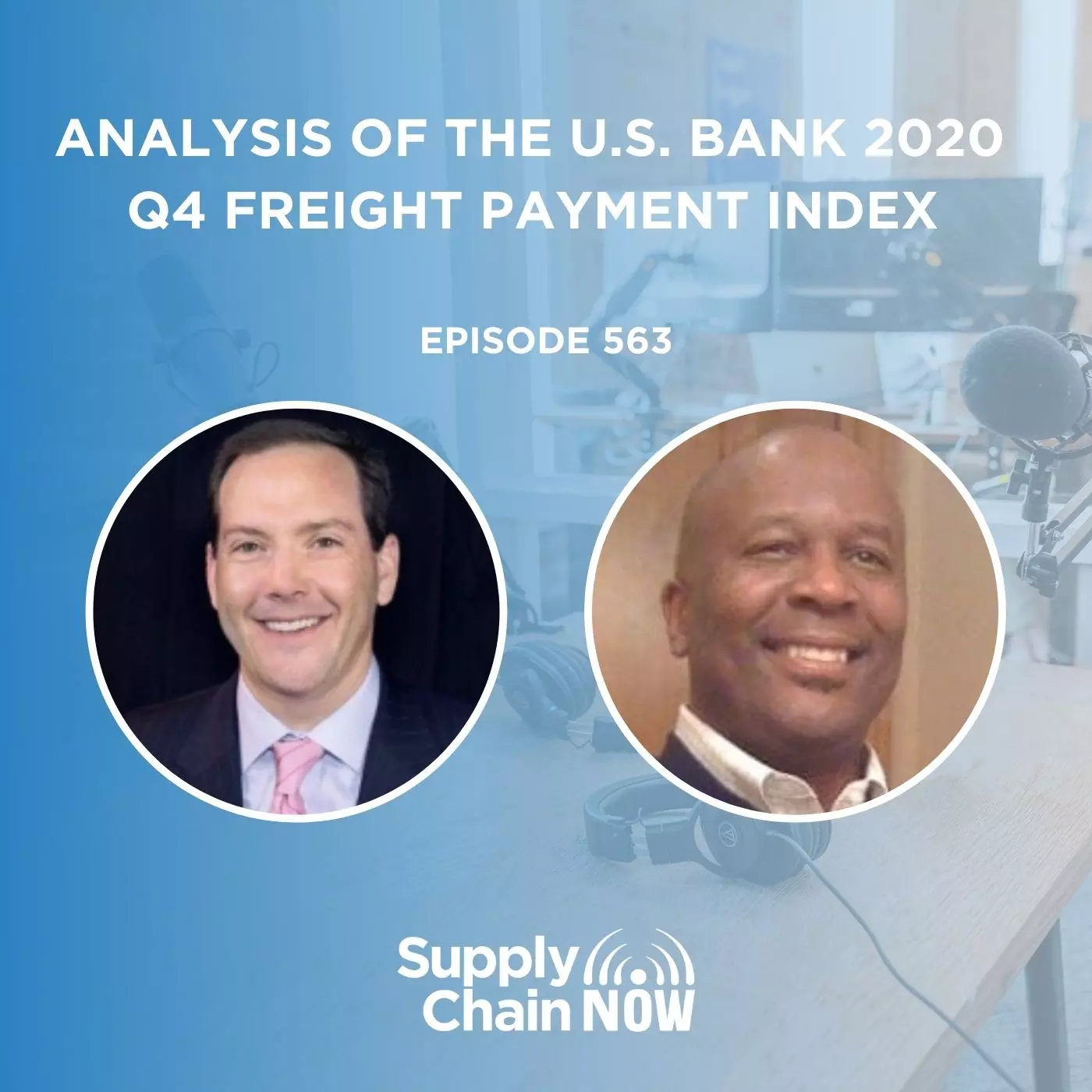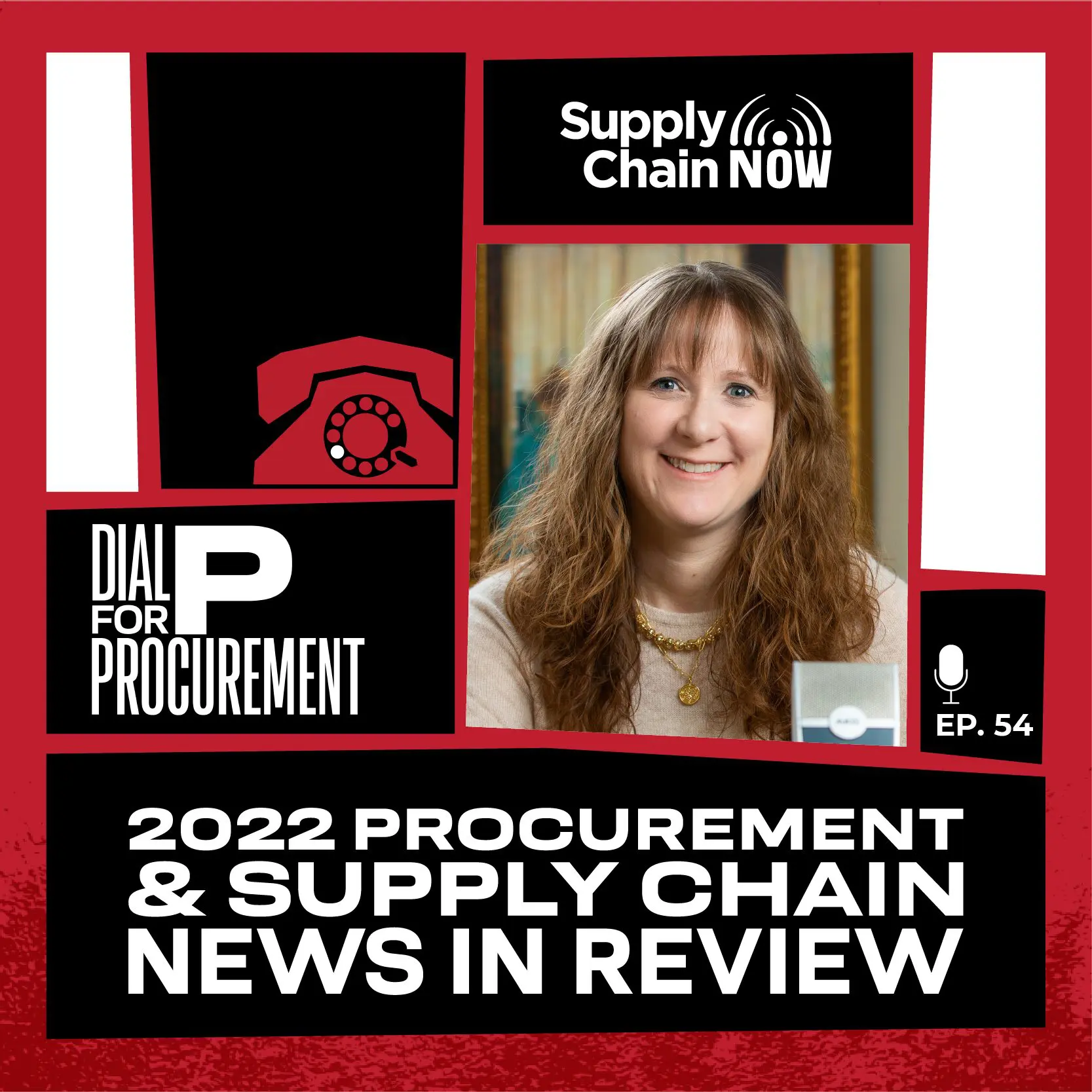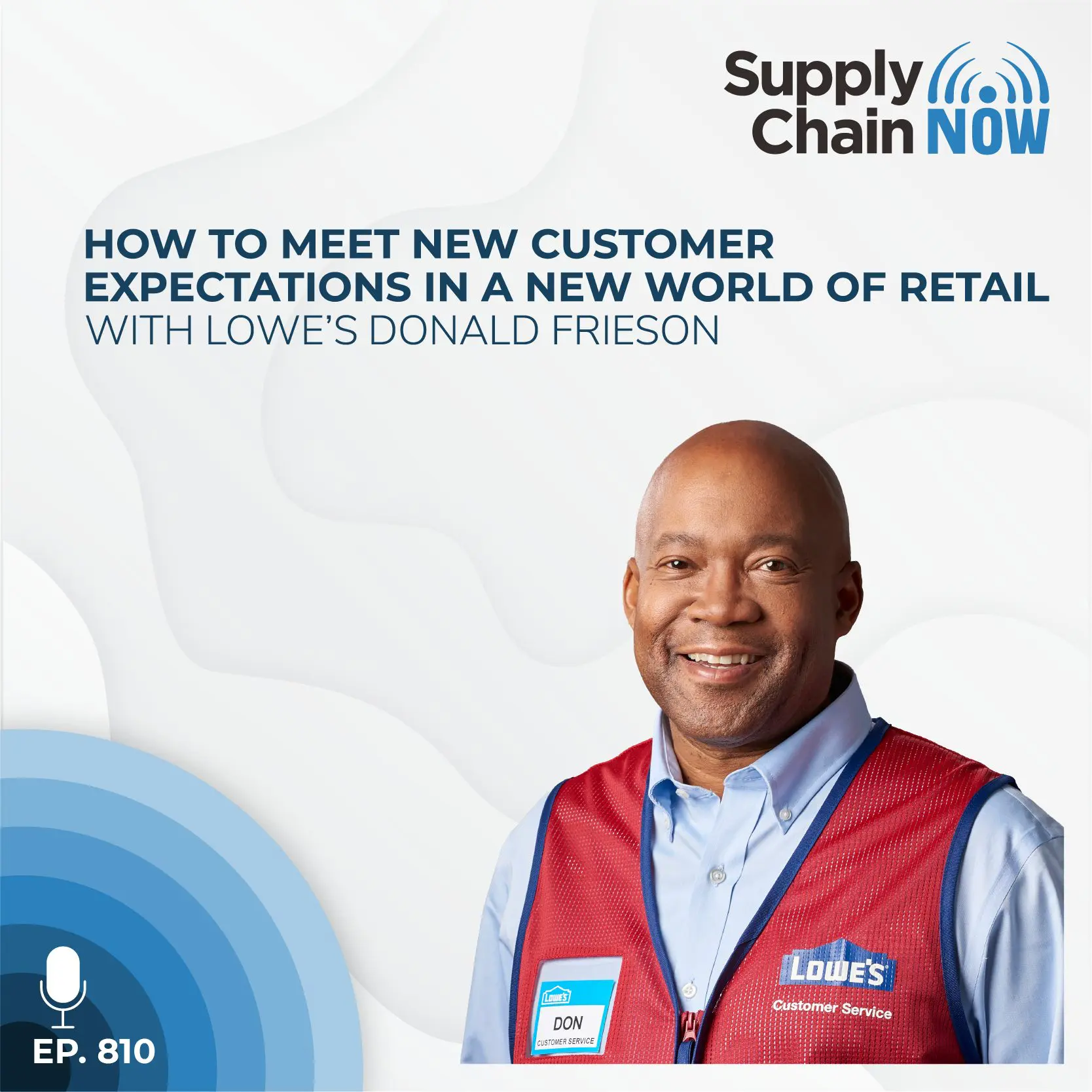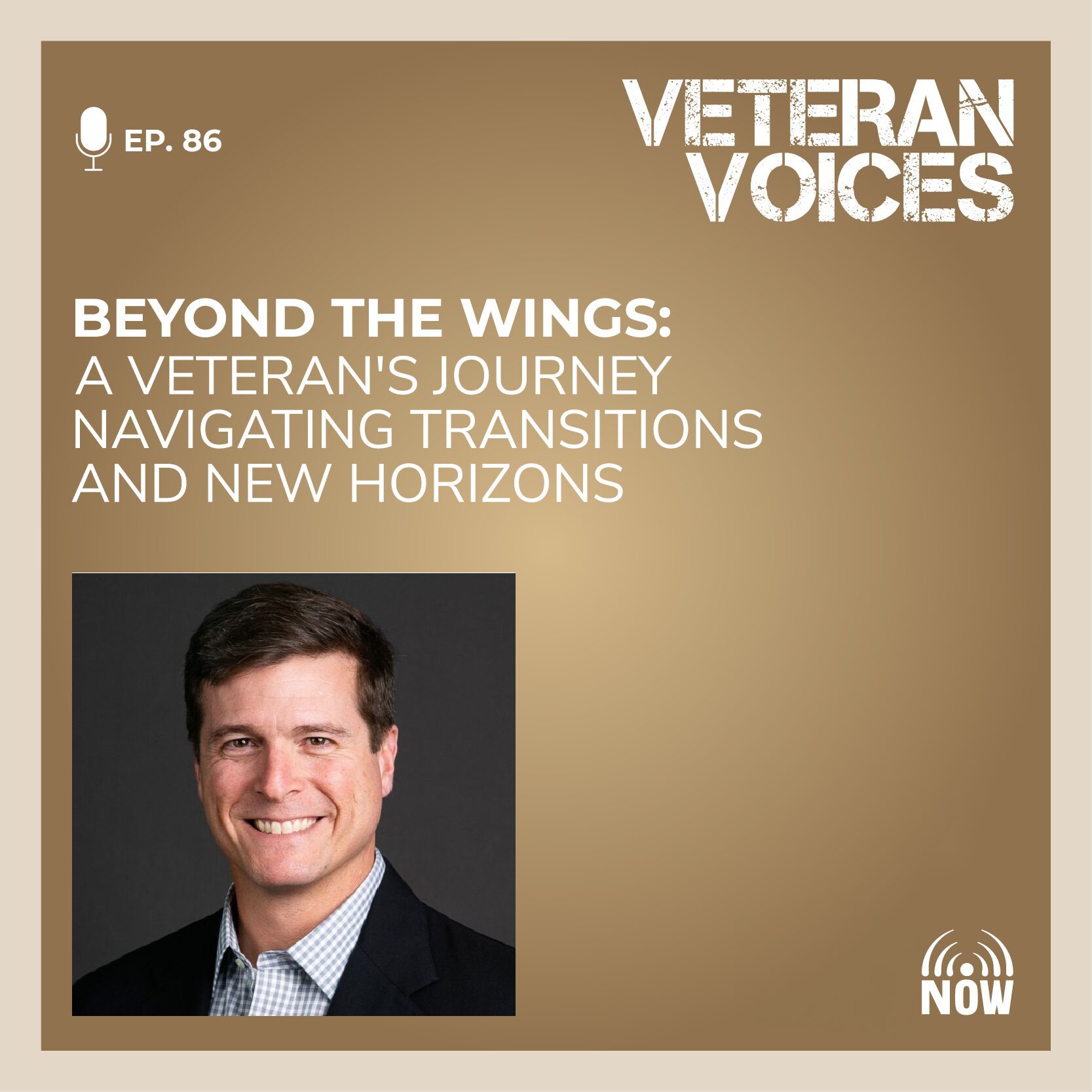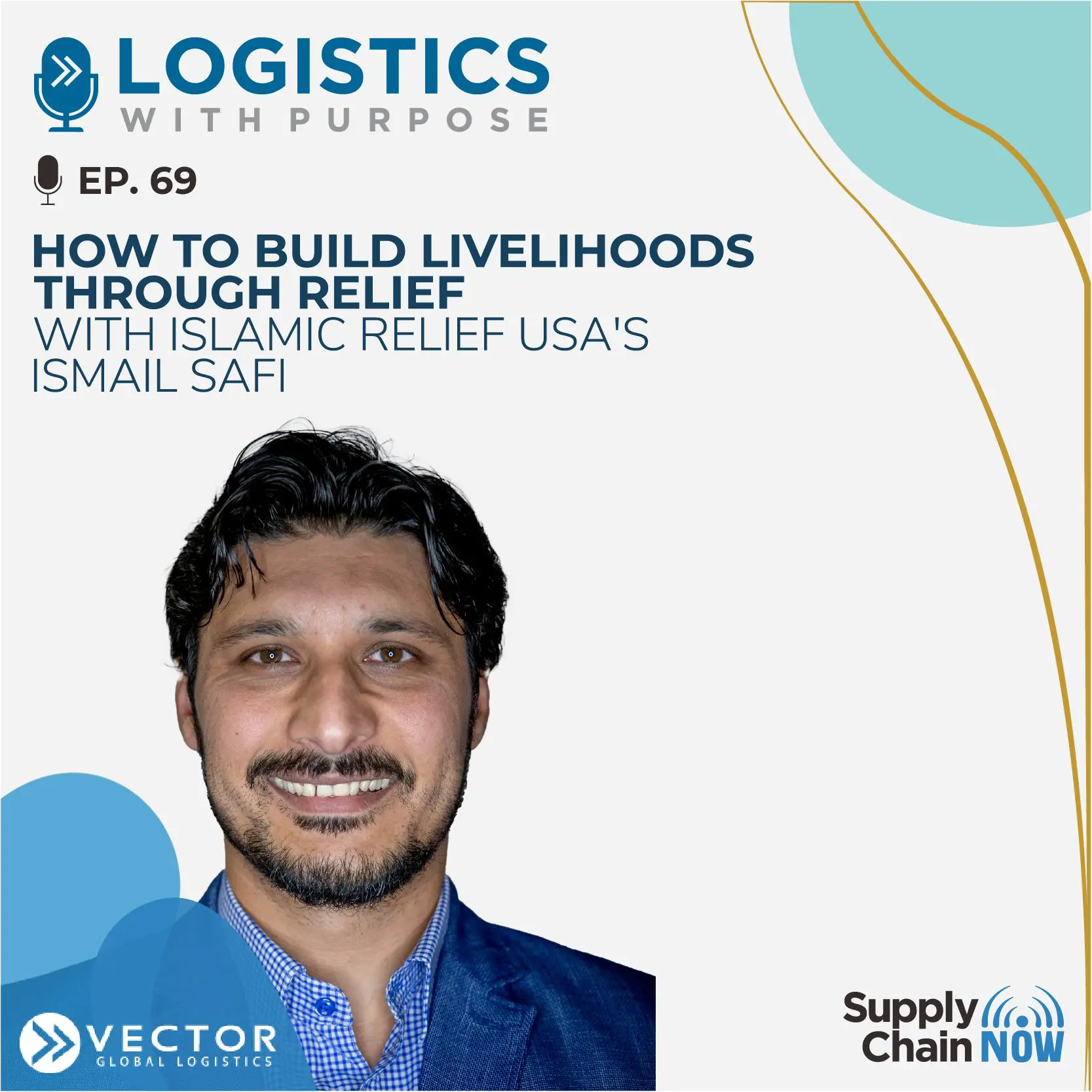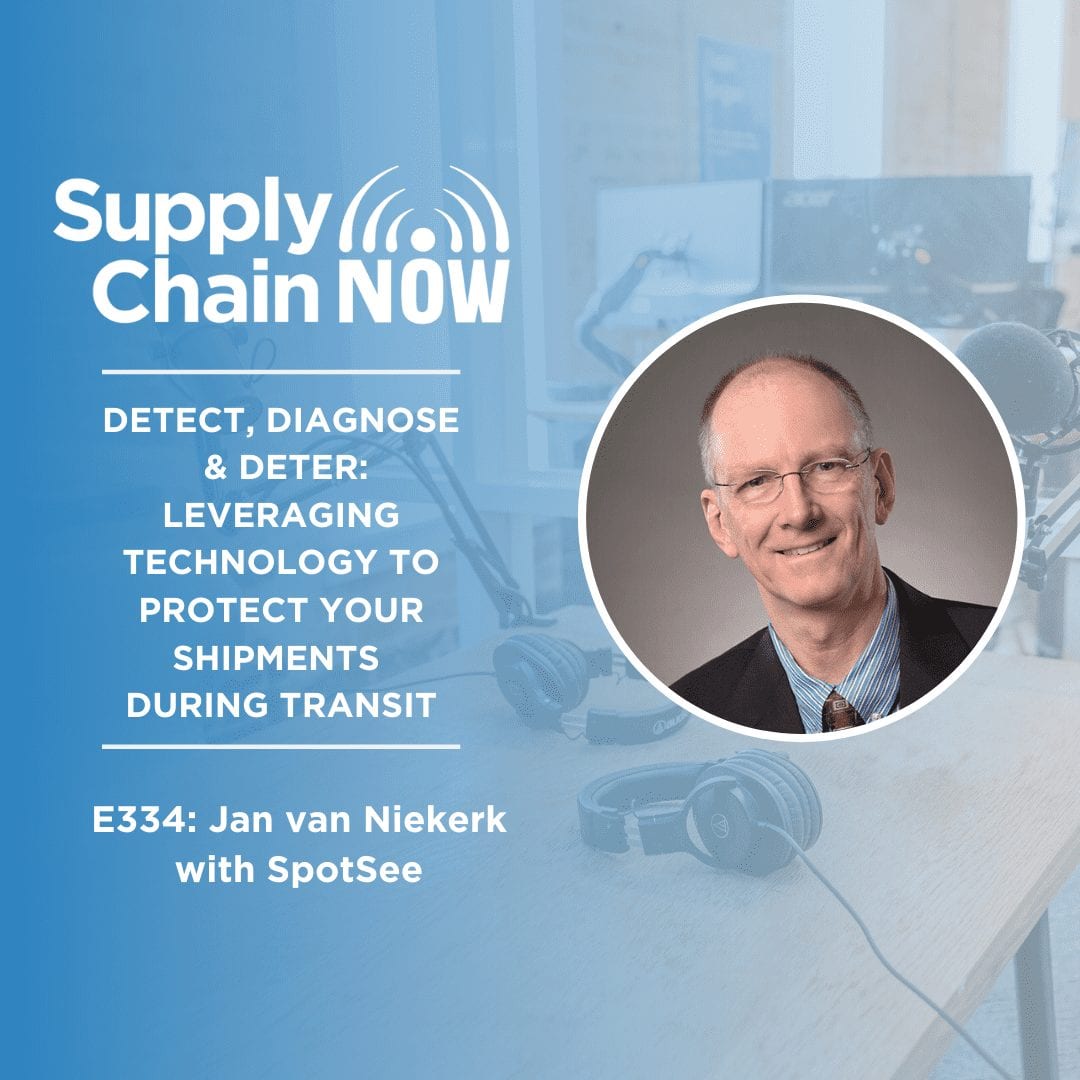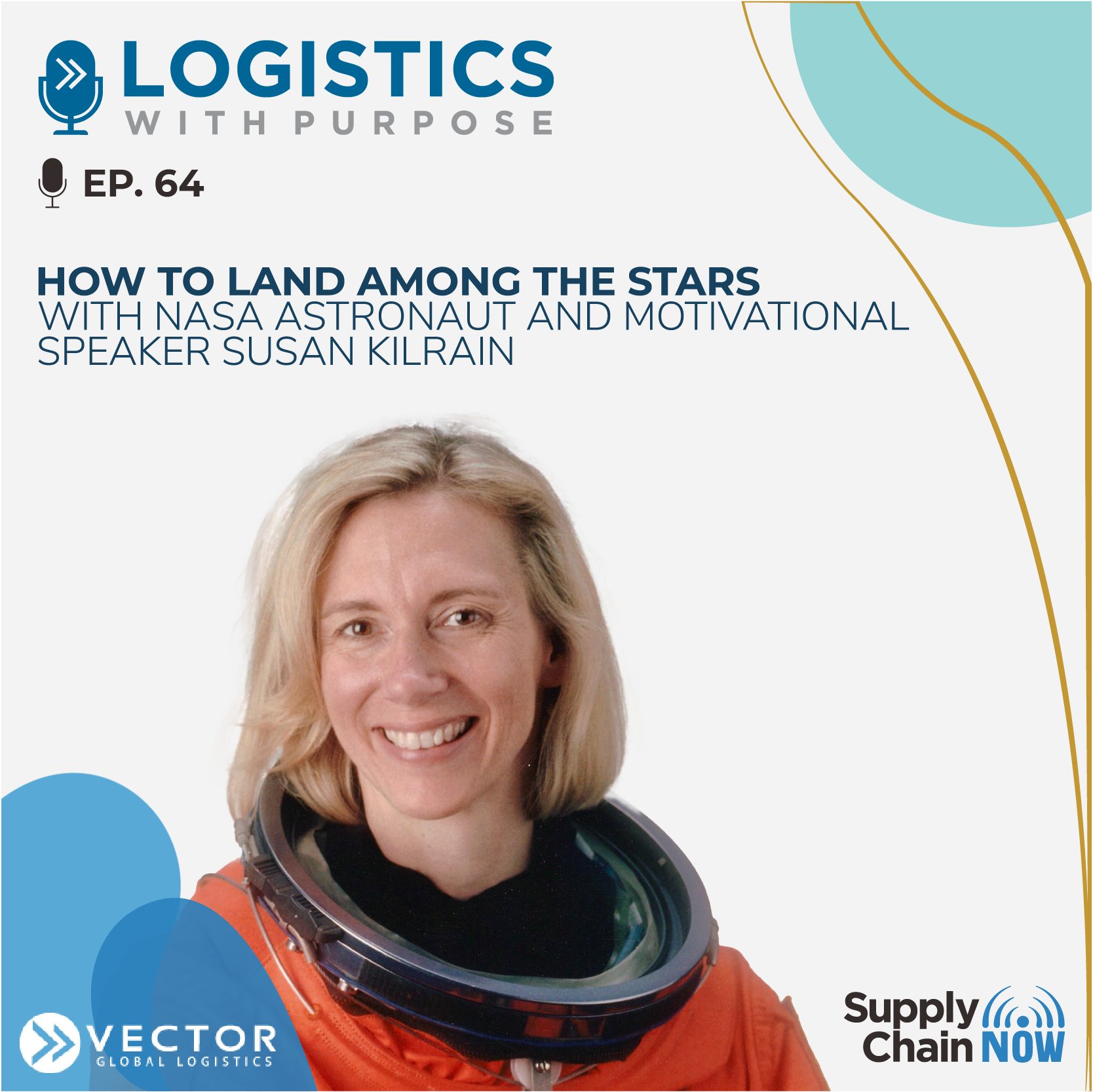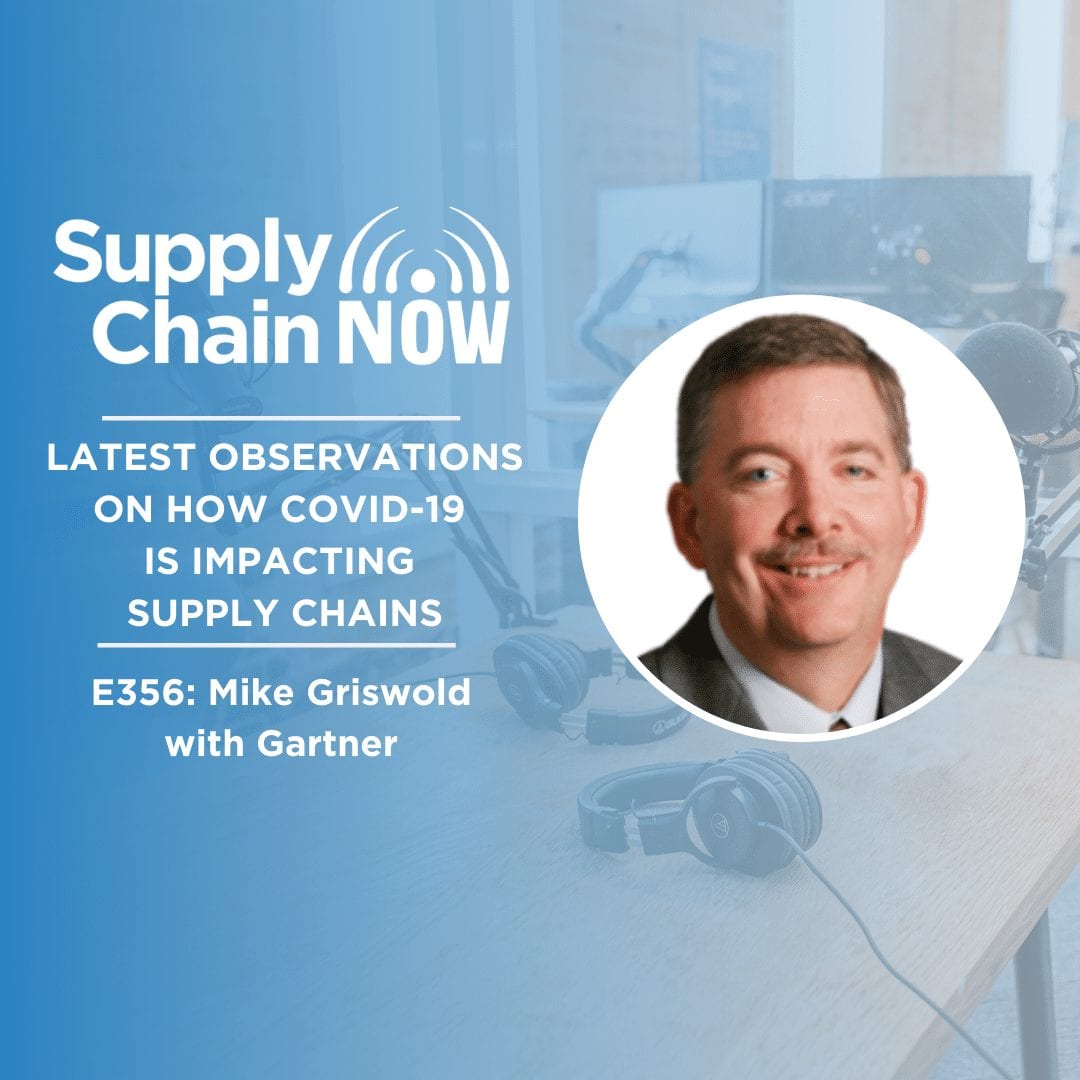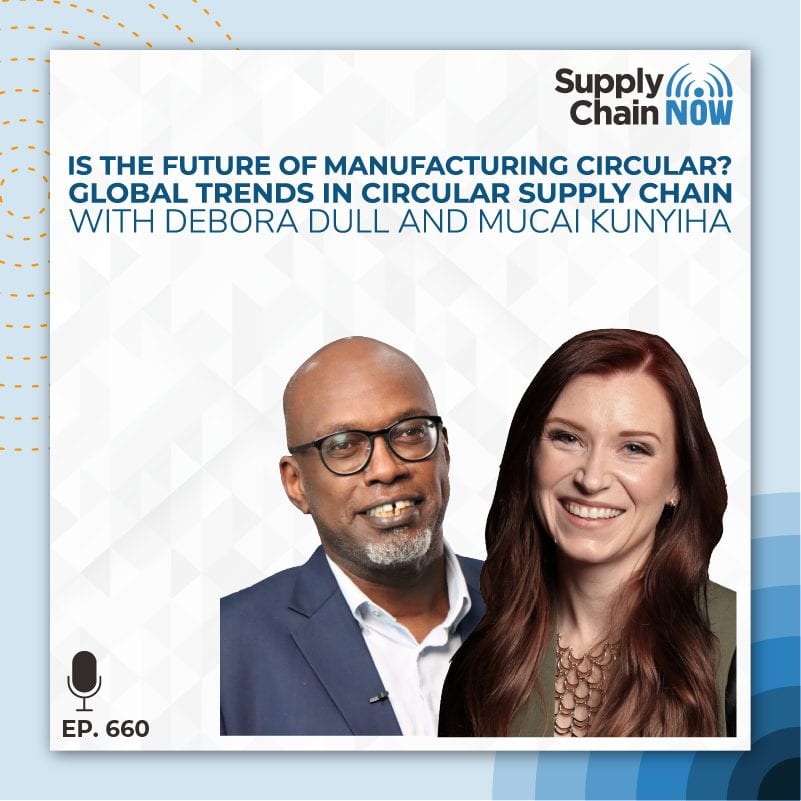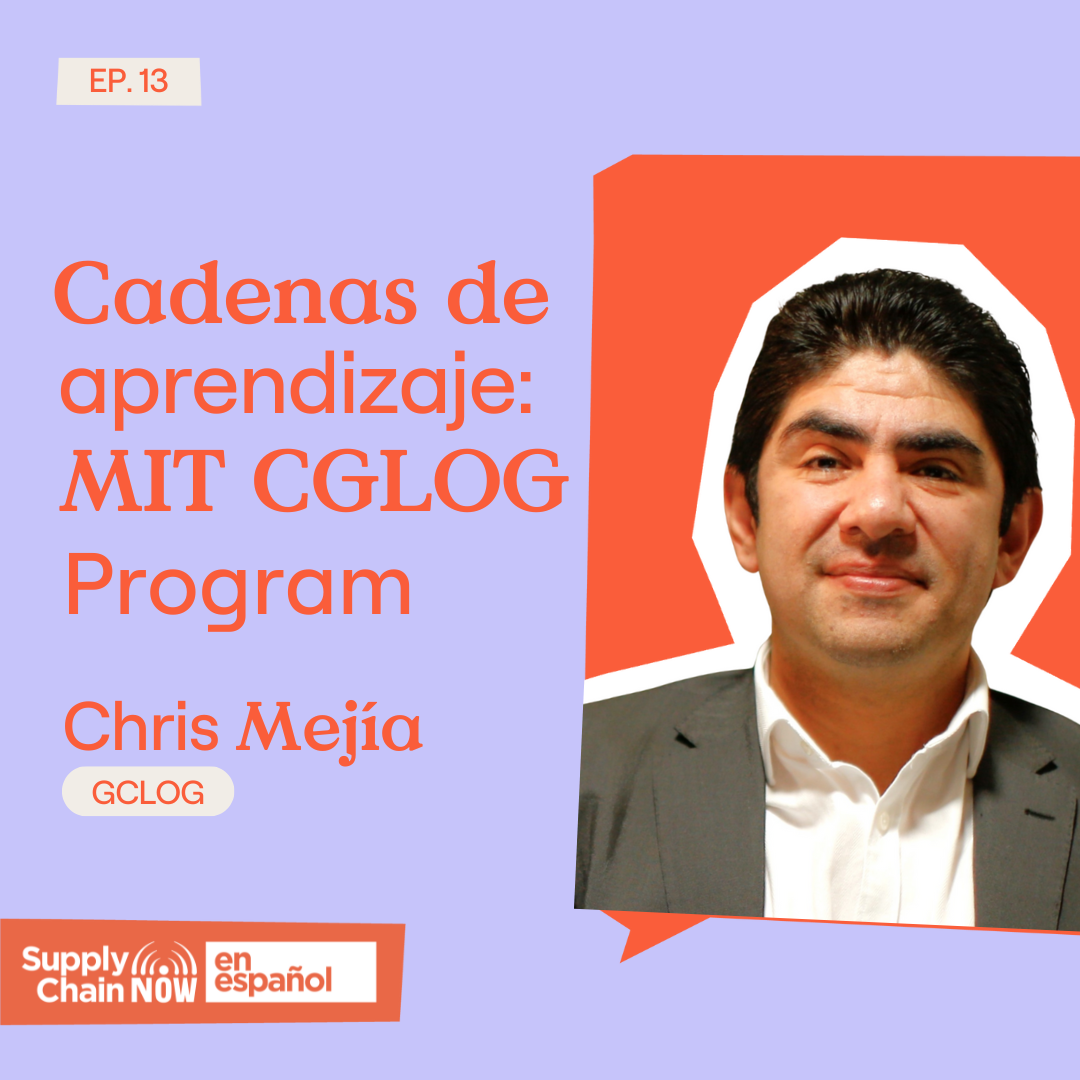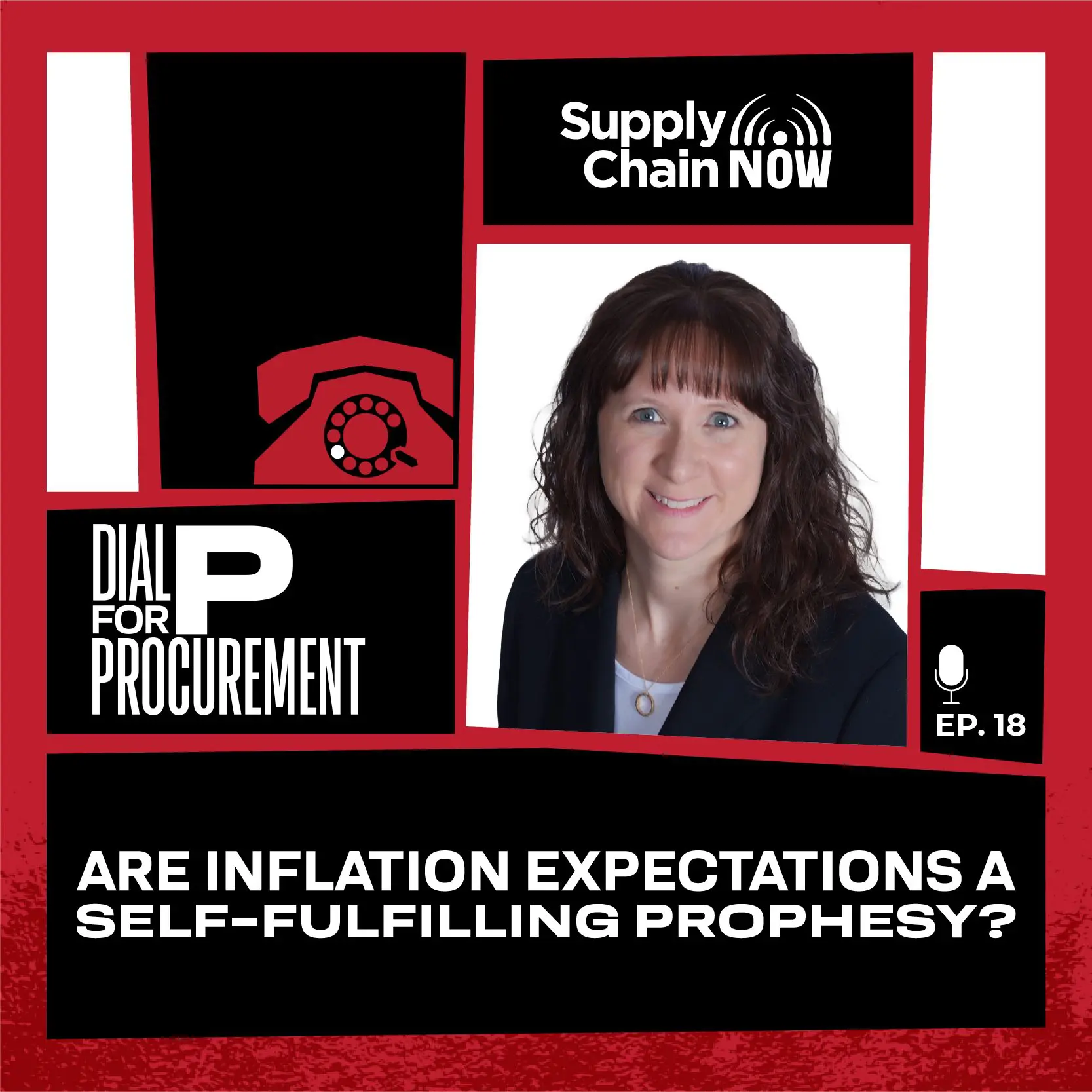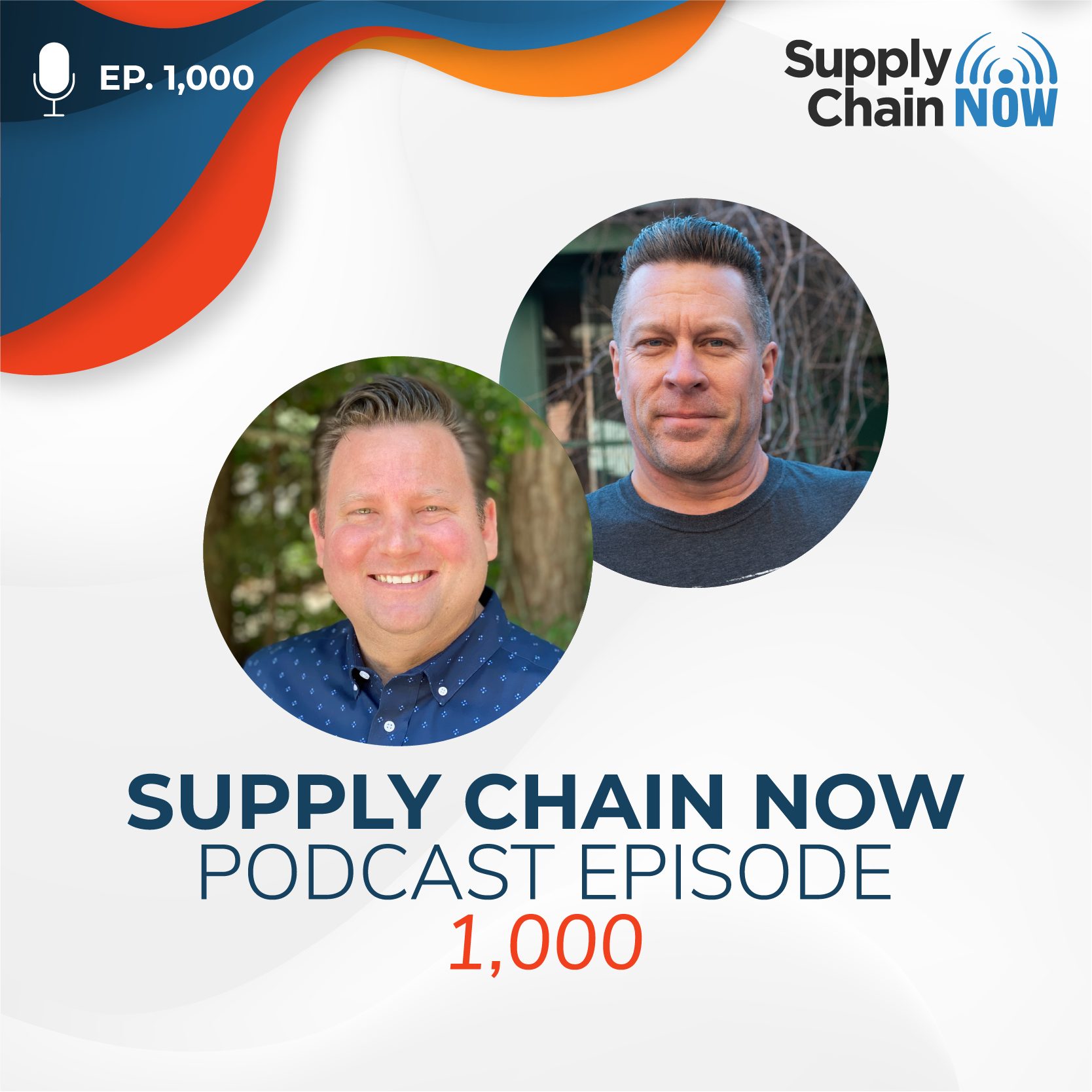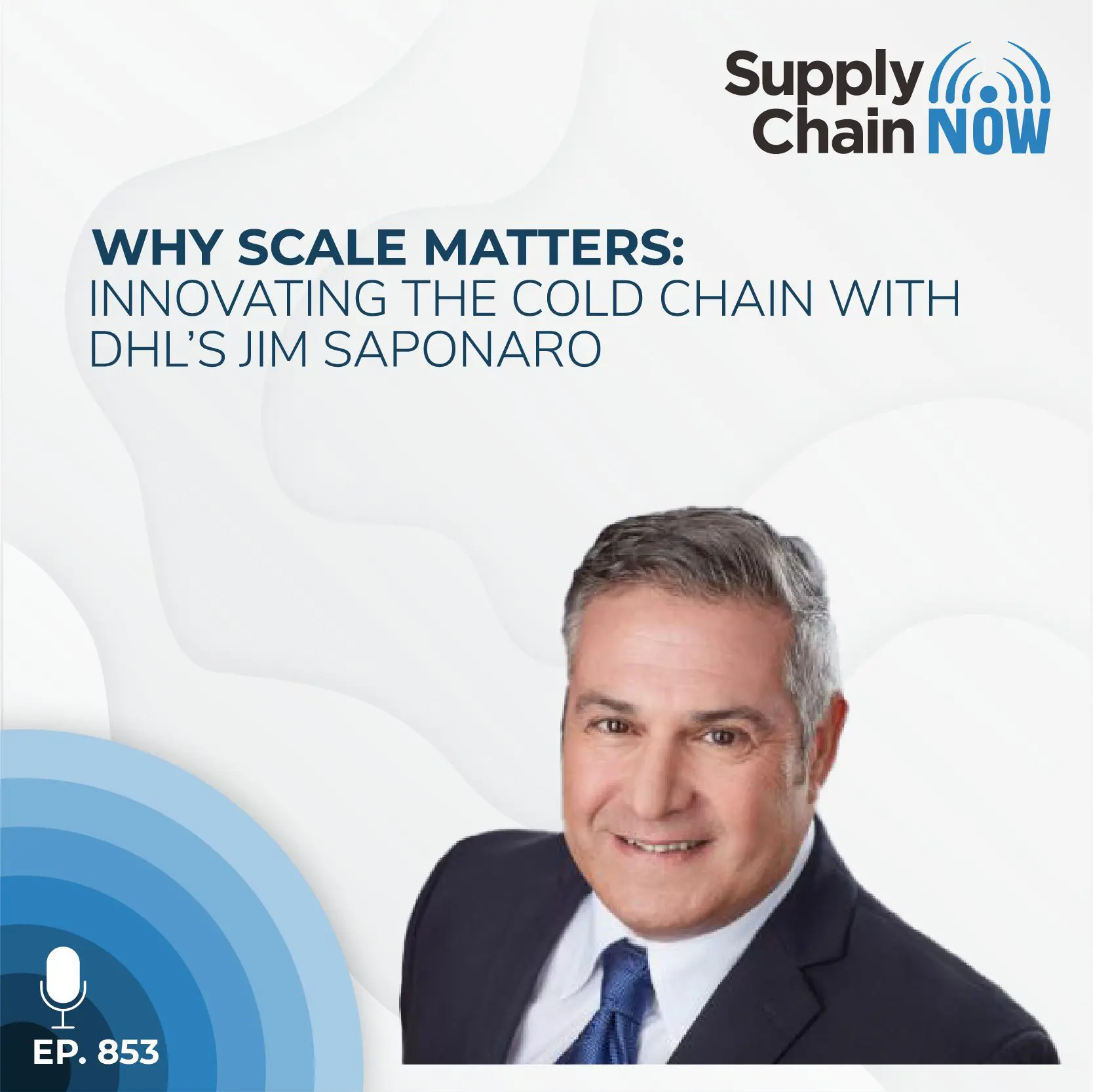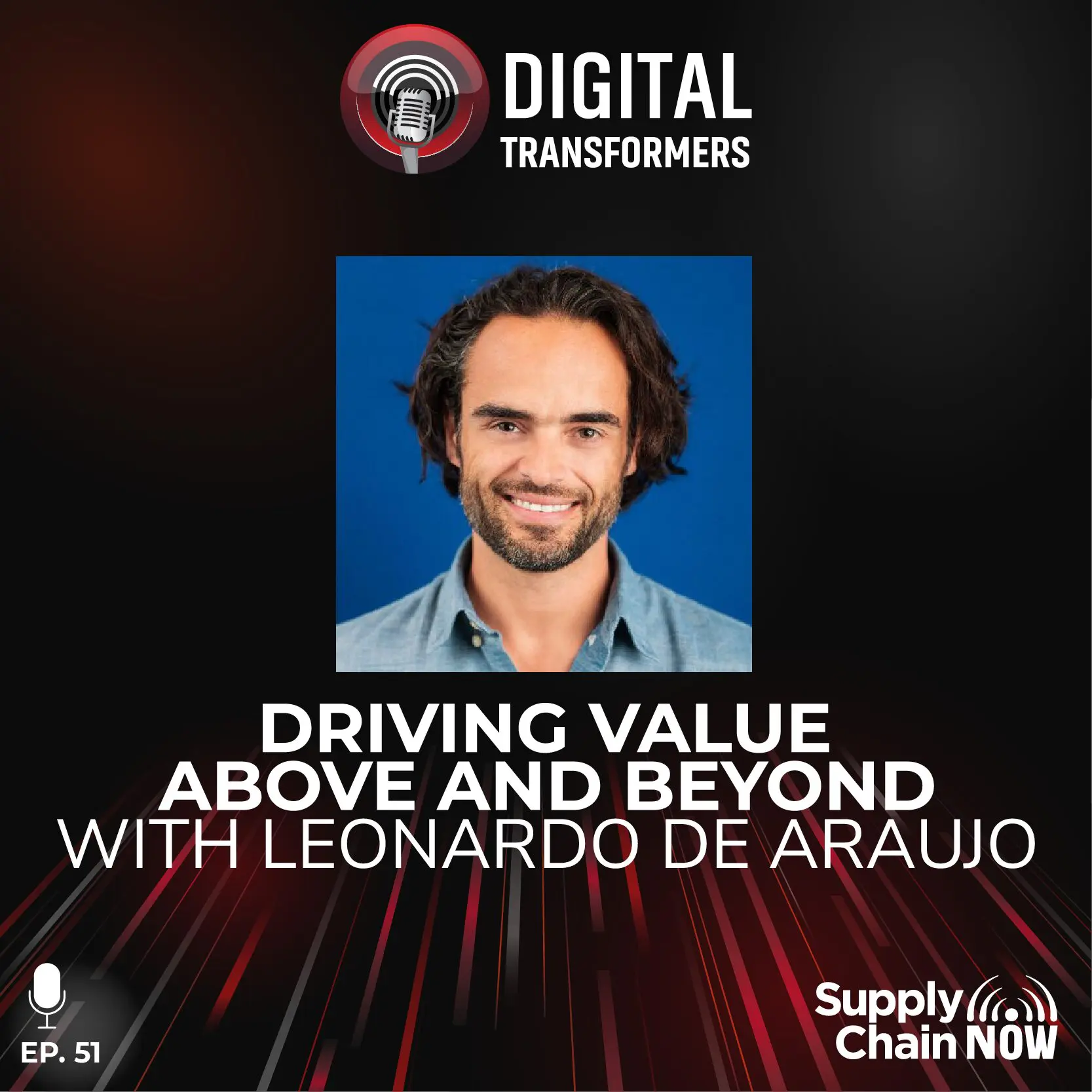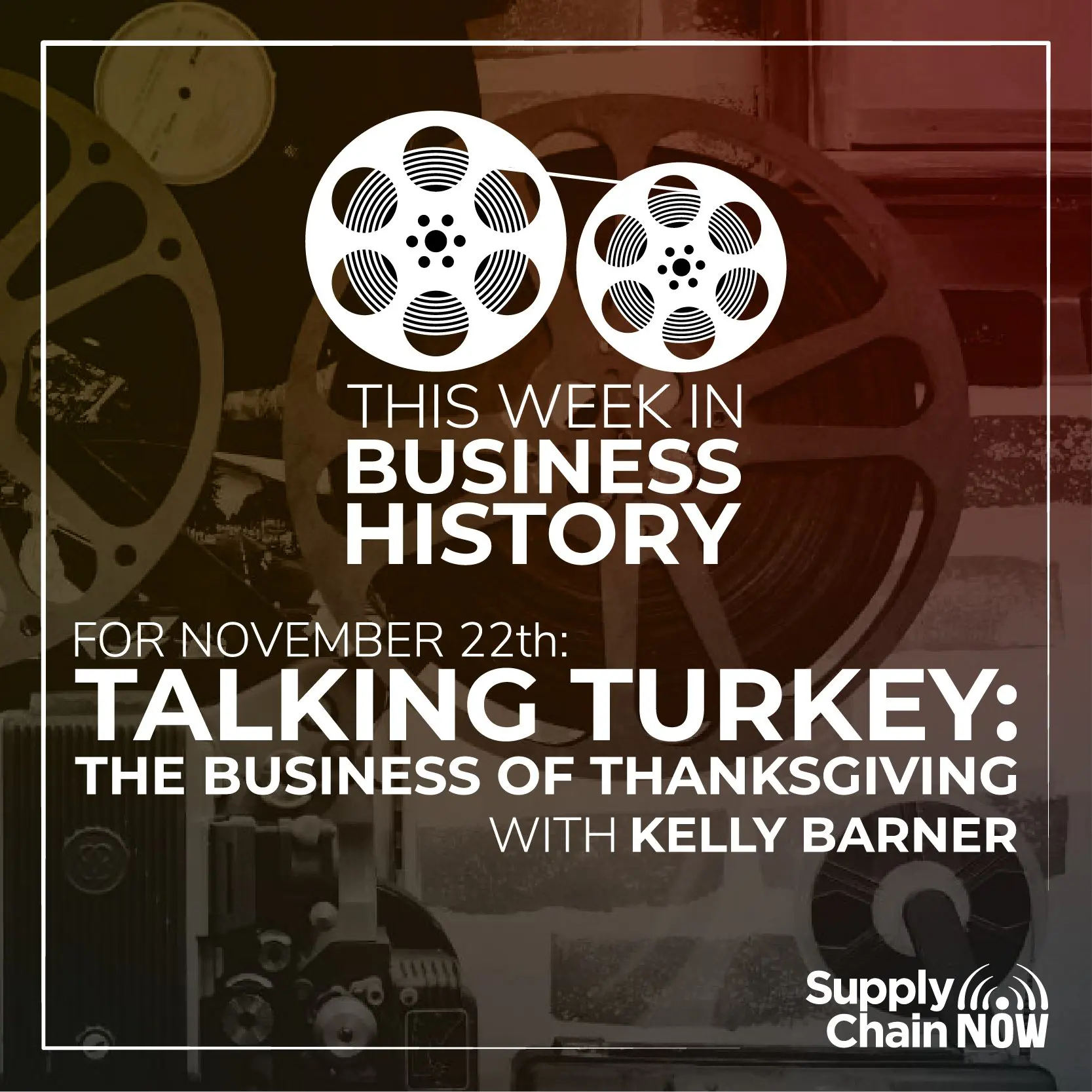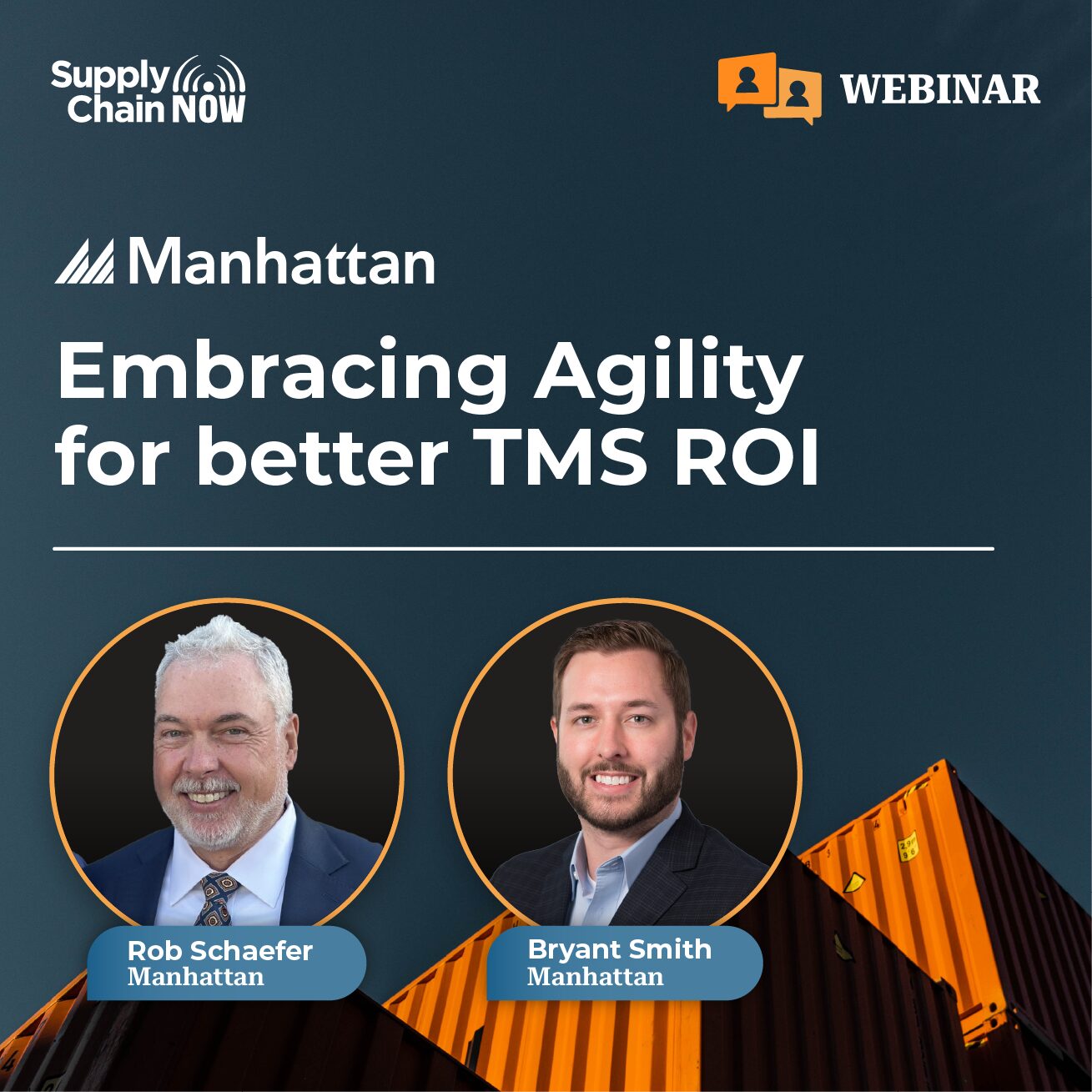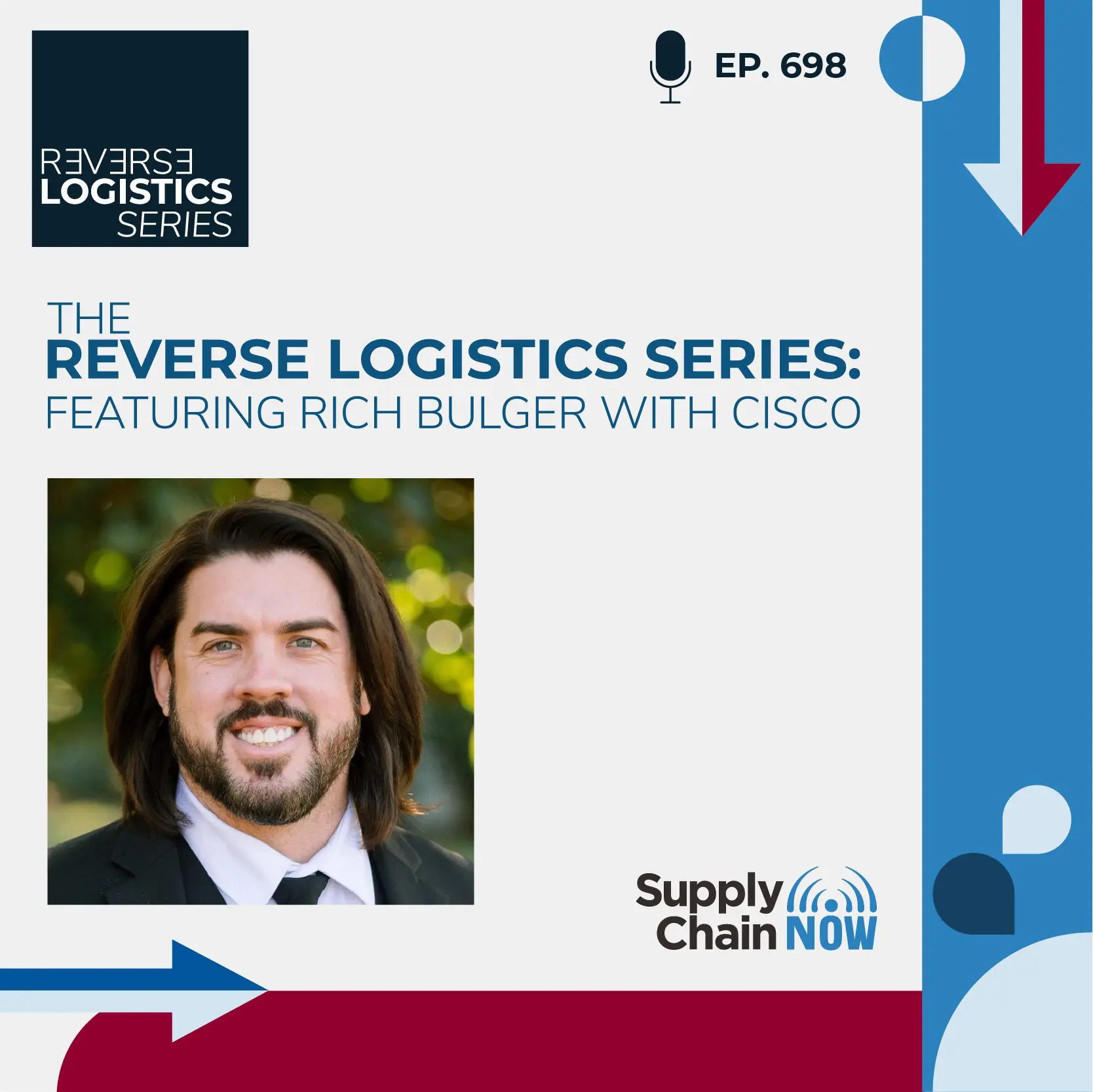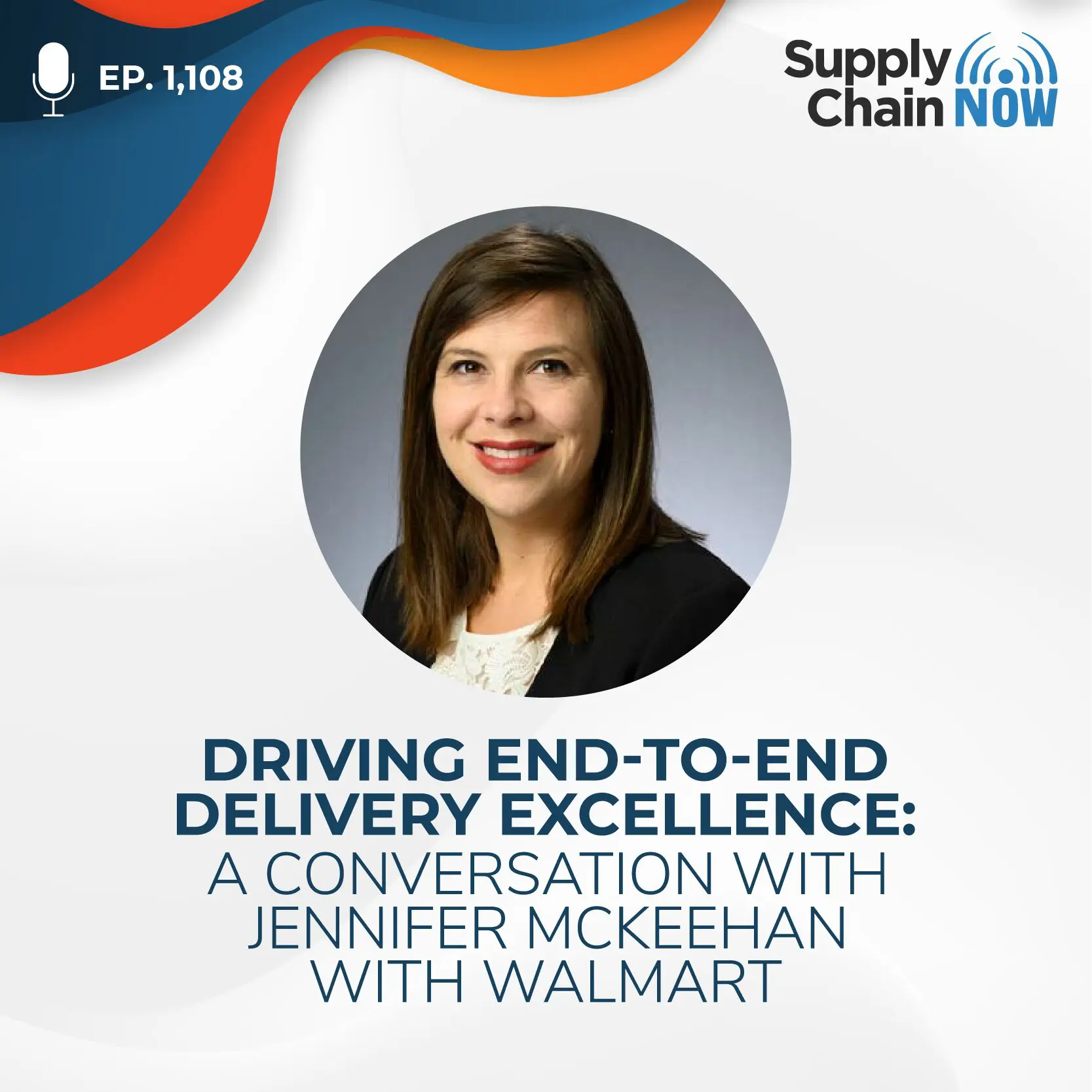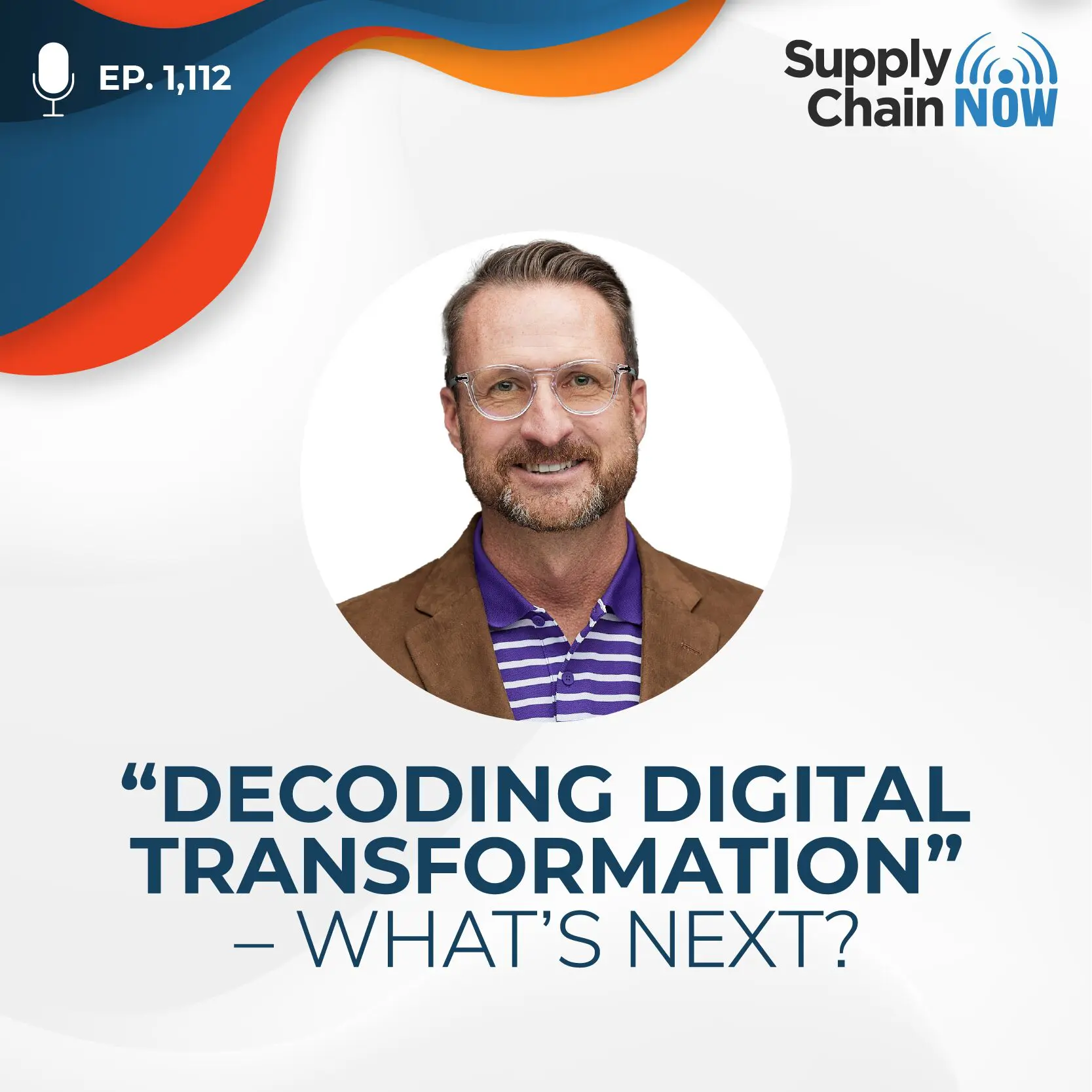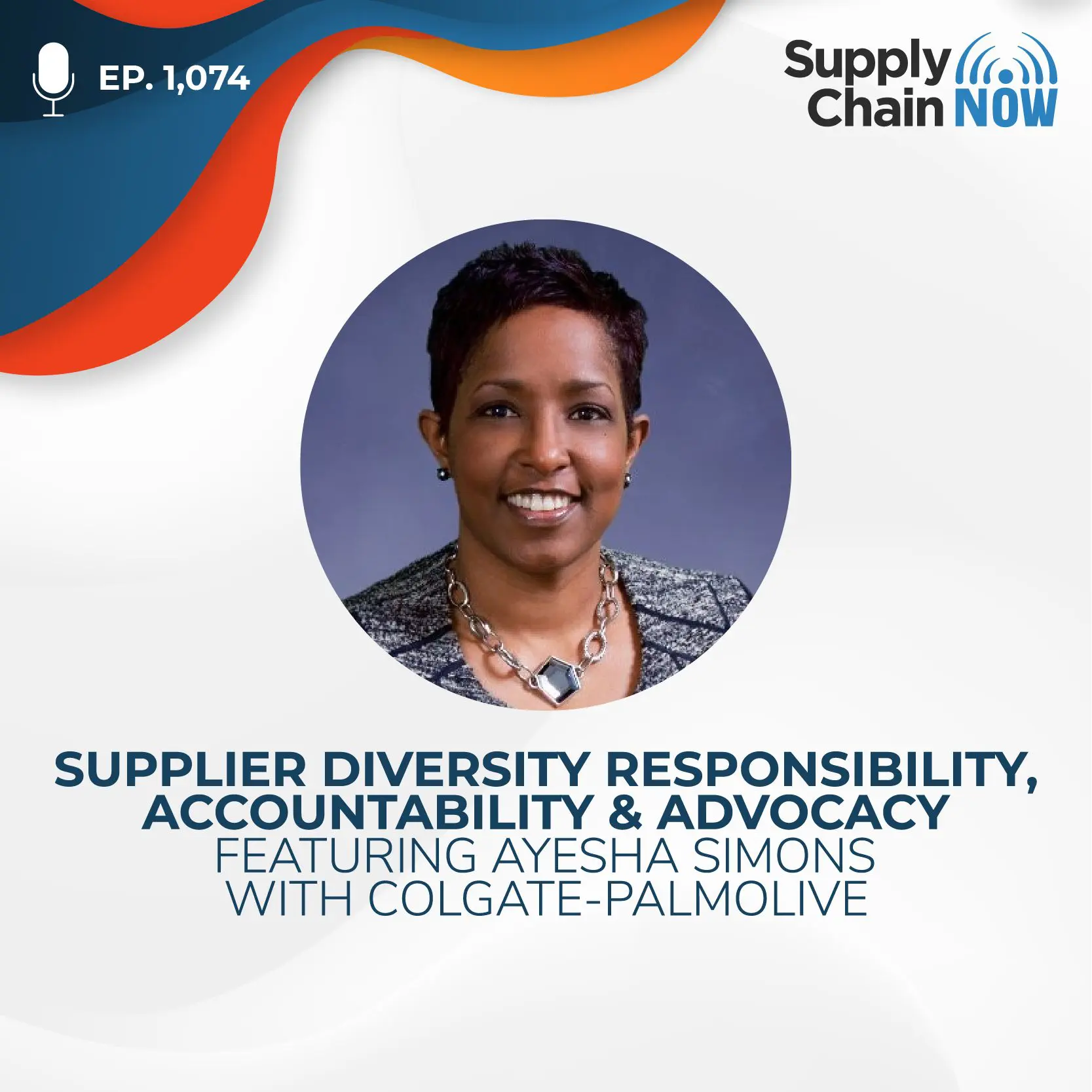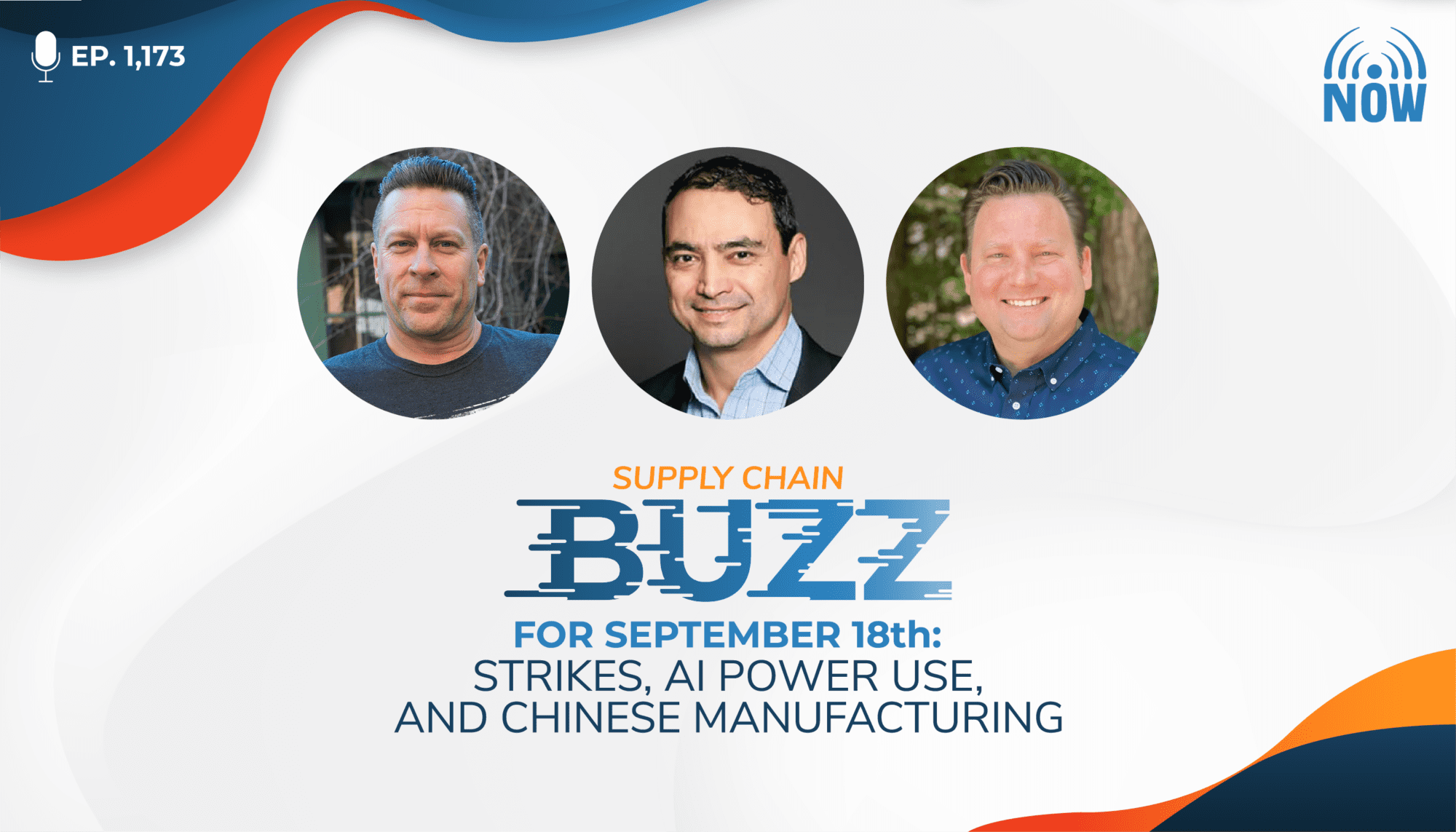
Sandra MacQuillan was one of these folks that when she entered a room, she had a presence. She had such a remarkable presence and usually left the room better than when she entered it.
-Scott Luton
Episode Summary
The Supply Chain Buzz is Supply Chain Now’s regular Monday livestream, held at 12n ET each week. This show focuses on some of the leading stories from global supply chain and global business, always with special guests – the most important of which is the live audience!
This week’s edition of The Buzz featured Scott Luton, Greg White, and regular guest host Constantine Limberakis. They started the show by recognizing the life and professional achievements of Sandra MacQuillan, former Chief Supply Chain Officer at Mondelez International, who lost her long, hard-fought battle with cancer earlier this year.
In this livestream, created in collaboration with a live Supply Chain Now audience, Scott, Greg, and Constantine discussed:
• The impact of the United Auto Workers labor strike against Ford, General Motors and Stellantis on the economy in general and each manufacturer’s supply chain
• Infrastructure investments being made by India as they try to position themselves as a competitive alternative to China for manufacturing capacity
• Increasing human rights-based regulatory pressures that are changing the calculus for companies that have historically relied upon Chinese production
• Concerns about the energy consumption required to power generative AI
Episode Transcript
Intro/Outro (00:03):
Welcome to Supply Chain. Now the voice of global supply chain supply chain now focuses on the best in the business for our worldwide audience, the people, the technologies, the best practices, and today’s critical issues, the challenges and opportunities. Stay tuned to hear from Those Making Global Business happen right here on supply chain now.
Scott Luton (00:31):
Hey, good morning, good afternoon, good evening, wherever you are, Scott Luton, Greg White and Constantine Lerock here with you on Supply Chain. Now, welcome to today’s live stream, Greg. How are you doing today? I’m
Greg White (00:43):
Doing very well. I’m glad there’s three of us here that just makes it that much more fun. <laugh>
Constantine Limberakis (00:48):
<laugh>.
Scott Luton (00:49):
I am too. And I like that shirt, by the way.
Greg White (00:51):
Thank you. Can you see the spots? Yeah. Yeah.
Scott Luton (00:54):
Looks great. Not
Greg White (00:55):
Supposed to wear this kind of thing on the air. People don’t, don’t risk it.
Constantine Limberakis (00:59):
<laugh>.
Scott Luton (01:00):
Dino, how you doing today?
Constantine Limberakis (01:02):
I’m good, I’m good. I, I think we, Greg and I planned the white, I guess. I don’t dunno if that was something Yeah, you can’t wear white after Labor Day, but we didn’t get the memo. Oh, man. But I’m good. I’m good. I, I, I, I’m, you’re
Scott Luton (01:15):
Not gonna issue any citations if we do elect to wear white the wrong time of the year. Are you Constantine?
Constantine Limberakis (01:21):
I, I won’t, but somebody else might. <laugh>.
Greg White (01:24):
I think it’s just shoes, right? Isn’t it Just shoes? You can’t wear white shoes
Constantine Limberakis (01:28):
After. I don’t know the etiquette. I dunno. I,
Greg White (01:30):
I would love for somebody to clue us into that. Obviously, we are not three fashion consultants, so
Constantine Limberakis (01:36):
<laugh>, no. Well, I’m heading to Florida tomorrow, so I’m just gonna keep wearing whatever colors I want.
Greg White (01:41):
Pastels, flip flops, man. That’s all you need in, in Florida.
Constantine Limberakis (01:43):
Whatever. We’ll celebrate Margaritaville with the, uh, you know. Yeah,
Scott Luton (01:47):
I like that game plan. And by the way, Catherine, Ann, Amanda, behind the scenes, uh, big thanks for all they do to help things go. Katherine says it’s shoes and pants you can’t wear white shoes and pants after labor.
Greg White (02:00):
Okay, very good.
Constantine Limberakis (02:01):
Okay, we got that down now. Great.
Scott Luton (02:03):
All. So we’re gonna say hello to a few folks in just a minute. Got a big show, uh, jam Up show here today. Uh, got a lot to work through, but, but first, Greg and Constantine. Y’all know where we’d like to start, right? Mm-hmm. <affirmative>, uh, we’d like to start with sharing some resources because hey, this is the Supply Chain Buzz, a live show that comes at you every Monday at 12 noon Eastern time. We’ve got a ton of news developments across global business, uh, today to work through. And hey, you’re gonna hear from Greg. You’re gonna hear from me and Dino, but we wanna hear from you. Give us your take as we work through these, these, um, topics. And if you’re listening to the podcast replay, you ought to consider joining us live on LinkedIn, YouTube, or one of your other social media channels.
Scott Luton (02:47):
If you’re choosing, we’d love to hear from you. Okay? So, resources, the long promised Greg and Dino Resources, and I’ll tell you, we had a great with that said that we dropped over the weekend and we focused on one of our all time favorites and legends and, and really not just in global supply chain, but global business. And that is Sandra McQuillan. So, uh, Greg and Constantine, as y’all both know, we lost Sandra way too early at 56 years old after a long battle, uh, of cancer. But she has kicked a massive dent in the universe. And Greg, we featured in, in this addition. With that said, we featured one of our favorite conversations, which ended up being a really a masterclass in, in leadership. Greg, your, your quick thoughts,
Greg White (03:33):
Uh, it’s a little too soon, but, uh, <laugh>, um, I mean, I just, the, you know, she was all inclusive of everything and everyone, and I just think that was what was so powerful about her. She, I think her famous quote was, wherever you’re from or wherever you do or whoever you are, if you are, uh, into supply chain, come on down. Mm. Right?
Scott Luton (03:58):
Mm.
Greg White (03:59):
So, um, yeah. And that, that was fully her spirit. So, um, but also just a fantastic leader, uh, um, and, uh, I would say inspirational speaker, though. It wasn’t like that was her goal, right? It was just who she was.
Scott Luton (04:15):
Right. Well said. Constantine, uh, I’m not sure if you ever met Sandra or I bet No. You’ve been around leaders like that, your thoughts.
Constantine Limberakis (04:23):
Yeah. Well, I mean, obviously representing, uh, women in leadership roles at Mondelez is an incredible, uh, output. And, you know, uh, the fact that she lost her battle of cancer, I can, I can, I can, uh, I can help, uh, attest to that as a cancer survivor. Mm-hmm. You know, we do what we can. We conquer the big C and those of us that came before us, we’ll just remember ’em and, uh, what they get, they go through to make it better. So mm-hmm. That’s great that you guys have a fond memory of her.
Scott Luton (04:53):
Well said. Uh, Constantine, two, two final thoughts there on, uh, the late great one and only Sandra McQuillan Greg, and you’ll, I think, resonate with both of these. Uh, first off, the last time we spoke with Sandra, which, which unfortunately was just, uh, about a month and some change before she passed, she was still passionate about driving good change and helping, helping make the world a better place, especially in the healthcare space. And man, that spirit that you were referencing a second week ago, Greg came just shining across the Zoom platform. And then secondly, uh, uh, you know, when the first time I met Sandra in person, man, she was one of these folks that when she enters a room, you know, um, she had a presence. She had such a remarkable presence and, and, and usually left the room better than when she entered it.
Scott Luton (05:45):
So, um, anyway, y’all check out. With that said, we offered some highlights of one of our favorite conversations. We are fortunate to have, uh, several conversations here, uh, with, uh, Sandra. So y’all check that out. Uh, and Link is in the, um, the comments. Greg and I do want to invite you to join us this Wednesday at 12 and Easter time, as we welcome back our friends from Rate Links to dive into three ways, a top T m Ss, uh, extends the power of Microsoft Dynamics. So y’all check that out. The link will also be in the comments. Okay. So Greg and Constantine, we’re gonna say hello to a few folks. Uh, and then we’ve got four big stories to walk through here today on what is a gorgeous here in Atlanta, the Atlanta area, at least, Greg, I think it was 68 degrees this morning. Wow. Uh, as I, as I walked Ben to, might, might about, I might be getting a little <laugh> a little off, but it was cool. I grabbed the jacket as I walked Ben to the bus stop this morning, and it was just gorgeous. And I think down your neck of the woods is really pretty as well, Greg.
Greg White (06:48):
70 degrees on the beach in just the slightest hint of coolness in the air. You know, it’s always humid. Oh, but it so much less so, which is amazing when you have a big giant lake right next to you to think that it could ever be less humid, but it somehow is. Um, but yeah, so
Scott Luton (07:06):
True.
Greg White (07:06):
Yeah. Almost had to wear socks on my weekly or my morning run today, <laugh>
Scott Luton (07:12):
And Dino up in the Chicago area. Is it nice and crisp yet? Oh,
Constantine Limberakis (07:17):
Yeah, it is. At, at, uh, five 15 when I did my workout, it was 56 degrees. Nice. But it’s gonna be in this early low seventies, so it’s very, very dry. We had a huge rainstorm last yesterday. It was raining all day. But this weather is beautiful. It’s
Scott Luton (07:31):
Like, it’s, yeah. Next, uh, uh, early fall and early spring. Two of the best times in on the planet in Southeast at least. Um, okay. We got a bunch of folks here with us today, and we may not be able to hit everybody, but I wanna say hello, Greg and Constantine de course. Josh Goody from Seattle is back with us. Happy Monday. Everyone made the caffeine hit your system before the software update. Headaches start. Oh, we’re all getting sounds
Greg White (07:57):
Like somebody that may have gotten a software update today, <laugh>.
Scott Luton (08:00):
That’s right. Something like that. Uh, hey mom, Lee Luting, the pro making South Carolina. She says, I’m Hey Constantine. Uh, great to see you, mom. Love you. Uh, Walid from Bangladesh is here via LinkedIn. Great to see you, uh, uh, Azua from Frisco, Texas. It is so great to have you back, Greg. You remember when me and you and Jenny, uh, we’re able to sit down and have a conversation. Yeah. With Azua long, too long ago. We’re gonna to have you back. It was
Greg White (08:28):
Like a long time ago. Yeah.
Scott Luton (08:29):
Hopefully Frisco is nice as time of year as well. Let’s see here. Belinda is with us. Great to see you, uh, gift from South Africa via LinkedIn. Wonderful. Lucia, love your name as well. Emmanuel from Nigeria is with us here today. Welcome, welcome. Steve. Natalie, uh, a couple hidden users. And finally, uh, Abdu from Algeria via LinkedIn. Great to have y’all here. Okay. Greg and Constantine. Man, we got so much work to get into today. Y’all ready to dive in?
Greg White (09:01):
Let’s do it.
Scott Luton (09:02):
All right. Yep. So let’s start with our first story here. And y’all know where y’all probably know where we’re gonna be starting. Uh, first story is the labor strikes at Ford GM in Solanis. Roll right into a new week, uh, here reported by C N N Business. The United Auto Workers contract covered about 145,000. Union members at the three automotive companies expired last Thursday at midnight. Most everyone knows that Ford General Motors and Solanis did, you know, make up about 40% of the United States auto market. And so far, just under 13,000 workers have begun strikes at three targeted facilities. A GM plant in Wentz, Wentz, I’m sure I’m saying that wrong, Missouri Ford plant in Wayne, Michigan, and Alanis Plant in Toledo, Ohio. I always think of Holy Toledo from the old Batman series. When I see Toledo <laugh>, uh, of course, these targeted strikes have a ripple effect across each automaker’s supply chain, creating plenty of other challenges. Talks were set to resume yesterday. Uh, and two other points, uh, as of just about an hour ago, the u a w has rejected the latest labor offer. And as many of you may know, this is the first time that u a w has gone on strike against three automakers all at the same time. Now, Greg, your thoughts on, uh, the situation here,
Greg White (10:21):
Uh, I forgot that yet, another company owns Chrysler. So for people who knows that that is STIs, I think that’s a division of fiat. Is that correct? Mm-hmm. <affirmative>,
Scott Luton (10:31):
Yeah. Mm-hmm.
Greg White (10:32):
<affirmative>, remember the old joke, Dino, um, how do you say Daimler Chrysler and German? The Chrysler is silent. <laugh>. Um, that’s what all my German friends <laugh>.
Scott Luton (10:42):
Well, the fiat
Constantine Limberakis (10:43):
I know is Fix it, fix it again, Tony. So, I don’t know,
Greg White (10:45):
<laugh> another symptom of one of the most classically, most poorly run automotive makers on the planet, um, is that they’ve been acquired yet again and are in trouble with their unions along with the other makers. This is a really coordinated, I don’t know what else to call it, but attack to try and force the automakers to make dramatic concessions. The U AAW is asking for upwards of 36% increase over the next, I’m sorry, I forgot the timeframe. Four
Scott Luton (11:17):
Years, if I’m not mistaken.
Greg White (11:18):
Four years. There you go. Yeah. Um, so that’s a substantial increase. Their argument being, well, I’ll let, I’ll let Dino take that, but they feel like they are being under compensated relative to other members of the organization. The difference just, well, let’s get into that later. Um, <laugh>, yeah. So I mean, they look, they don’t have bad reason to do this. I just think they have bad timing on this because Yeah. Um, it’s, it’s a challenging time because, uh, we, well, these are still makers of fossil fuel vehicles, um, in companies that are struggling to come into the new age of automotive technology. So it’s, it’s a dangerous ploy. I I think maybe they’re just trying to get, while the getting’s good. Mm-hmm. In case, you know, in case moving to EVs breaks the back of these old-fashioned automakers. That’s
Scott Luton (12:12):
Right. And, and in particular, gm, of course, has particularly struggled with launching and ramping up their ev uh, vehicle portfolio. Constantine, your thoughts?
Constantine Limberakis (12:23):
Well, I, I think you were intimating at this, Greg, and I thought I’ll just bring up the statistic of what they’re, what they’re, they’re fighting about, I guess they said in the article itself, they talked about, I think we, between 1979 and 2022, inflation adjusted annual wages of the top 1% of workers rose 145%, while the average, uh, it says here, annual wages at the bottom, 90% rose only 16%, about a 10th as fast. And so their, their point is, is that, and this is according to the Economic Policy Institute. Hmm. And so their, their point is, is that we need to increase their wages of these workers, so that to be more commensurate with the C-level where their wage, you know, their wages have gone up much faster and much higher. So I think that’s the basis
Scott Luton (13:09):
Basis. Yeah. Agreed. Agreed. So we’ll see, as we mentioned, as Constantine brought to us, uh, Greg in the green room just before we went live, the latest deal has been rejected. And Constantine, I think that latest deal was 21%, or was the latest offer from, uh, the automakers? Yeah, the
Constantine Limberakis (13:27):
Counter, I think from the automakers is a 21%, and they turned that down.
Greg White (13:32):
I mean, I think this is, I think it’s all good for the workers. I, I can’t, I don’t know. I mean, it’s really hard because the labor burden is so heavy for these automakers, because they also, because of the union, have had to employ people that they really don’t need and have to had to eshoo automation, kinda like the rider strike mm-hmm.
Constantine Limberakis (13:51):
<affirmative>,
Greg White (13:51):
Mm-hmm. <affirmative>, um, mm-hmm. <affirmative>, they’ve had to eshoo automation, um, because they’re employing people that could probably should and probably should long ago, have been replaced by automation. It’s a huge burden for them. And I mean, I think it’s real. We’re really at danger of, of breaking the backs of these automotive makers. And, um, it’s one of the reasons why reshoring is challenging. I mean, we talk a lot about reshoring efforts, but reshoring is mostly manifested itself not in the United States, but in particularly Mexico, but mm-hmm. <affirmative>, u other U S M C A countries, which there’s only two. So I bet you can guess where
Constantine Limberakis (14:32):
<laugh> <laugh>,
Scott Luton (14:34):
Uh, excellent point. Excellent point. Hey, uh, I gotta revisit something that, uh, Greg, I think, uh, we didn’t, I wanna make sure it gets full, uh, spotlight. So, Tony, you mentioned what the fiat name stands for a second ago, but I’m not sure if Greg and I heard you. What was that again? So,
Constantine Limberakis (14:51):
Oh, so, so when I brought it up, so Fiat, uh, stood for it, at least for in Chicago. I’m sure it was a wider, it said, fix it again, Tony is what it <laugh>,
Greg White (15:01):
Fix it again, Tony,
Constantine Limberakis (15:03):
Because you know, that’s no kidding. Broken. I need to fix a cut again. Well, and again, you know, they had their issues because again, trying to con, you know, compensate for the North American market where, you know, these things wouldn’t survive. But the thing I never understood is the tea and the Fabrica, al Dino, Ian Turrin is where these things are made. So, I mean, you would think in northern Italy, they’d be able to handle the winter, right? So, I, man,
Greg White (15:34):
I, well, I, you know, some of these old European makers, they can overcome about any advantage. <laugh>, I mean, English automobiles still have terrible electrical systems and leak oil. So, I mean, how long have they been making cars over a century? You’d think they, they would that out. And I
Constantine Limberakis (15:50):
Apologize for butchering the, the Italian language. I got the Torino part and I got the Fabio, but the other two, I think bil some, somebody in Italy, please help us out. Okay. <laugh>,
Greg White (16:01):
I think you did a great job. And as you’re a very, very close neighbor and historical, uh, participant in society there, we’ll, we’ll, we’ll take that. I think you’ve got, you’ve got the right to dip in. That’s okay.
Constantine Limberakis (16:12):
<laugh>.
Scott Luton (16:13):
Hey, uh, a lot of good stuff. This is just the first, the first development we’re covering here today. Folks wanna hear from you. Give us your take on these situations, and where do you think we go from here? Uh, but let’s move along to the next story. This is a, I think this is a fascinating, um, uh, dynamic here in 2012. Mm-hmm. It really, it’s been for, for years now, right? Mm-hmm. <affirmative>, uh, and this second story is reported by our friends at Wall Street Journal. We’re gonna move our focus from North America to India, which is making big, big investments in its infrastructure as it competes more and more with China for the world’s manufacturing needs. In fact, did you know this folks foreign investment in India hit $50 billion in 2022? More than double what? It was in 20, in 2012, just 10 years prior, new roads and improved transit system, and expanded nail, uh, rail, not nail network, rail network probably gone <laugh>, energy infrastructure enhancements and a whole bunch more. Get this. In 2013, India had 49,000 miles of national highways. Now, with all this flurry of activity, India now has over 90,000 miles of national highways. And the country can also tout that it has more miles of electrified railway than France or the United Kingdom. Ton of activity going on in India. Uh, so Dino, in this case, I’m wanna start with Hugh. Give us your thoughts on what, uh, the Indian government and, uh, market is up to.
Constantine Limberakis (17:43):
Well, I, I mean, I think we’ve traditionally, even on some of these, uh, podcasts we’ve talked about, where there’s always been traditional challenge in India with infrastructure, trying to get foreign direct investment people to invest in manufacturing. But because of what’s going on with the shift from China, this is a huge impetus. I think we know in the article too, that some of the disruption, particularly in this region in Mumbai, it was the issue was with the states that were not getting along. And I did some statistics on looking at comparing China and India. And if you look at the countries themselves, there’s 22 official languages in China across 28 states. Now, we know that Mandarin is the main language in India, I’m sorry, I got that wrong. 22 official languages in India, and 28 states in India. It, in China, there’s 13 languages and 23, uh, regions, including autonomous regions.
Constantine Limberakis (18:32):
And so they’re similar in the makeup, and this the challenge of languages, but China’s always had that infrastructure down. So I think they’re really ramping this up and trying to become this global set trend setter. They just had an announcement with the whole issue in space, right? They landed on the moon, they’ve made their presence known. And I think this is just even more effort that’s just pushing the envelope to say, look, we need to now improve our infrastructure because we’ve got a lot of smart people. Let’s do this and become a, a, a leader. Uh, and I think that’s what this represents. Um,
Scott Luton (19:07):
Love it. Uh, Constantine, I love the mention the moon mission, I thought was fascinating, but Greg, give, let’s give your thoughts on what’s going on India.
Greg White (19:15):
I think this is really important for the United States particularly, but I think other, other places that have no choice but to import a, a large portion of their goods because they either have too old as they do in Europe, too small as they do in Europe, or too expensive of a workforce, um, which they have in all in, of course, Europe and the United States, and many, many developed countries. Right? So I think this is really important for us because as you know, I believe China can’t be trusted, and it’s inevitable that one of these two countries will become the next, the next world superpower us is on the decline and, uh, or approaching decline. But we would all much rather have India, then China become the next world superpower, right? We can trust India, right. Uh, the, the government of India, right? Of course, it’s, this has so little to do with the people of any of those countries, because we’ve got a ton of Chinese and a ton of Indian people here in the States, and they’re all great. It’s just the government is, um, so dangerous in China. Mm.
Scott Luton (20:25):
Agreed. So let me ask y all this, what, uh, out of all of the different pieces of infrastructure that I mentioned, and of course what we found, uh, uh, in the report, what do y’all think is, uh, one of the most intriguing aspects of where they’re investing their, their dollars?
Greg White (20:44):
I think the, the one that that stuck out to me was, uh, the freight rail, where now it’s 14 days to get between destinations. Mm-hmm. And they want it to become 14 hours. Yes. Right. That is a dramatic increase. Right? That is just incredible. Has any, have either of you been to India or both of you?
Constantine Limberakis (21:03):
No, I have not been.
Greg White (21:05):
So they have a ton of three lane roads, and they described this in the article. It’s just that the cars are six lanes wide, plus all the minibikes mosquitoes they call ’em in the far in, in the far east. But, um, all the minibikes and, and, um, mopeds and whatnot, um, in there just kind of weaving in. And it’s just constant honk, honking. The roads are crumbling, so they’re, they’re starting to use better material, more, um, longer lasting materials. Okay. And to identify where those traffic patterns, they’re building that one roadway all the way up the coast, which will be critical for moving people and goods, uh, around the country.
Constantine Limberakis (21:47):
So, and it is, it is the largest city in India, right? I mean, it’s Mumbai, it’s been the traditional, so it was Bombay that changed to Mumbai, I think in 1995. Yeah. And I think the key there too is that it’s that gateway to the world. It always has been. If you look at the, the trade routes from way back, it was always in that western part of India, right? Even where Goa South in India, where all these trade routes. So with the increase of trade and what’s going on in the Middle East, it’s only gonna become more important. Mm-hmm. And I think there’s a reason why that, you know, this, it was, you know, it’s, it’s a grouping of islands. It’s very similar, I think to like Hong Kong, right? Where you have this, this grouping of islands. So given that and the infrastructure, and it’s the largest city in India, it makes all the sense in the world for them to invest in this. Well,
Greg White (22:33):
The key is that the national government bringing together the states, because the states, many of the states have had their own initiatives. Kelo, which is down in the southern part, is has, has been trying to build themselves as a technical technology hub. Mm-hmm. <affirmative> for a while. Mm-hmm. <affirmative>, Bangalore already is, Pune already is. Um, and there are a number of other areas where they’ve all had their sort of, it’d be like all the states trying to become the power of the United States to be, you know, to pull New York and, and, you know, Texas and, you know, and for ranching and Kansas and whatnot, for farming all into one state. They’ve all tried to do that, and it’s just not feasible to do that. So having a unified initiative here is critical.
Constantine Limberakis (23:22):
And the regional differences and those languages Yes. That I brought up. Right? That’s the thing that we forget in the US is that we expand it, even though we have a lot of different cultures here. We, for the more, for the, for this lack of anything, we could say we have one common language. Well, historically there they’ve had all these different cultures that have different regional emphasis, right? And so there’s obviously competition. So there’s are united under one country. But to your point then, Greg, the fact that it’s the largest democracy in the world,
Greg White (23:51):
Right?
Constantine Limberakis (23:52):
That gives us a betterment hope.
Scott Luton (23:55):
I love that. Uh, so folks, if I can point out two items. First off, if you ever think Greg White misses a thing, he reminds you again. He does miss nothing. I, I love that. 14 hour or 14 days of 14 hours, uh, blurb there, Greg.
Greg White (24:09):
I know you guys saw it too. I just, uh,
Scott Luton (24:11):
<laugh>. That
Greg White (24:12):
Was just what jumped out at me, right? Yeah. Yeah. That’s dramatic.
Scott Luton (24:16):
It is. Uh, and then secondly, Constantine, I love how you weave history into your supply chain perspective. It’s always, uh, it’s always really interesting for a big history nerd like myself. Now, one of the things y’all mentioned, uh, or, or kind of we’re, we’re kind of speaking to a little bit, Larry, points out, Larry, great to have you back from Albany. Albini, I always get it wrong, Albany, Georgia. Uh, Larry says, Americans need to learn how to work together like the rest of the world has. We got some, we got some heavy lifting to do there. Uh, for sure. Lk. Alright, so folks, uh, again, don’t take our word for it. You can check out the read. Great. Read, uh, via our friends at the Wall Street Journal. Read, quick read. Yeah. Right? Mm-hmm. <affirmative> <laugh>. Um, alright. Speaking of resources, we have got two. We got lots of, for that matter, lots of live, wonderful live programming coming up. But two of them in particular. Next two live webinars, September 21st, we’re gonna be talking with our friends from freight, unlocking the power of diversification in last mile delivery. Greg, everybody is struggling with last mile, huh?
Greg White (25:18):
Struggling or, uh, or yeah, opportunistically succeeding and whichever it is, it’s a great op, it’s a great opportunity to learn more about it. And as we’ve learned, Scott, all great tech companies must misspell their names. <laugh> great.
Scott Luton (25:33):
F
Greg White (25:34):
F R A Y T, right? So I’m happy that, that these guys have continued that tradition.
Scott Luton (25:41):
<laugh>, I am too,
Greg White (25:42):
Right? Anything to get the root domain. That’s, I mean, this is seriously, you know, one of the things as an investor, you think get a root domain, whatever it takes.
Scott Luton (25:51):
Love that. And you know what we’ve enjoyed, uh, some of our conversations already with Luke from Freight, pat from Estes and Bart. Yeah. Uh, who’s got a big repu, uh, big name doing big things out in industry for quite some time. So y’all join us on the 21st at 12 noon. The link to register, I think is in the chat. And then Dino, we’re gonna pull you back. Uh, I look forward to our next conversation, uh, with me and Dino and our friends at Supply Pike. So folks, I’ll tell you, as Greg and I have talked here before, if you can work successfully with Walmart, I would venture to, I, I’d, I’d submit to you, you can probably work successfully with a lot of companies out there. So we’ve got Stacy and Eric joining us on the 26th of September. Three proven strategies to level up your business with Walmart. Dino should be a great session, huh?
Constantine Limberakis (26:37):
Yes, absolutely. Yeah. It’s, it’s gonna be very interesting ’cause of their approach, right? You and I have talked about this in prepping. It’s, it’s a, an
Scott Luton (26:45):
Interesting model.
Greg White (26:46):
We’ve gotta get your new look, uh, headshot in there,
Constantine Limberakis (26:50):
<laugh>. That’ll fade. We’ll, we’ll shave this again. It’s just rotating. Come on, man. Just gotta keep it interesting, <laugh>, it’s every couple weeks, every couple weeks.
Scott Luton (27:00):
You gotta protect your edge. It gives you that. I love that.
Greg White (27:03):
That’s what, good look, I think that what he’s, you know, he’s like Travis Kel. He’s always changing the look, always keeping it fresh, <laugh>,
Scott Luton (27:09):
Always keeping it fresh. Okay? And again, folks, we dropped the links to both of those sessions. They’re free to attend, but you gotta register. So we got the first one there. Uh, unlocking the power, diversification, and last mile delivery. And, and then we’ve got the three proven strategies for leveling up your business with Wally World <laugh>. Um, okay. Greg and Constantine. I hadn’t heard that phrase in a long time. You know, Wally World. Um, all right. We’ve got to get into a, um, uh, a serious topic that we have talked about countless times, right? Over the last few years. Uh, so in our third store today, wanna examine one of the reasons why global companies are moving production out of China to what Greg and Dina and what we’re all talking about a second ago. So, as reported by supply chain dive, some $1.7 billion of goods in total have been detained by the US government due to forced labor concerns.
Scott Luton (28:04):
Now, some have been detained and then released, uh, just to point that out, the action comes though via the Uyghur foist, uh, Uyghur Forced Labor Prevention Act, U S L P A. Yeah, it’s a mouthful. Yes. Mm-hmm. <affirmative>, which was signed into law in December, 2021, and became effective in June, 2022. Mm-hmm. <affirmative>, uh, overall, as of July 20, 23, 5,059 shipments have been detained by the US Customs and Border Protection Agency. Now, the majority of these shipments, Greg and Dino, came from Malaysia, Vietnam, and China. But 36% of the total were shipments directly from China. And as, uh, I wanna make sure we keep this front, uh, front and center for folks. The US Department of Labor has accused China of detaining more than 1 million Uyghur people, subjecting them to force labor amongst other things. Okay. Greg? Uh, I know this, uh, we were talking about China and the Chinese government a minute ago, but your thoughts here around, uh, the early results thus far?
Greg White (29:09):
Yeah, well, good on the U S C B P, uh, first of all, I mean, this is, this is a big enforcement initiative against, as we all know, a powerful and not friendly, um, country. So I’m glad they had the intestinal fortitude to actually do it. You know, we’ve had many sort of trade restrictions that have not been enforced. And, um, this one’s way too important for that. Uh, and, you know, we’ve been talking about this for a long time. Uh, we’re not unique here. In fact, Germany has gotten, uh, very aggressive with their, um, with their initiative around trying to alleviate, somehow alleviate forced labor, let’s just call it what it is, slavery in, in this, um, Xinjiang province where the Uyghurs are. Um, so I’m, I’m impressed by the, the numbers. And, uh, I think it’s, it’s opened the eyes of a lot of shippers who probably didn’t know where their goods actually came from, and now, now do, because it’s, you know, it’s from tiers of vendors, and you get far enough away from, you know, I’m not saying Walmart has these vendors, but just as an example, a big retailer.
Greg White (30:30):
Then they’ve got, say, Proctor and Gamble, and then you just keep going down the line to all the sub vendors that accumulate the, the raw materials and create the products. A a retailer may not even know, or, or even a, uh, you know, a consumer products company may not even know who assembles all this stuff because they’re a vendor of a vendor, of a vendor, of a vendor. So it’s good opportunity to expose that, to give companies the opportunity to do the right thing in the right way, and hopefully to turn China, uh, the right way. Although the truth is those goods are sold and China’s already made their money once they’ve hit the hit the docks. So hopefully companies are learning from this and starting to redirect those goods. I think this ties right into the discussion about India, where these kind of goods can be made in a more ethical way. Yeah,
Constantine Limberakis (31:22):
Not really
Greg White (31:23):
Dino, your
Constantine Limberakis (31:24):
Thoughts here? Well, I mean, we had talked about this back in, I think it was November last year, and where I’d butchered the name U and it was Uyghur, but <laugh>, we go from there. Uh, you know, it’s translated, uh, I, I think it’s really interesting to see, again, the progression of this law. It’s, it, to me, it’s a context of both the economic aspect and clearly a political one because, you know, there’s other regions in the world too, where it just doesn’t get this quite attention, right? Because it might be not China. I mean, you’ve had, for years you’ve had this, uh, conflict minerals, you don’t really hear much about that. But it is something that’s critical because of the rare earth stuff that’s being extracted from Congo. But I think it is, to Greg’s point, you know, it is something to be lauded that, again, we’re trying to do something to prevent, uh, and to show to the world that this is important and we’re gonna try to hit you economically.
Constantine Limberakis (32:19):
The challenge I still think is though, with the, with the big providers, the big players in China that have these close relationships with these Chinese suppliers, that becomes, that can become a challenge because of how to redirect. Uh, and then I think even if you look at the percentage that was actually kept, if you look at the 22, 20, 22 numbers, it said that 1,127 shipments were denied, and then 1,082 were later released. So the actual ones that were kept was less, less, less than 2%. And then understanding again, how the more this is enforced, what the companies in China are gonna do to try to rearrange, which is obviously why things like, you know, Vietnam are coming up because we had talked about this, where they’re trying to shift. And so I think it goes really just then going back down to the due diligence and the technologies are, you have to be able to track. I
Greg White (33:11):
Think what’s important to understand about this regulation guys, is that you are guilty until proven innocent in this case, which is a di distinctive shift, right? It is presumed that if Xinjiang is anywhere in the manifest that it was made by slaves. And you, unless you can definitively prove that it was not mm-hmm. <affirmative>. So I think putting the, uh, the burden back on the shipper, back on the vendor, back on the cargo company, whatever, um, is a really important tactic, right? To eliminate plausible deniability. If we want good things to happen, we have to eliminate plausible di deniability from the evil doers in the world. Mm-hmm.
Scott Luton (33:50):
Well said, uh, Greg. Very well said. Um, alright, well, we’re gonna keep our finger on the pulse. Uh, I appreciate, uh, the great work that supply chain dive does. Uh, one of the greatest, I mean, if you’re looking for great resources, by the way, folks supply chain dive and its family of, uh, different, um, sites is certainly one of our team’s, uh, favorites. So check that out. But 1.7 billion with a B and shipments have been detained thus far in just the first year of, uh, the act being law. Okay. Moving right along. Uh, Greg and Dino, man, we are moving at the, y’all have somewhere to go at one o’clock because we are <laugh> we are moving fast.
Greg White (34:27):
We can stretch it out today. You wanna go back to that previous topic?
Scott Luton (34:31):
No, we’re, hey, we’re good. Uh, and, and, and plus I mentioned Greg, uh, I mentioned in the green room. I don’t have my fire extinguisher handy, so if we keep, I I’m worried about, uh, <laugh> the really hot takes that might still be to come, uh, with anything. Well,
Greg White (34:45):
If we, if we keep talking about conflict minerals, one of us is gonna get disappeared, so mm-hmm. <affirmative>, so I’d prefer to move on.
Scott Luton (34:51):
We’re gonna keep driving then we’re gonna keep driving <laugh>, uh, in this, in this super efficient, uh, edition of the supply chain. Buzz comes to you every Monday at 12 noon eastern time. And we are live. Alright, so Constantine and Greg, this is an interesting, so we got more time for this last story. Uh, ’cause I think this may for a few folks out there, I think it may surprise ’em. And we’ve got, uh, between Greg and, and Dino, we’ve got some a good experience to draw on here, especially in the technology space. So we’re talking artificial intelligence, ai, you can’t have a conversation these days without, feels like mentioning that, but in particular it’s ability to help companies go greener. However, as reported here by the Wall Street Journal, while doing so, AI may be guzzling up copious amounts of energy. Like your Uncle Larry’s 1971 Cadillac El Dorado. Now, I don’t know if they made a El Dorado in 1971, but you know, you know the image I’m trying long boat of a car that got about, I don’t know, seven miles to the gallon. So pretty
Constantine Limberakis (35:55):
Sure they did. I’m sure the El Dorado was at night. I’m sure they <laugh>
Scott Luton (35:59):
<laugh>.
Greg White (36:00):
I know they made a 71 Oldsmobile todo, which was another one of those kind of cars.
Scott Luton (36:04):
Okay. Yes. Well, you know, I’ve always wanted that boss hog car. I think it’d be a lot of fun. Had that long white convertible. I think that was a Cadillac that he drove around the mm-hmm. <affirmative>, the, um, the dirt roads of, of, uh, fake Hazard County Georgia Bay. That
Greg White (36:18):
Wasn’t El Yeah, that wasn’t El Dorado.
Scott Luton (36:20):
It was. Okay. Alright.
Constantine Limberakis (36:21):
It’s a two-door. I think the El Dorado was the two-door, right? Right.
Greg White (36:24):
Two-door door front wheel drive with a convertible. Yes.
Scott Luton (36:27):
Okay. Yes. Yeah.
Greg White (36:28):
But there, it was on the same chassis as the todo, I think.
Scott Luton (36:32):
Oh gosh.
Greg White (36:33):
There’s useless information for you people. I’m so sorry.
Scott Luton (36:37):
<laugh> this folks, this is why for the 1729th time, I’m reminding myself, watch your car analogies with car folks. Uh, so <laugh> Craig and Constantine. All right. So, uh, uh, let’s, let’s get into this, this article then. So Constantine, tell us more about your take here on these, uh, energy guzzling data centers that fuel AI solutions left and right.
Constantine Limberakis (37:02):
Well, I, I think the bottom line with the, are, the article is basically saying so much investments going on into the ai, that because of the amount of computing that’s happening and going on, it’s requiring a lot of energy, especially with this increased investment in things like chat, G P T, which is this next generation ai. And I think one of the main things that’s really interesting is, is that there’s a lot of inefficiencies that are occurring as a result of the types of ways that people are approaching this. Because we’re in such early stages, it’s kind of like we’re trying to reinvent the wheel every single time they’re going through these computations. And so one of the main conclusions that I think is clear here is that we can reduce the amount of energy that we’re using simply based on the way that we’re going about trying to use these, use the new AI technologies in terms of even looking at existing models or looking at other data sets and trying to figure out ways to improve the efficiencies, um, and the usage of these without trying to reinvent the wheel every single time when we’re trying to rebuild these models that everyone’s using.
Constantine Limberakis (38:07):
And I think that’s, that’s a really simplified version of what they’re trying to say, but I think it, it’s parallel to what was going on with this blockchain servers when they’re mining this Bitcoin. It’s really con think about it, if you’re thinking about the computations that are happening simultaneously and the amount of heat that is generated, that creates obviously an impact. And that’s what they’re trying to say is, let’s just be aware until we come up with a better way, uh, of, of, of computing and using computer science to look at how we can leverage, uh, the use of ai. And again, it’s early generation, so this is, I think, the main point that they’re trying to
Scott Luton (38:44):
Make wells. Well said. You don’t wanna, how’s the old phrase go? You don’t wanna rob Peter to pay Paul or something like that. Yeah, that’s right. Where you’re overinvesting and at the end of the day, you’re not moving the needle at all. But Greg, your thoughts on, uh, on, uh, energy guzzling ai? Yeah,
Greg White (39:00):
Well, it’s a problem today just like, just like, uh, Bitcoin mining or whatever, all these mining, um, all this mining that’s being done. Um, and, but the good news is, I happen to know this firsthand. The good news is it’s not, I wouldn’t say easily, but it is easily impact impacted probably less easily, but still, I think not overwhelmingly difficult to, to change the algorithms in the AI for in particular, so that they are less, uh, what did we call it? Guzzling? Yeah. Less energy
Constantine Limberakis (39:37):
Guzzling.
Greg White (39:37):
Yeah, energy guzzling. Yes. Yeah. I always think gas when I think gas or think of guzzling, right? Um, so, uh, and I know companies that are doing it, so, uh, there’s hope there and people are already trying to, to solve it. And guess why? Because you use less energy or fewer servers, you pay less money for energy and servers. So it all, as always comes back to economics. So when you’re making 60,000 or $30,000 a Bitcoin, you can afford to waste energy. And of course, if you know you’re just a gold miner, um, you know, you’ll spend any amount on shovels and hammers and whatnot. Just like Levi Strauss made his fortune by selling jeans much more than most gold miners ever made during the gold rush. Mm-hmm. So, um, you know, if, if you are doing something that gives you a relatively smaller economic benefit, then $60,000 for one coin, you’re going to have to be cost efficient. That cost efficiency will drive energy efficiency. And that is the key is moaning and wailing does not cause energy efficiency to happen. Economic opportunity or cost is what causes inefficient inefficiency, energy efficiency, sorry to happen. And we just have to know that if we wanna motivate people to do that, we have to identify for them how it is to their benefit to do so. Yes.
Scott Luton (41:15):
Well said, man. Uh, let’s bring in this perspective here. So Andre, over on YouTube, folks, that’s the easy way to plug into our content here. Not only is Andre a big fan of the El Dorado, he keeps it simple too. El El Dorado, good car, but
Greg White (41:29):
Hey Scott, can I, I wanna acknowledge, um, uh, your brilliance here, the El Dorado Cadillac Fleetwood El Dorado, yeah. Production 1952 to 2002 50 years of production Wow. Of that car. Not always front wheel drive, of course, but, um, not, you know, not exactly the one you’re thinking of, but man, the example picture on Wikipedia is yeah, a beautiful 59 El Dorado with the kind of batmobile look.
Constantine Limberakis (41:57):
Mm. A fence
Greg White (41:58):
El Dorado, sorry. In Kansas, we call it El Dorado. So it’s El
Scott Luton (42:02):
Dorado <laugh>. That’s true. I’d love to get one. I, I, I wish that, uh, I was better at maintaining engines and knowing what part and this and that was, and that’s always kept me. Plus I think, uh, the prices of these, these old classic vehicles have gone up along with the spare parts to keep ’em running. Yeah. So thank you, Greg, for that. Uh, factoid. I wanna get back to Andre. He said he or she says, why not use AI to generate models that use less energy? Just a thought. So
Greg White (42:29):
I think they talk about that a little bit in the article. So we should, uh, we, did we post the article? Because
Scott Luton (42:34):
We sure did.
Greg White (42:35):
Andre, I think you’ll be encouraged to read that. That’s exactly what people are doing. So good thought, man. Maybe he should be like, do, maybe he does do this. Who knows. Who
Scott Luton (42:45):
Knows? Alright, so Constantine, I feel like you, you want to get one more, uh, thought in there before I, I kind of take us
Constantine Limberakis (42:53):
Different direction? Well, I mean, there was an article that was also posted, I think in July, uh, of this year by eight. Uh, he, uh, Harvard Business Review that talked about this problem. And they ca they called out eight steps that you can take because they know that this is an issue. And here are just some of them using existing generative models. Use energy conserving computational models, use a large model only when it offers significant value. Right? You know, there’s a sufficiency concept of don’t, don’t, don’t try to, you know, go all, go hog wild and go crazy on all this if you really only need a certain portion to generate, you know, for AI to run. And I think as we, as things get better and because, uh, necessities, the mother of invention, as we all know, there’s scientists that are out there that we know that are working on different ways that semiconductors can generate, uh, leverage just energy.
Constantine Limberakis (43:47):
So if we think about energy, energy is in the form of electricity, but it’s also in heat. And so they’re saying other forms of ways of powering these computers might be in the form of, uh, of heat. Hmm. And I, and even some of these other a approaches of, of, of computation where they might even try to figure out seasonality, where they’re trying to go to cooler, cooler locations. Because I went, one of the comments I think in the article talked about that some of these, uh, ser this, uh, server farms are in hot climates. Hmm. And so how about you go to a cooler climate when you’re running these machines so that therefore you’re not using as much energy, right? Think about heat, creating heat in that hot environment. That Right? That’s very inefficient. And so there’s, those are some of the things that I think we’re gonna get better at over time, particularly as we figure out the usage of AI and how we want to use it and not just assume everybody needs to use it the same way.
Scott Luton (44:42):
You know, maybe, uh, I was in Boston last week meeting with some dear friends, and I saw a sign, I didn’t get a chance to google this yet. I saw a sign that said it was against Massachusetts state law to let your engine idle more than like 10 minutes. I think 10 minutes was the figure. I’d never seen anything like that. So maybe, uh, if that’s true, maybe if you’re not using your ai, your Gen AI product, you gotta shut it down folks. You gotta shut it down. Help the energy infrastructure. I don’t know, us speaking though. Uh, and by the way, uh, the article that Constantine just mentioned, Catherine and Amanda, if we can drop that, I think as a Harvard Business Review article, and they, they have, they have a bunch of great reads. You know, this, this image here, I think this, this is probably Greg. Where do you think it’s from? Like a server farm or something like that? Silicon
Greg White (45:23):
Valley
Scott Luton (45:24):
Works, works Silicon
Greg White (45:25):
Valley. Yeah, it’s, that’s from a server farm.
Scott Luton (45:27):
Yeah. All right, good, good. I gotta check with the tech guru before I say this, but here in Georgia, I remember reading, I think, via the Atlanta Journal constitution a couple years back when, uh, the state of Georgia won a big Facebook server farm, and I think it’s out in Newton County around the corner. Um, and I re remember reading, I couldn’t find the article this morning, but I remember reading that once that thing went operational, it became one of the biggest energy users in all the states. So I’m sure Georgia Power, our friends over there were very happy with the extension or the, uh, the expansion. Um, alright, one other point, one other point folks, we’re, you know, folks, if anything, if you leave here with anything other than the brilliance at Greg and Constantine have dropped on us today, take away that we’re all about resources, right?
Scott Luton (46:11):
We’re all about resources. Part of our duty here is to help you navigate each and every day and your teams and your organizations and get more successful to that end in that, with that said that we talked about Greg and coning on the front end, uh, we find a link to it really quick, one of the sections. And with that said, focused on a, a really neat read that we saw, uh, that I saw about the top 50 gen AI products, uh, according to web traffic. And it had a top 50 list and all these different products that I, that weren’t on my radar. So folks, you can check out that via the, with that said, I think it was the second, uh, the second article that we touched on, I’m gonna drop that link right back up here. Uh, your one click away by checking that out. It was a fascinating list. And you know what, Greg and Constantine, I’m sure y’all know the answer. My hunch, I’m betting good money on y’all. So if you had to think of building a list of the top 50 gen AI products based on website traffic as of June, 2023, what do you think is number one on the list Has to
Greg White (47:15):
Be chat
Constantine Limberakis (47:16):
Gt chat G P
Scott Luton (47:17):
T. Yeah, that’s right. That
Constantine Limberakis (47:18):
Is right. But I will tell you this. I will tell you this. The other day I went to go on the Che G P T Yeah. And they were having problems. So I guess what, I went to Bard and Bard gave me what I needed.
Scott Luton (47:28):
So it’s interesting you mentioned that <laugh>. I’m pulling up a list. I’m pulling up a list right now and I’m gonna share with y’all the top 10, uh, because this might surprise you. Number one, chat, G B T number two, character ai. This is new for me. Bard was number three, Poe was number four. I wonder if that’s named after Edgar Allen, uh, Quill Bott mm-hmm. Was number five. Photo room Civic AI was number seven. Mid journey hugging face was number nine. And perplexity rounds out, uh, number 10. So y’all check that out for the full list. Uh, in, with that said, um, alright, so Greg in Constantine, one of the most efficient supply chain buds episodes ever. We got, uh, just a couple or through all four stories we’ve enjoyed great fellowship with some great comments from, uh, a lot of folks that joined us here today. Greg, I’m gonna give you, I’m gonna give each of y’all a chance to share your final thought. You’re patented. What’s one thing that folks gotta take away from today’s conversation that they gotta keep front and center as they leave here? And Greg, I’m gonna start with you. What’s, what’s your one thing, Greg?
Greg White (48:36):
Uh, the world is changing and that quite rapidly. So stay fleet of foot, right? And, and, uh, I think one of the things you have to be aware of is not to make the mistakes that we’ve made in the past based on hubris or greed or inattention, negligence, whatever you wanna call it. And let’s make sure that as we are improving the world, we’re to as much of an extent as we can be only improving the world, not improving it on the left or right. I shouldn’t say left or right, but you know what I mean. Yeah. On this side, I’m, I’m saying the directions for the people who are only listening, not viewing <laugh>. By the way, why are you doing that? You should be doing this on YouTube. You should be listening to
Scott Luton (49:21):
This on YouTube
Greg White (49:22):
<laugh>. Um, right. Don’t do good over here and damage over here. Right. I think you, you wanna be conscious of the repercussions of the things that you’re doing as you are advancing the, the, uh, you know, what your way, the way of the world, whatever
Scott Luton (49:40):
Fleet of foot. A good phrase. And Constantine, he, he also mentioned a good word, hubris. I dunno about y’all. Yes. But every time I see the word hubris, I always think for some reason that the SS is silent. So I’ll say it in my mind as Huby <laugh>. I dunno why I’ve ever since I was a kid. Um, all right. So Constantine, it’s
Greg White (49:57):
More elegant sounding when you say it like that. That
Scott Luton (49:59):
Isn’t it,
Constantine Limberakis (49:59):
Isn’t it Ub Bri it probably is French anyway, because that <laugh> Yeah. I think is a Latin based word. Yeah. But I will tell you this, ire, uh, I I think again, change is constant, uh, something that we all know. Um, and um, the innovations that are happening I think are always exciting. But, uh, what I’m finding is, is that there’s a lot of similarities of problems that we’ve solved before. We just have to find a new way to do it. Mm-hmm. And I think case in part, with this generative ai, I saw, I heard a, uh, a podcast on, it was the economics, I think it was. No, it was on Freakonomics, by the way. Which is a great podcast. It’s a great
Scott Luton (50:39):
Podcast.
Constantine Limberakis (50:40):
And they were talking about these new jobs that are popping up in basically content generators that are basically guiding the people that are using these generative AI tools and guiding them towards a, a better way of, of writing. So to, to your point, Greg, about changing and, and we’re talking about how, you know, new things are coming by way of these technologies. There’s also new opportunities. And I think that’s something we should always keep in mind. How do you look at India now? How do you work with technologies that are helping monitor due diligence? How are you using generative AI technologies to, to do what you do? It’s not an if, it’s not an if or an an and or, and or, but an is not an or, but an and I think that’s something you often say, say Scott. And I think that’s what this is here too.
Scott Luton (51:28):
I got it. Thank you for the credit. But I think I stole that from Greg. Greg, what do you normally say about the, the power of the
Greg White (51:34):
Why be a slave to the or when you can have the freedom of the, and Ooh, there you go.
Constantine Limberakis (51:39):
I like that,
Scott Luton (51:41):
Man. That sounds good.
Greg White (51:42):
Can’t remember who I stole that from, or I would give them credit for
Scott Luton (51:45):
<laugh>. Uh, let’s see here. Catherine in, uh, ba uh, in the back office there confirmed it is hubris. And I figured Greg’s always right, hubris, but I, I should add, Andre says, my wife also says hubris. So thank you for making me feel a little better. Uh, Andre and your <laugh> your wife too. It
Greg White (52:04):
Probably was some time ago. Oubre, ah, if you look at it, because the h is often, as Constantine said, it’s often not, um, pronounced. An H is often not pronounced at all. Well,
Scott Luton (52:18):
Okay,
Constantine Limberakis (52:18):
That’s true.
Scott Luton (52:18):
We’re gonna do a I’m sure Constantine will do a edit
Greg White (52:23):
Next time. You’re, I know you’ll know <laugh>.
Scott Luton (52:25):
Yeah, that’s
Constantine Limberakis (52:26):
Right. Alright. And, and, and I do need to
Greg White (52:28):
Credit sometimes we have to hash this out since we got a couple extra minutes here. Okay. How come? Sometimes we, we even, we call him Constantine instead of Dino. I know, I know. You don’t really have a preference one way or the other, but for the, for our listeners
Constantine Limberakis (52:42):
Mm-hmm. <affirmative>,
Greg White (52:43):
Um, should we take a vote or <laugh>? Just kidding. What, what do you go by most
Constantine Limberakis (52:49):
For the record? This is all Scott, because he asked me that and he said, do you have a shortened version of your name? And I said, there are many names and many derivatives with the name Constantine. Yeah. Uh, Costas or Dino, right? Dino. And he, he heard the word Dino and that stuck in his head. <laugh>. So that’s where this all comes from.
Greg White (53:07):
So it’s not even Dino?
Constantine Limberakis (53:09):
No, it is Dino. I mean, Dino was one of them. One. Oh, okay. Dean D was another that I went growing up. I mean, part of the challenge, if you have a long name like Constantine in first grade, I wasn’t gonna go by Constantine, right? Yeah. I was gonna go by some nickname, and that’s to your point. But I had to make a decision in my social security. I said, okay, look, am I gonna use Constantine going forward professionally, or am I gonna use some nickname? And a lot of people do change your names officially ’cause it’s just too long. But sure. I stuck with it.
Scott Luton (53:36):
<laugh>. I like it. It’s regal. It is regal. It’s, and I like it. Uh, there you go.
Greg White (53:41):
So it’s okay to use both.
Constantine Limberakis (53:43):
You can use both. Okay. You have the freedom
Greg White (53:46):
And, and as Moaz says, also COTAs is another one that’s really good. Yes. I already have a friend named COTAs though, so
Constantine Limberakis (53:52):
That’s, there you go. Right?
Greg White (53:54):
So I have to
Constantine Limberakis (53:55):
All of those, all of those are
Scott Luton (53:56):
Derivatives. All of the things. All of the things. Love it. Way. Really have enjoyed today’s episode. Greg and Dino have a great conversation. A lot appreciate again all the comments as well that came in from folks, uh, that are with us here throughout the globe. The smartest audience in all of global business. Greg in Constantine. There you go. Alright, uh, folks, it’s Monday. I hope y’all have a wonderful week ahead. Big thanks to Greg and Constantine for joining us here today for the Supply Chain Buzz Live every Monday at 12 noon Eastern time, except on Labor Day and other, uh, select holidays. Uh, but, and big thanks to Catherine and Amanda behind the scenes helping to make, uh, production happen. As always, this, this is what I wanna close on here today, so I really appreciate Greg and Constantine’s Constantine, did we give you your full key takeaway moment?
Scott Luton (54:45):
Yeah, we did. Okay. No, we’re all good. All right, we’re good. Uh, checking my boxes. Checking my boxes. Okay. Well, folks, uh, on a more serious note, I wanna wrap up today with one of the pieces of brilliance that, um, Sandra McQuillan shared with us, uh, on, on the episode we talked about. And she was in, in this quote, she was talking about the really and the importance of building really successful interpersonal relationships, right? As people to people, right? And she said this wonderful, legendary tism, I quote, you can be as technically brilliant as you can be, but if you can’t make it work with people, then what’s the point end quote. Love that. And that’s where we’re gonna leave it here today, folks. Hey, hopefully you have had a chance to take a nugget from Greg and Constantine, the conversations and put it in action, right? Deeds, not words. And with that being said, on behalf of all of our team here at Supply Chain now, Scott Luton challenging you to do good, to give forward and to be the change. Hey, be just like Sandy McQuillan and the world. Be a much better place and we’ll see you next time, right back here at Supply Chain now. Thanks everybody.
Scott Luton (55:50):
Thanks
Intro/Outro (55:51):
For being a part of our supply chain now, community. Check out all of our programming@supplychainnow.com and make sure you subscribe to Supply Chain now, anywhere you listen to podcasts. And follow us on Facebook, LinkedIn, Twitter, and Instagram. See you next time on Supply Chain. Now.
